 Backend Development
Backend Development
 PHP Tutorial
PHP Tutorial
 An article explaining in detail how to develop PHP extensions in Rust (Liunx version)
An article explaining in detail how to develop PHP extensions in Rust (Liunx version)
An article explaining in detail how to develop PHP extensions in Rust (Liunx version)

As we all know, as a phper, I feel embarrassed about the limited functions of php, such as calling the ffmpeg video processing tool. There is no special extension to operate it, what? Using php system function call? For open source php scripts, this is too unsafe!
At this time, as a senior phper, you will consider developing a php extension and implement the operation of ffmpeg in the extension.
At present, there are almost no articles on how to develop PHP extensions in Rust on site c. Even the articles on the process of developing PHP extensions are very difficult to deal with. I am writing this article! ! !
Why use php extension?
Advantages:
1. The PHP extension is developed in C, so the speed is incredible.
2. High coupling, its appearance is used to enhance PHP.
3. High security. After all, the extension is a compiled program and the code is not open source.
Disadvantages:
1. It needs to be developed according to the PHP version and system environment, which is more troublesome. In other words, the 7.4 version of PHP, an extension developed in the Linux environment, only supports this PHP version and system.
2. You need to know C and C. Of course, this article is developed in rust. You need to understand the data types of C and be proficient in the operation and data type conversion of rust FFI.
3. Debugging is relatively troublesome.
Why use rust to develop php extensions?
The reason is very simple, and it also talks about the language features of rust.
1. Because of the "ownership" feature, your program is safer and will not have various "metaphysical bugs" like C.
2. It has the same performance as C.
3. After all, it is the most popular language, and I am very optimistic about its development.
rust development PHP extension process:
Of course, rust currently does not have a skeleton specifically for developing PHP extensions. So my logic is also very simple. I use rust to develop a static library and expose it to C [Involving knowledge of FFI]. We can directly introduce the rust static library into the official PHP skeleton and call its methods.
Development environment
Pagoda [CentOS 7.6], GCC [Involving the compilation of PHP extension skeleton, I have it built into the system here. If the compilation extension reports related errors, install it yourself], the corresponding PHP version source code, and the web environment [Install the corresponding PHP version, nginx, mysql, etc. in the pagoda]
Overall development process:
1. Prepare Pagoda
Pagoda installation process: CentOS Pagoda construction ( Super detailed)_One Code Superman's Blog-CSDN Blog_centos Pagoda

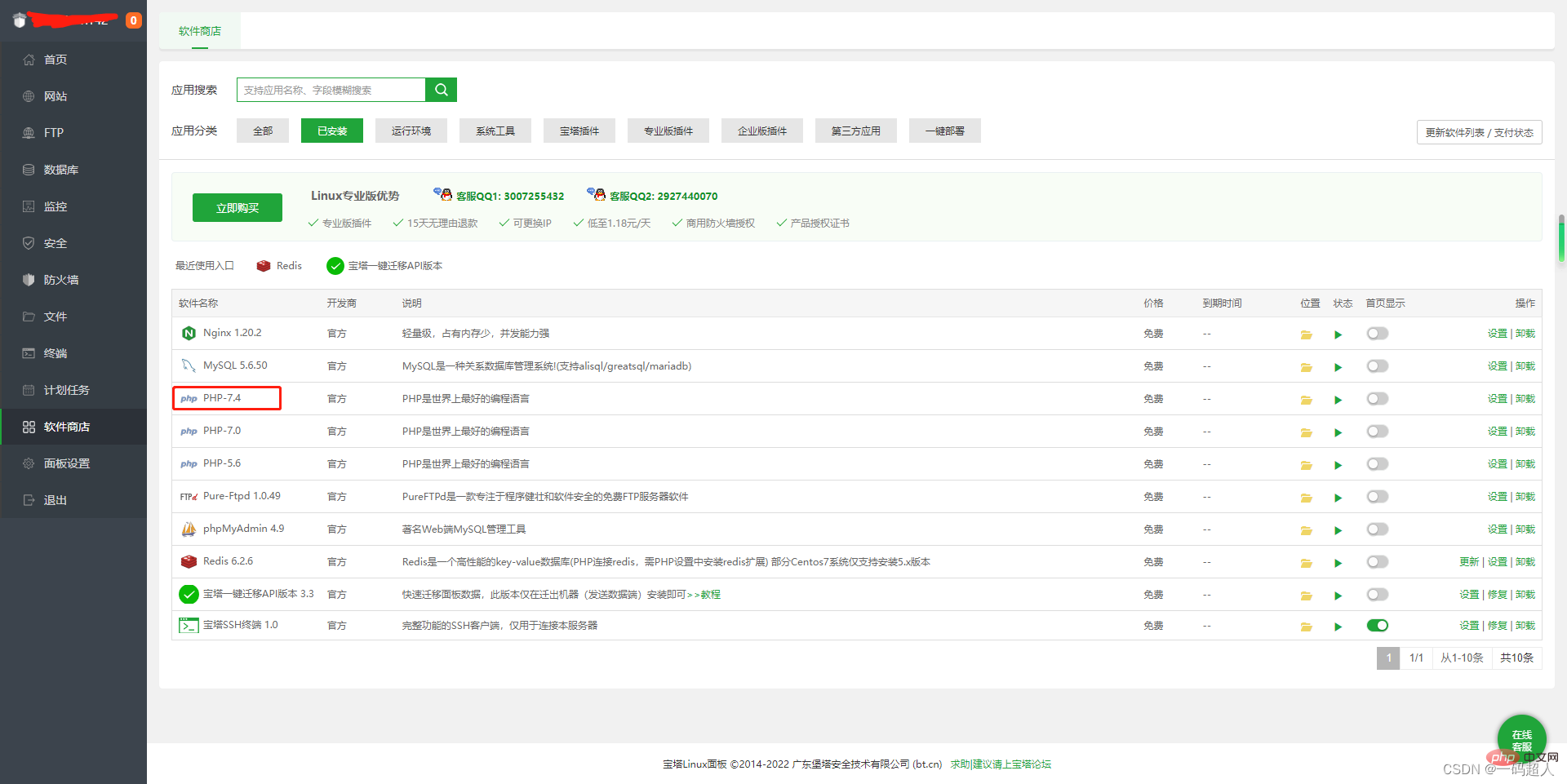
Here we take the development of php7.4 extension as an example.
2. Download the php7.4 liunx version source code
php official website: PHP: Hypertext Preprocessor
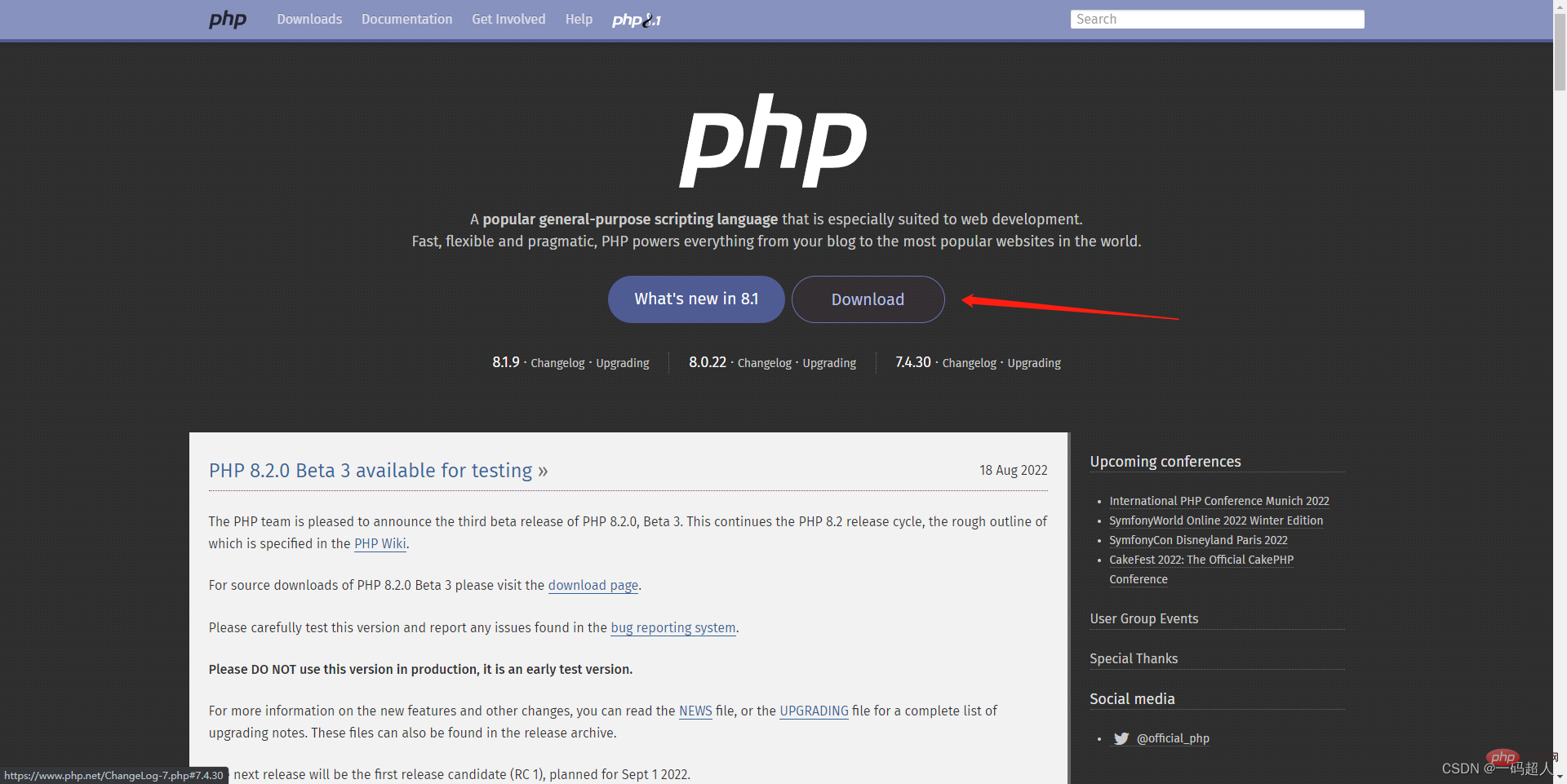
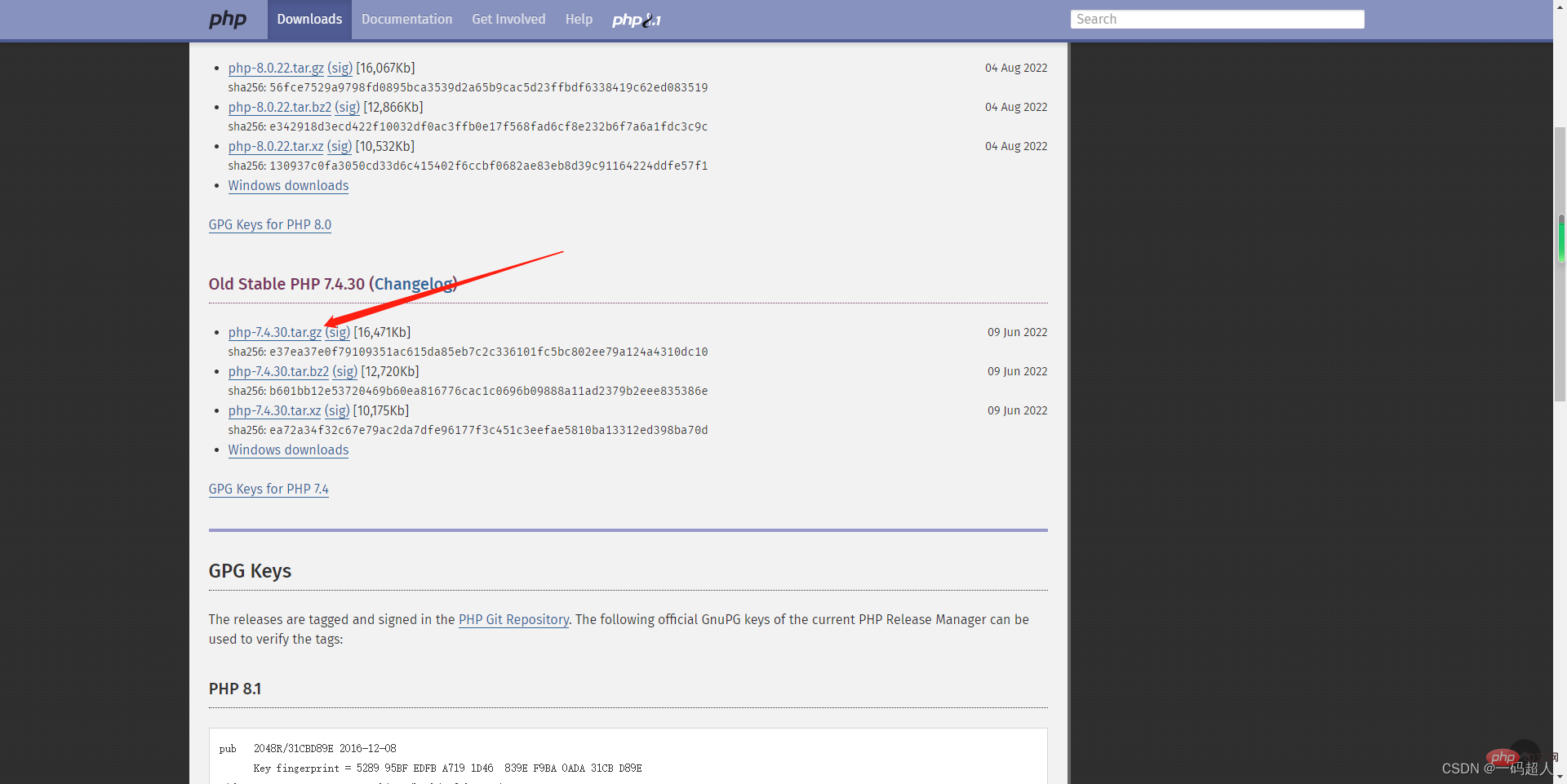
Notice! The source code version must be exactly the same as the PHP version of your environment! ! !
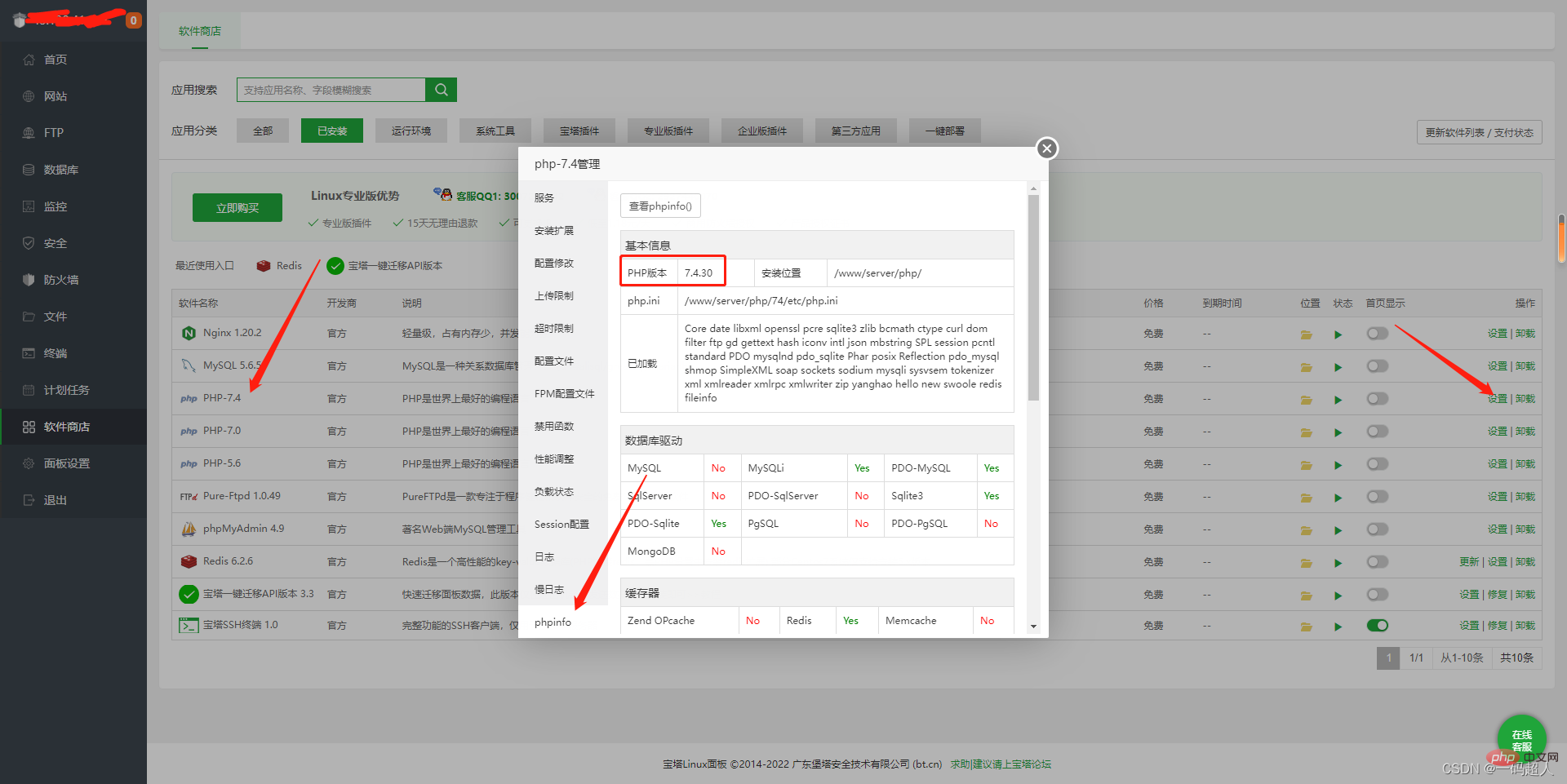
Download completed:
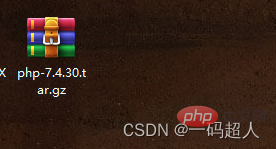
3. Upload the php source code Go to the pagoda
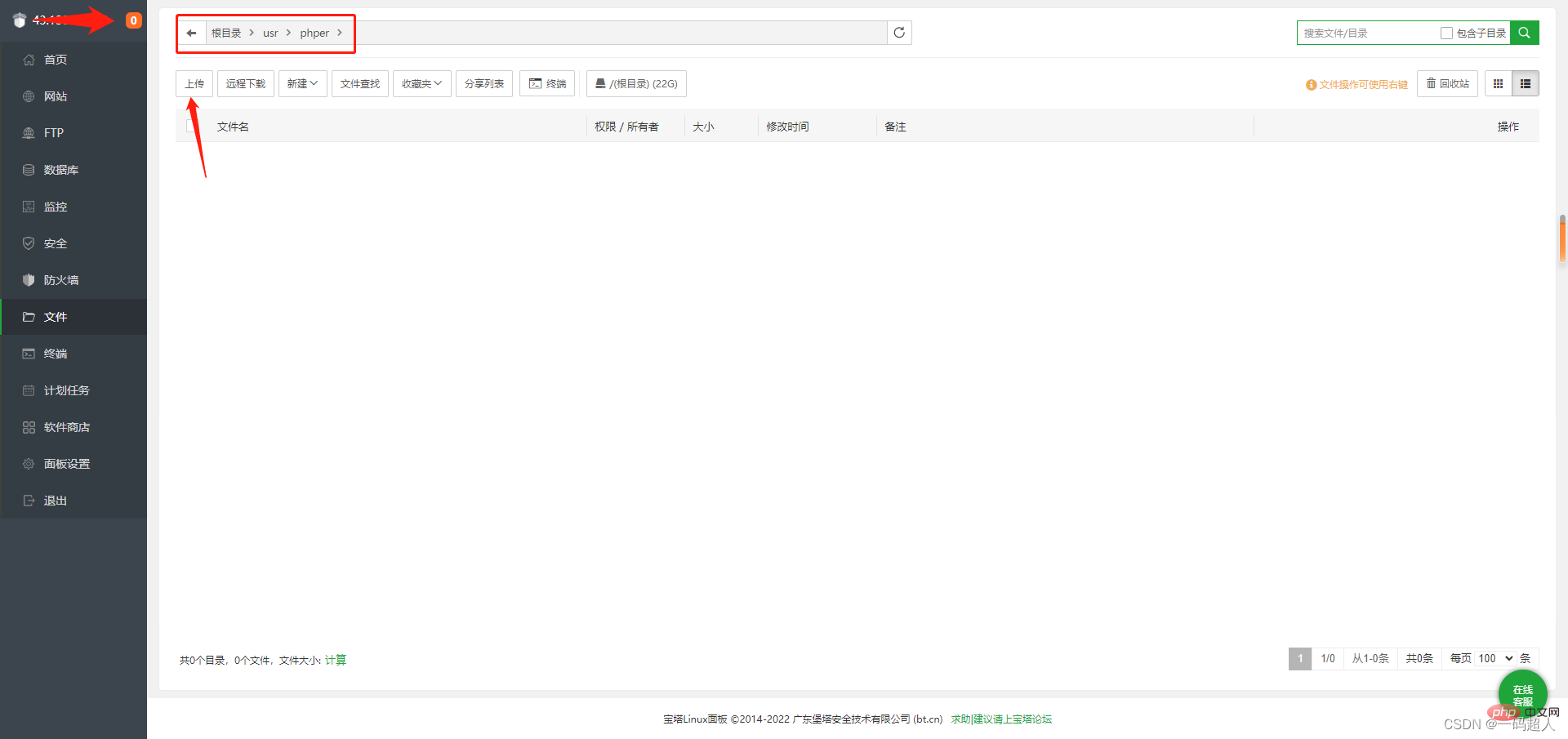
/usr/phper
Create a phper folder under usr, and then upload the source code compression package here.
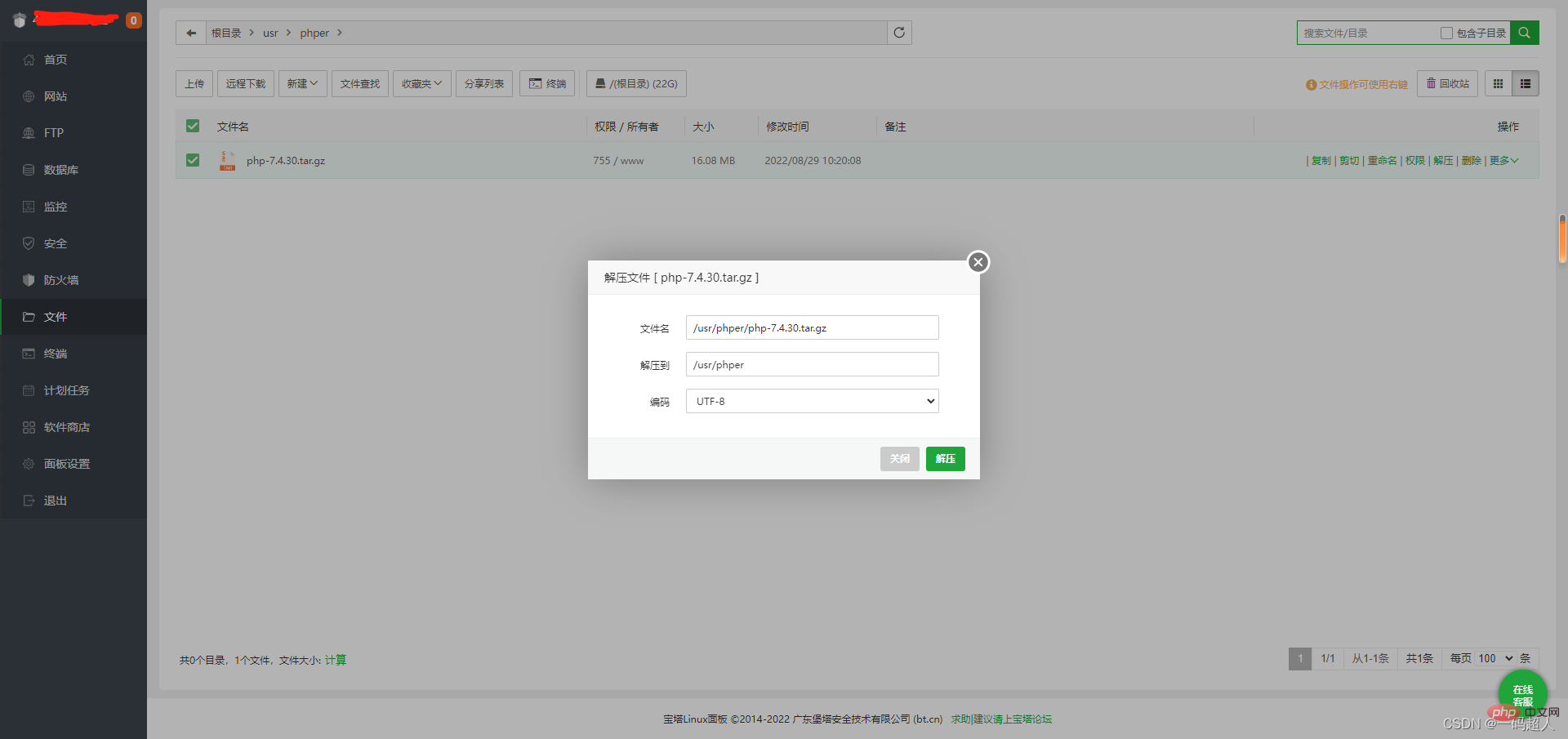
Unzip the compressed package
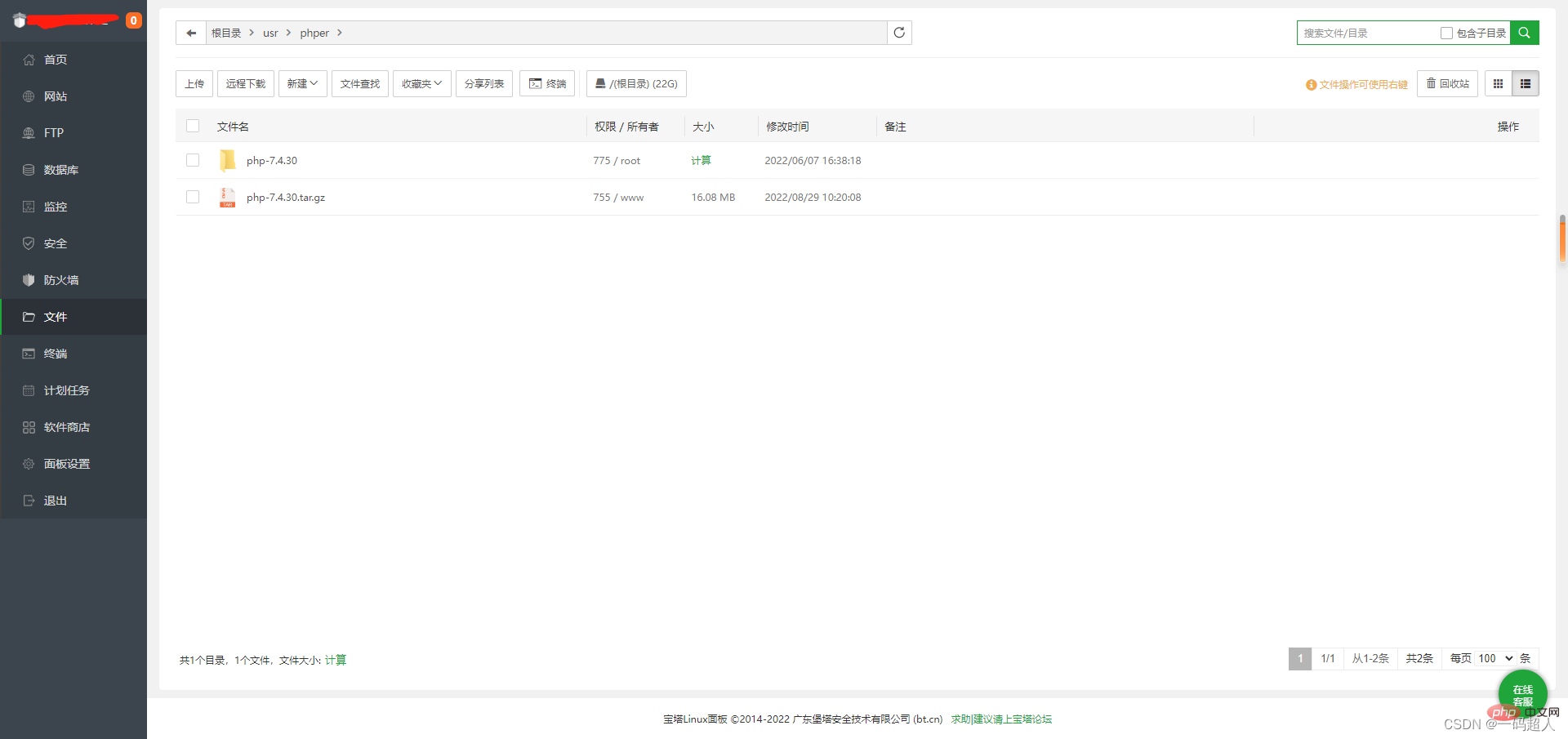
## 4. Create an extension of our own
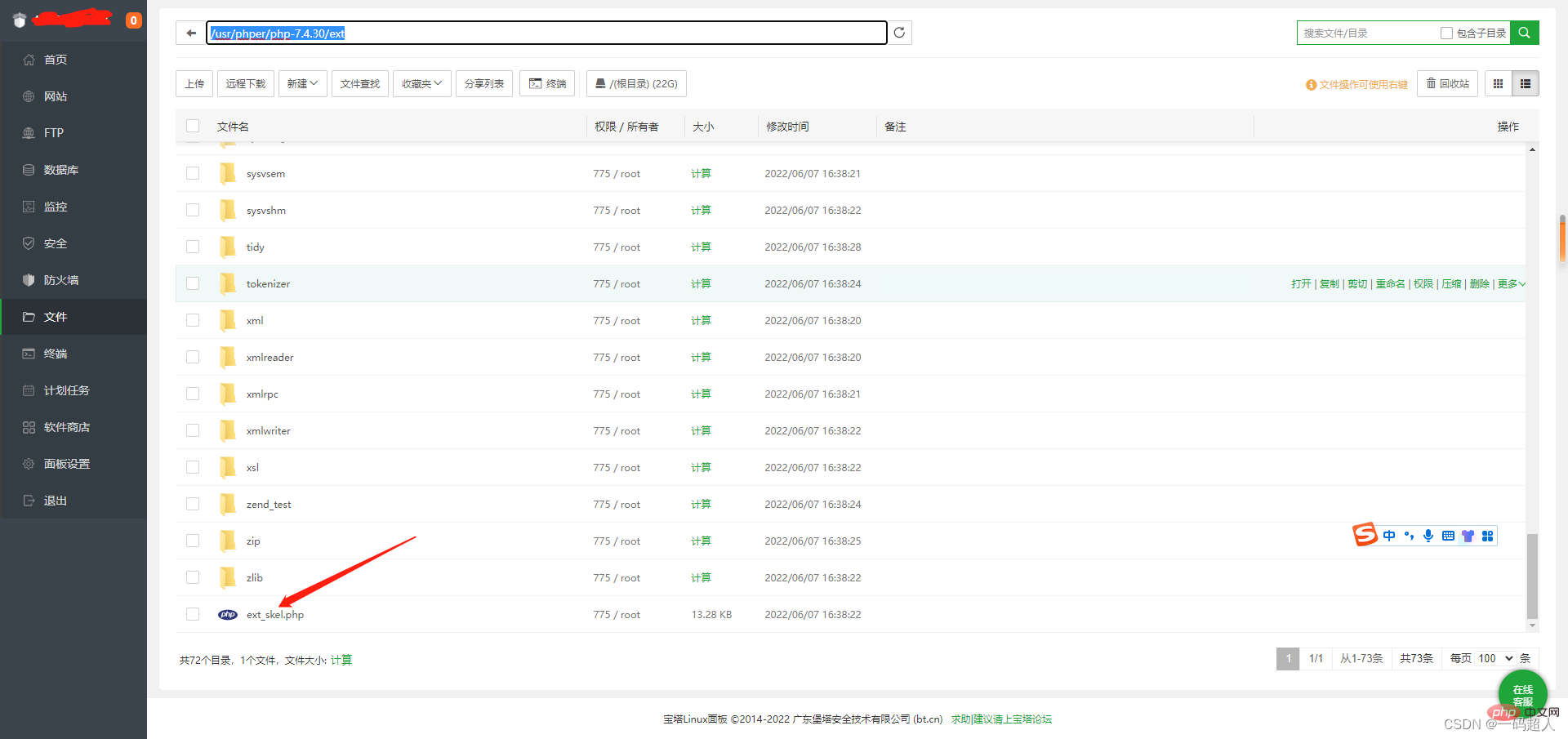
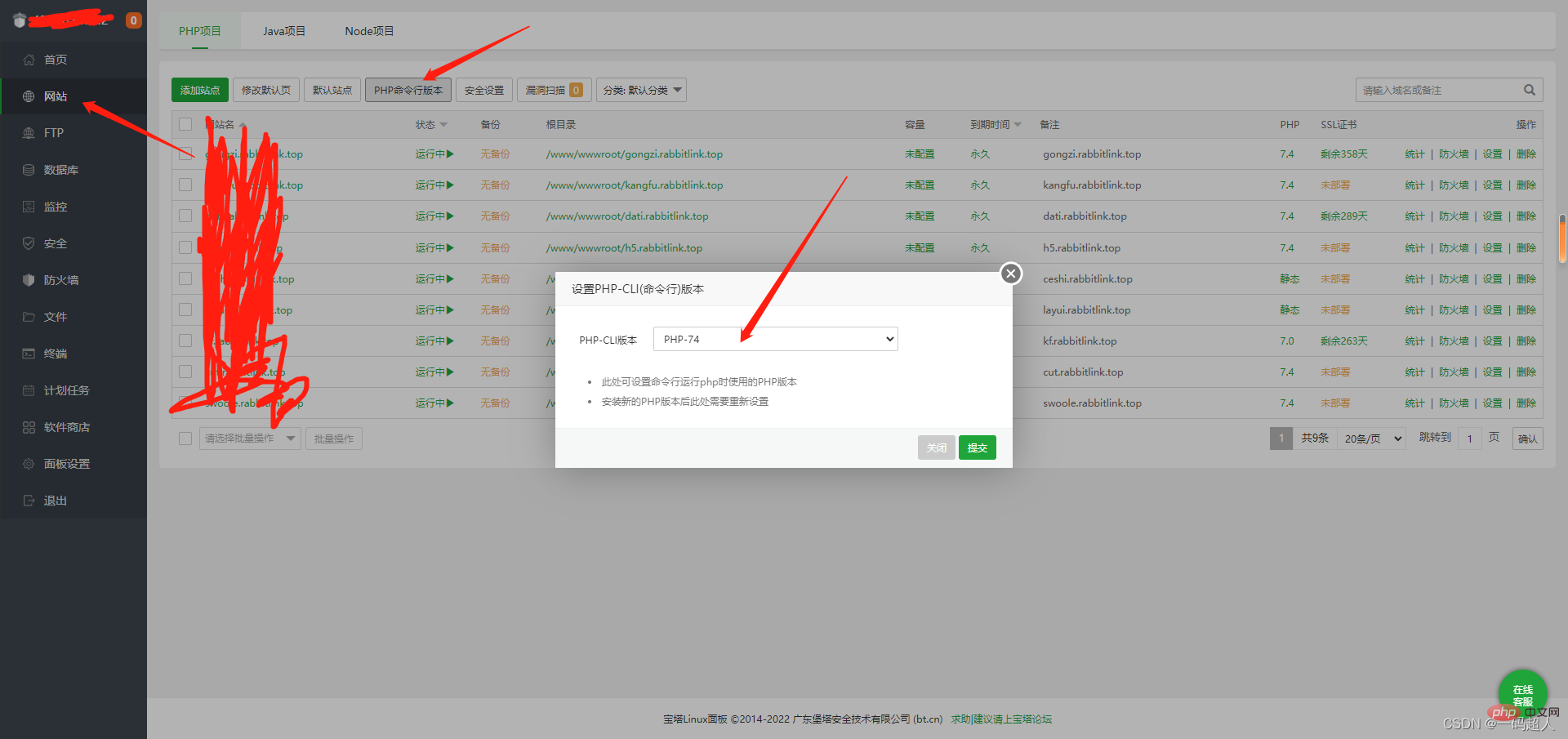
# Pay attention to setting the command line version, because the subsequent php commands must be of the same version!
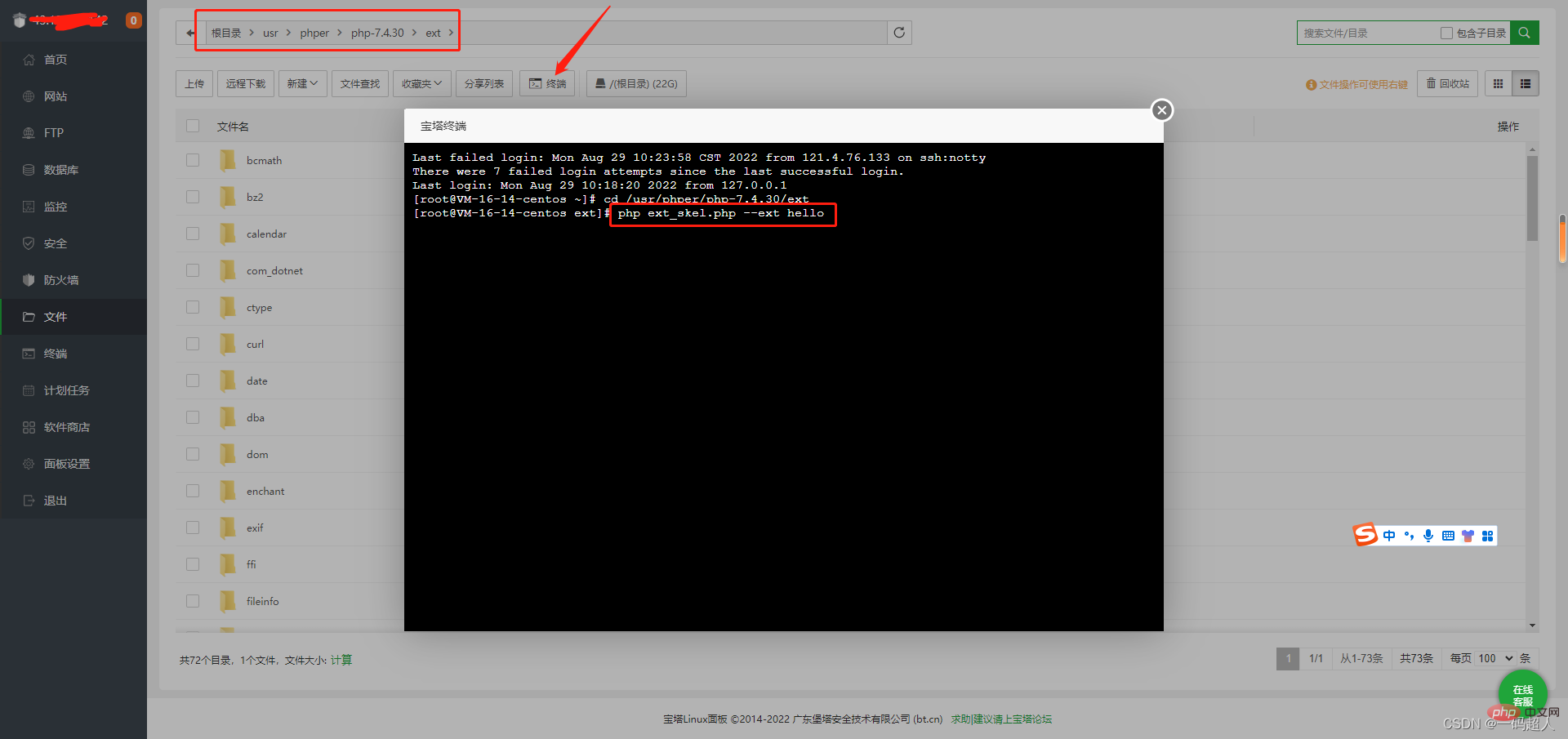
在刚刚的目录下,点击终端,输入创建扩展命令。
php ext_skel.php --ext 扩展名称
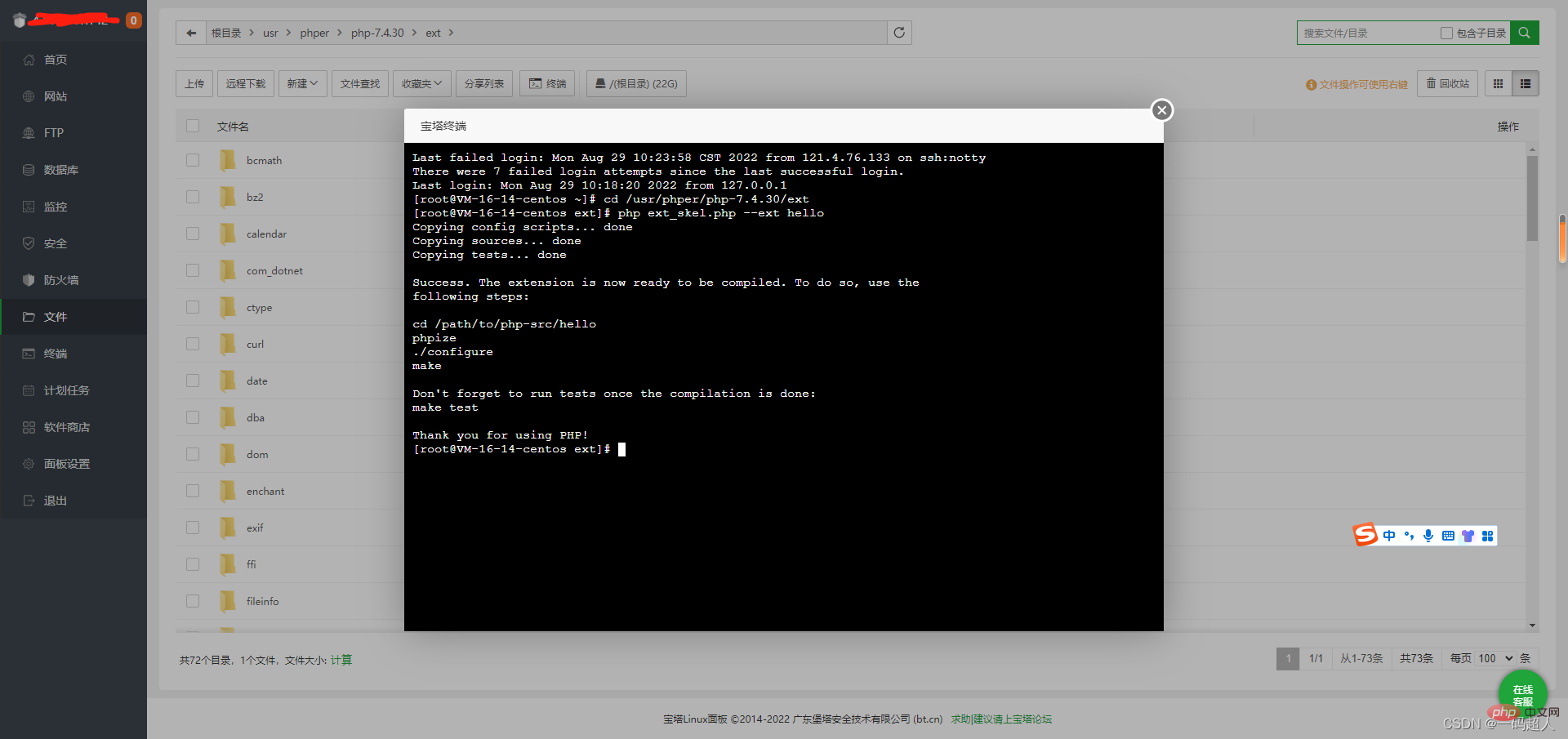
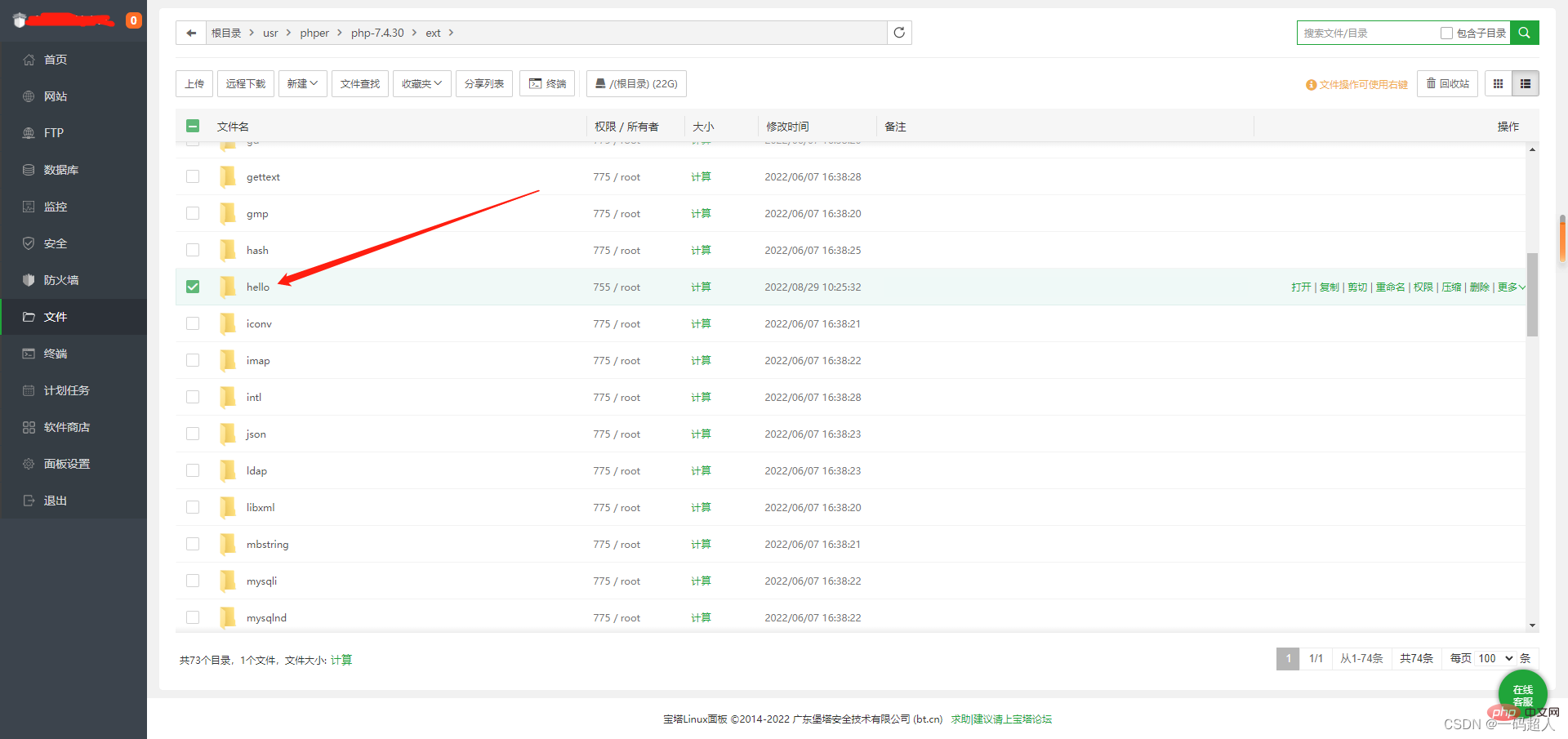
这里就多出了一个新的扩展源码文件。
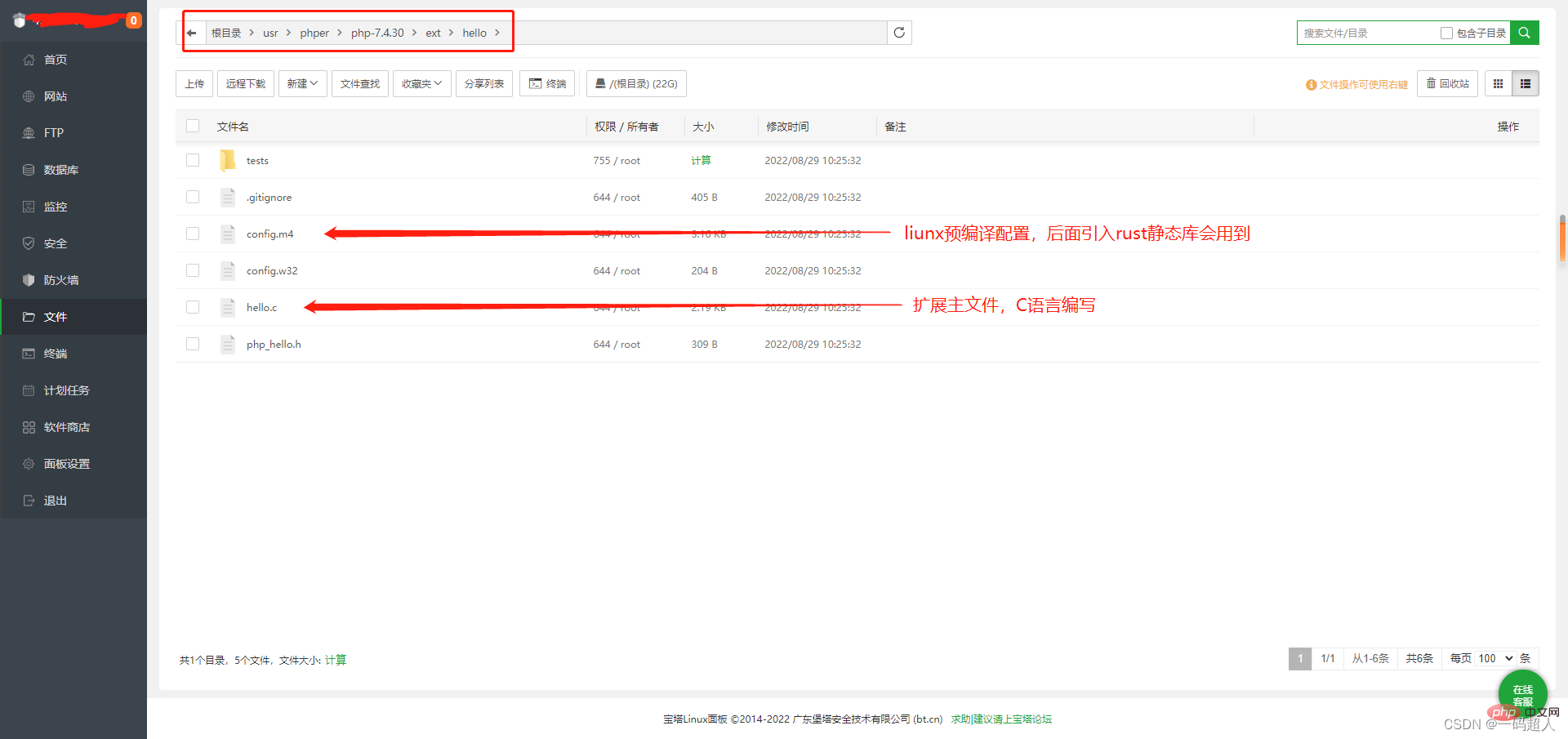

在该目录下点击终端,输入:
phpize
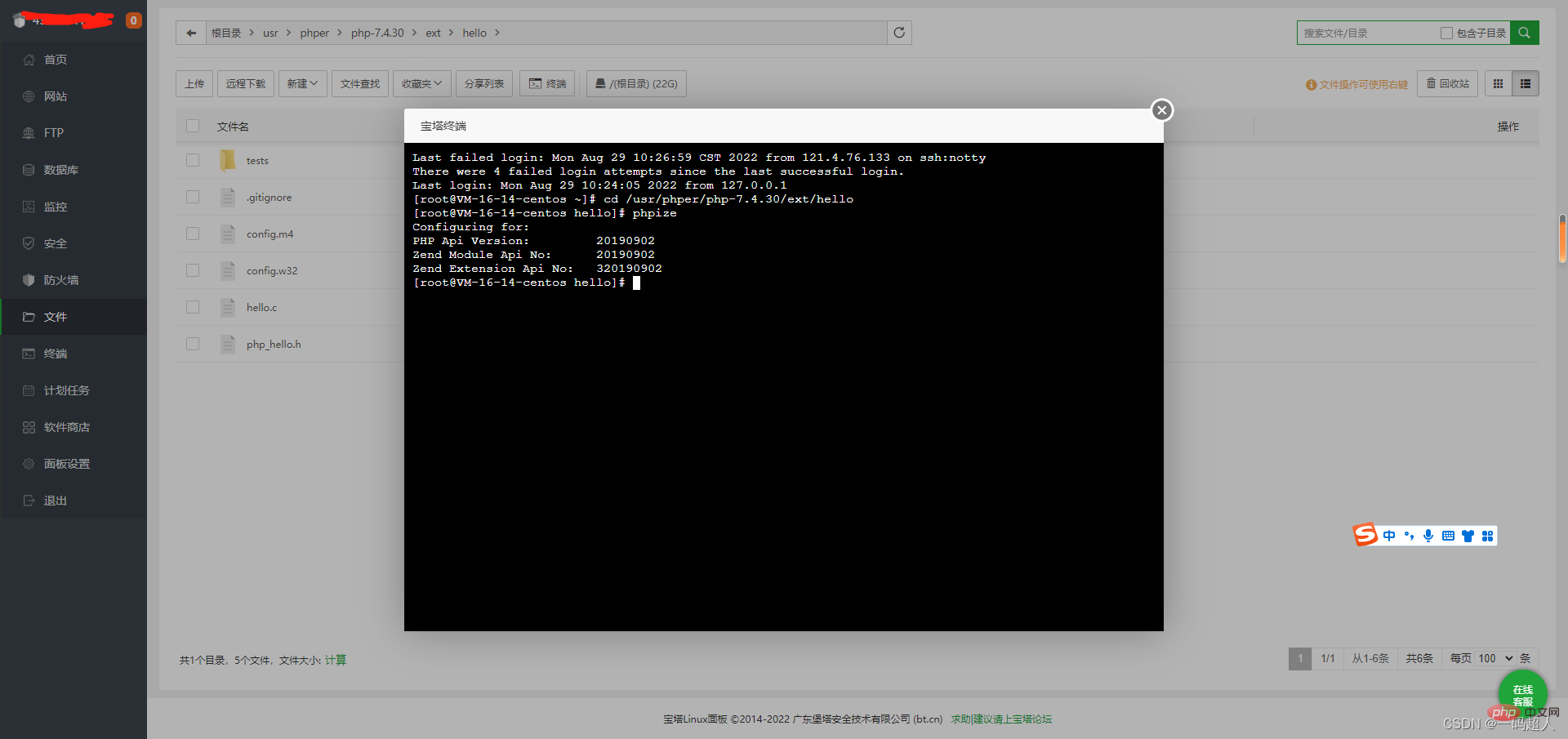
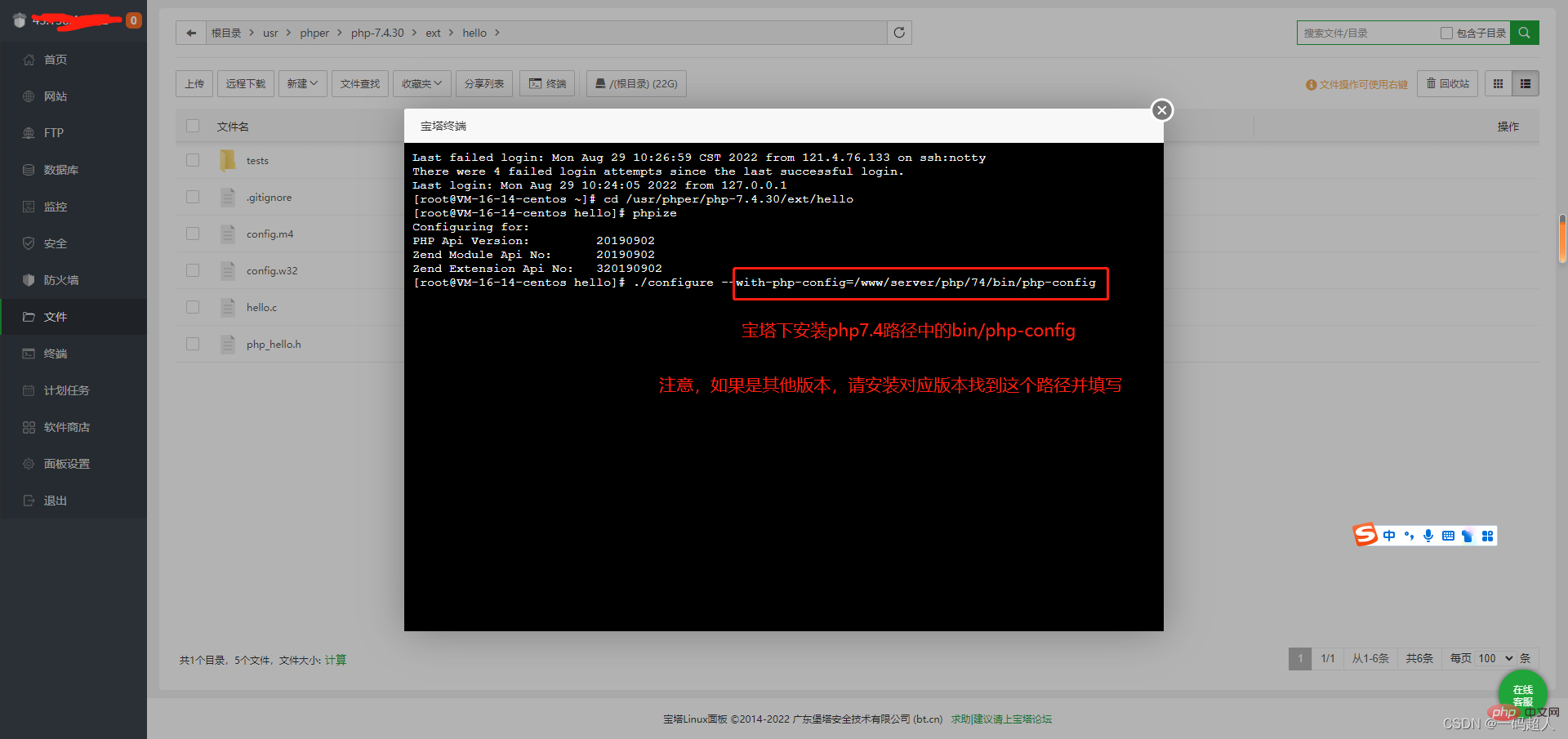
接着输入:
./configure --with-php-config=/www/server/php/74/bin/php-config
注意这个参数php路径,如果是别的版本,请自行在宝塔里安装找到对应版本路径,它们都是放一起的。
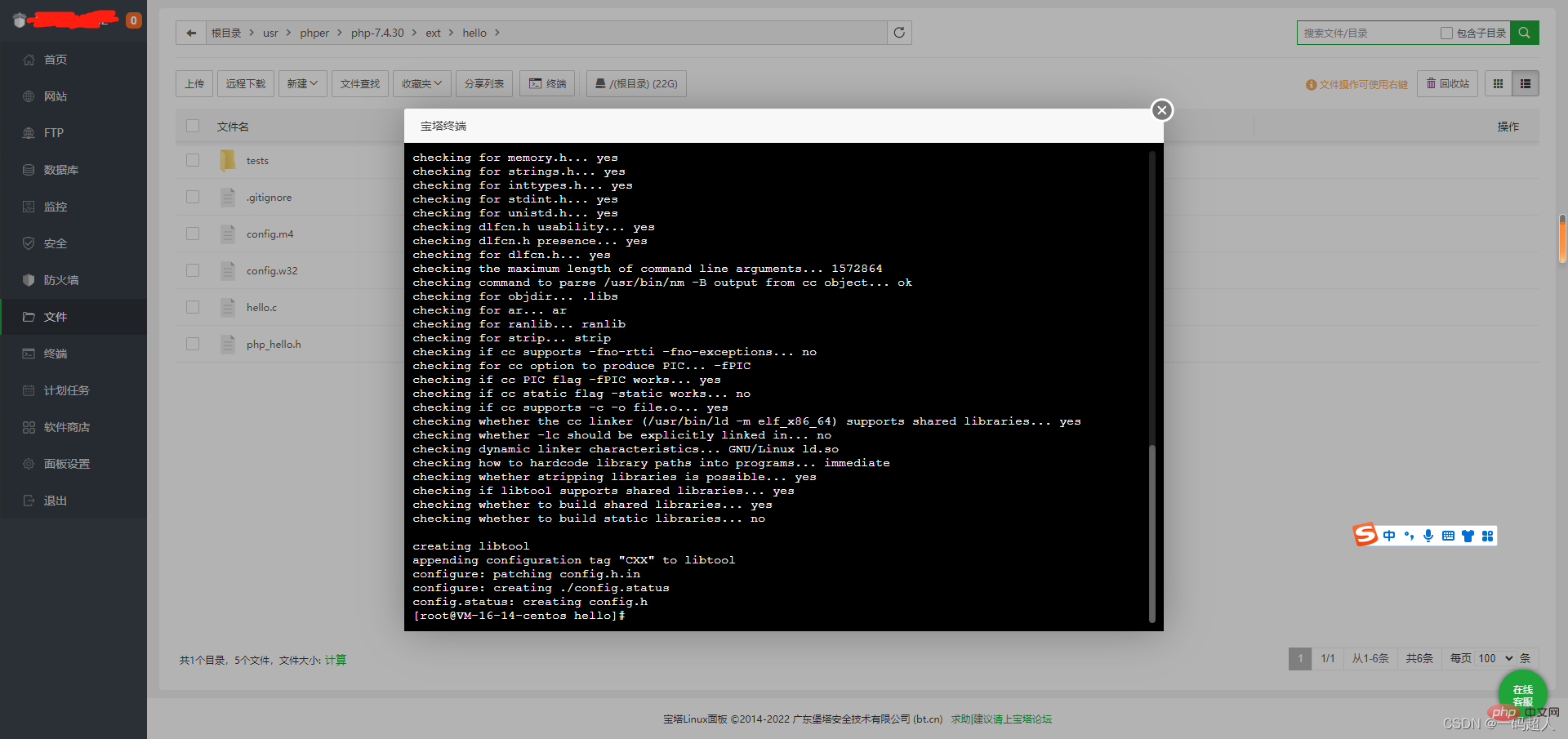
回车开始进行检查了
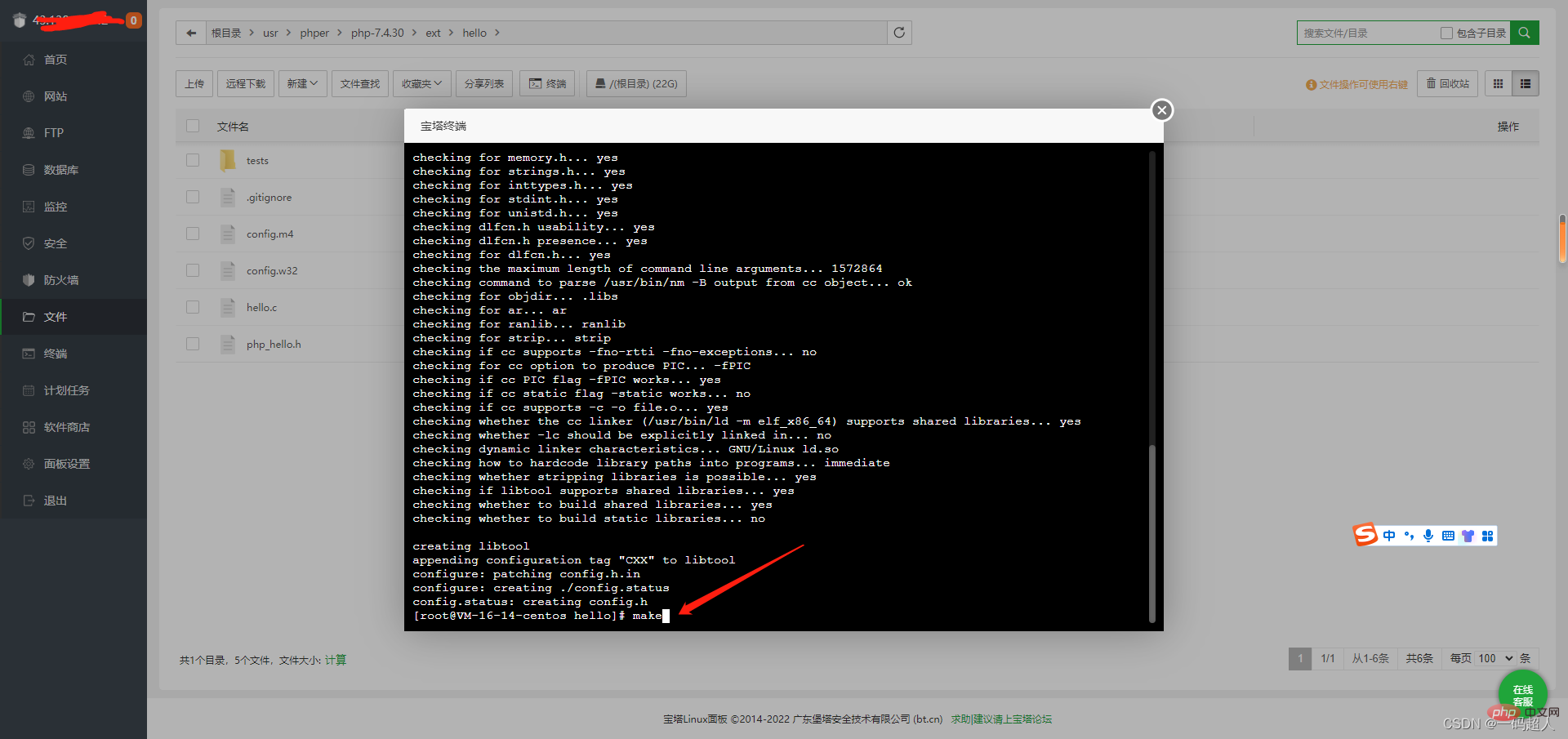
最后输入:
make
进行编译。
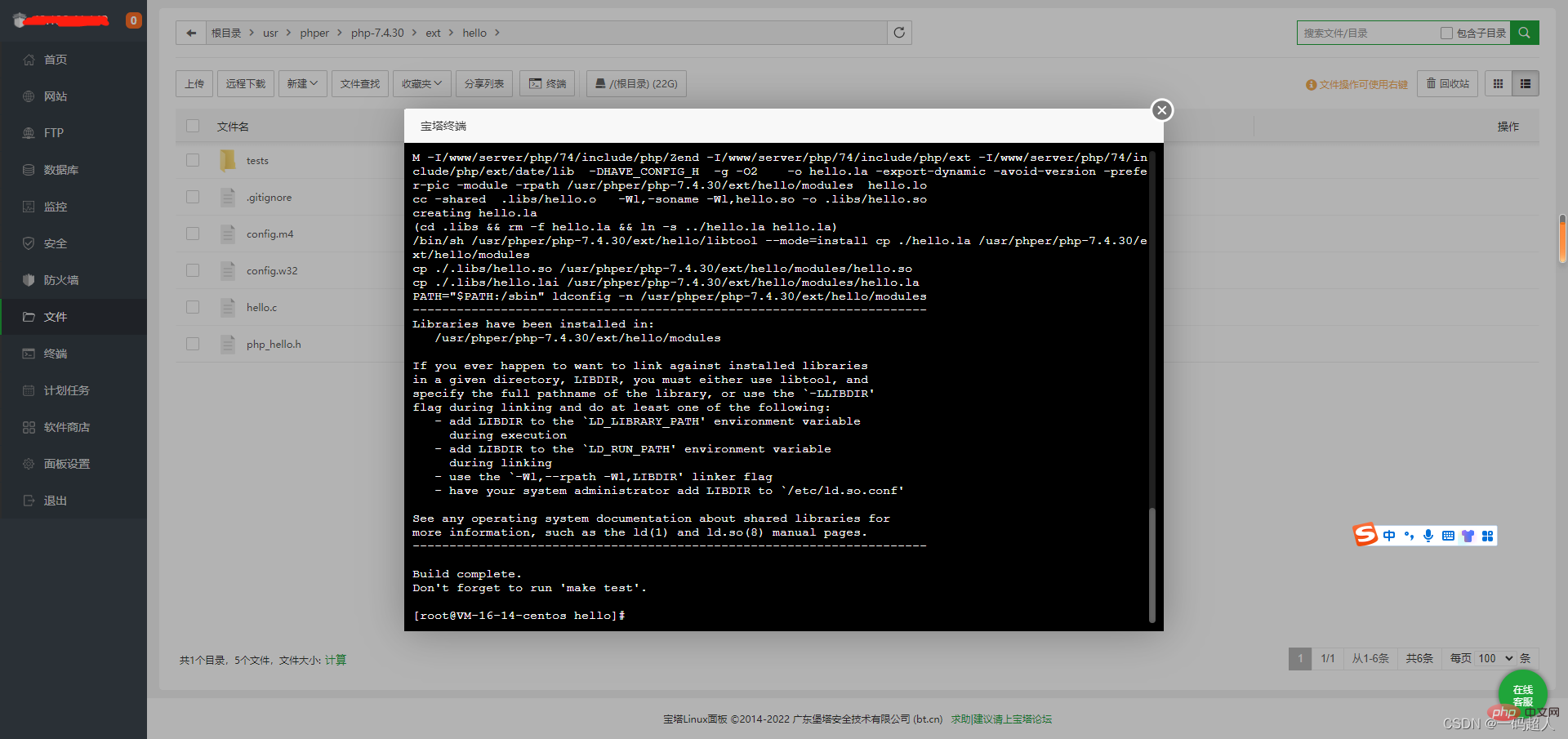
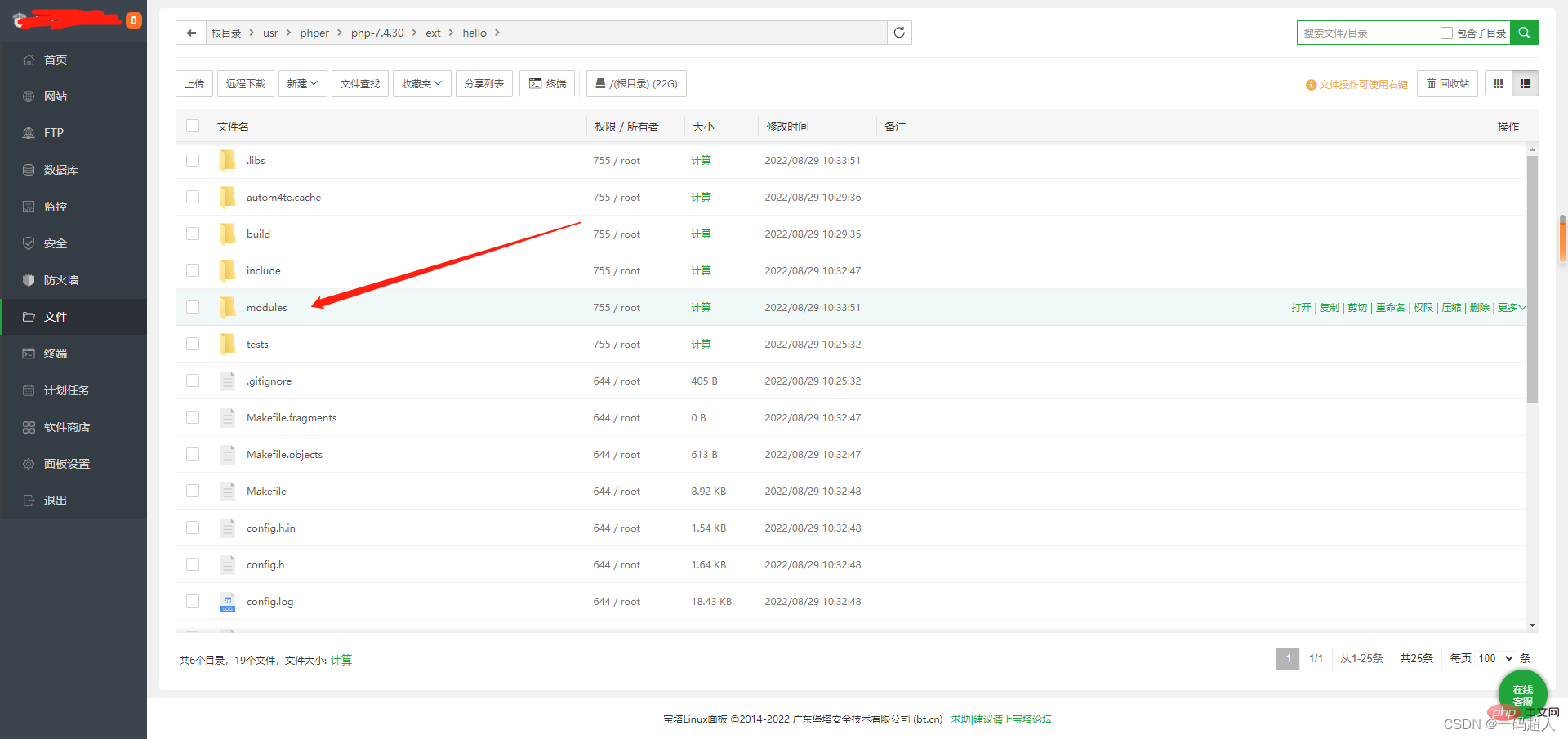
这个目录下便是编译出来的so扩展最终文件了!
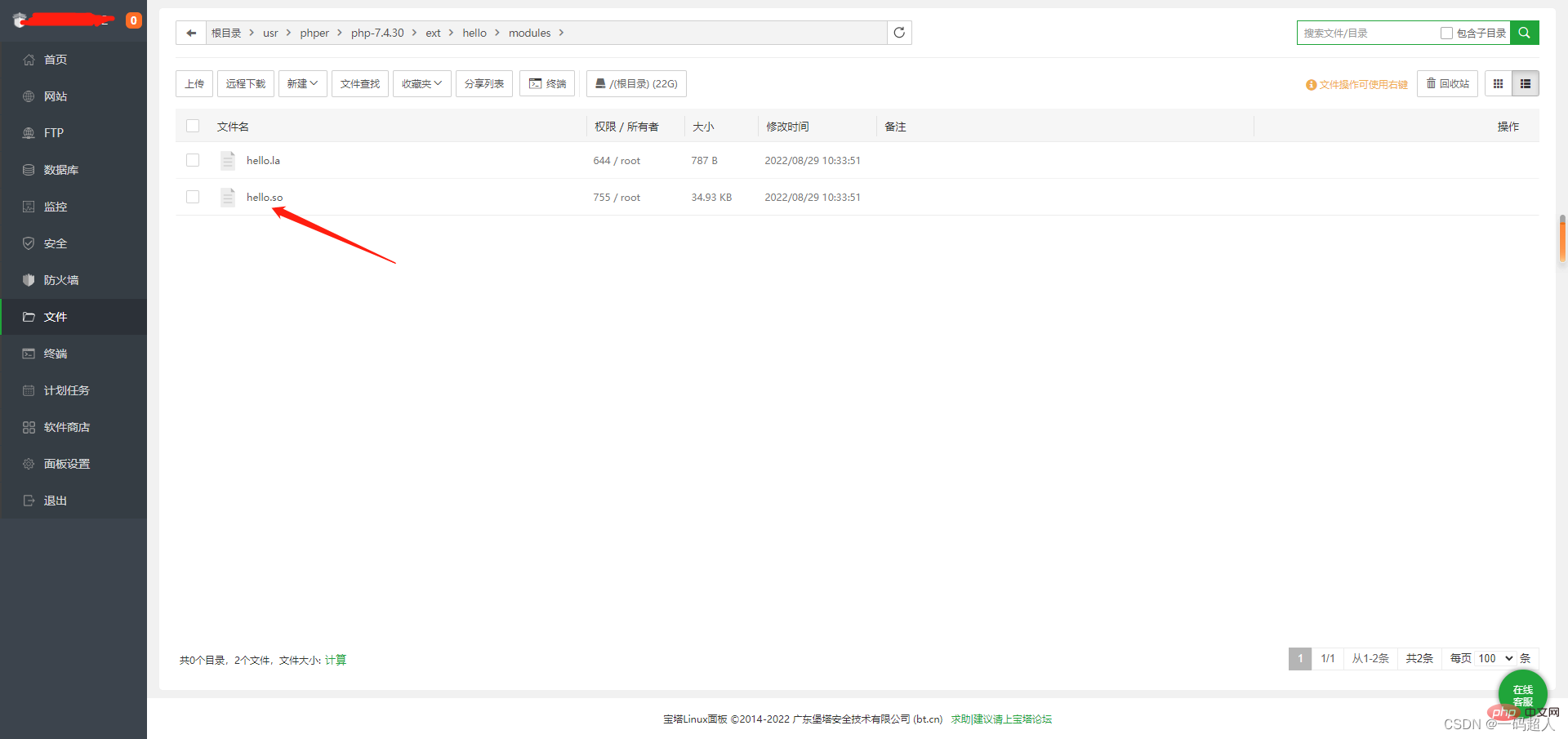
让我们看下默认生成的扩展有哪些功能
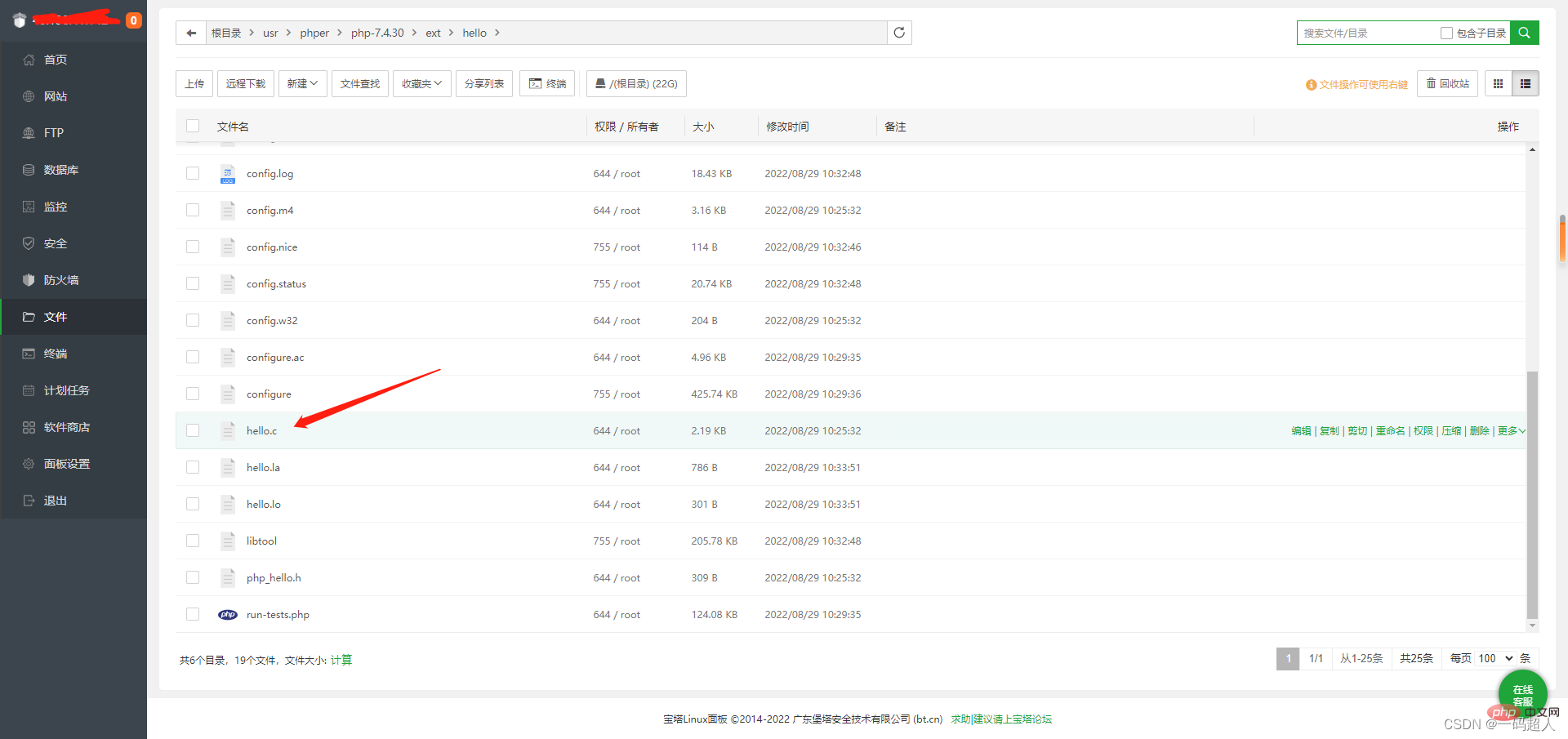
查看主文件【需了解php扩展骨架,这里以它默认给的为例】
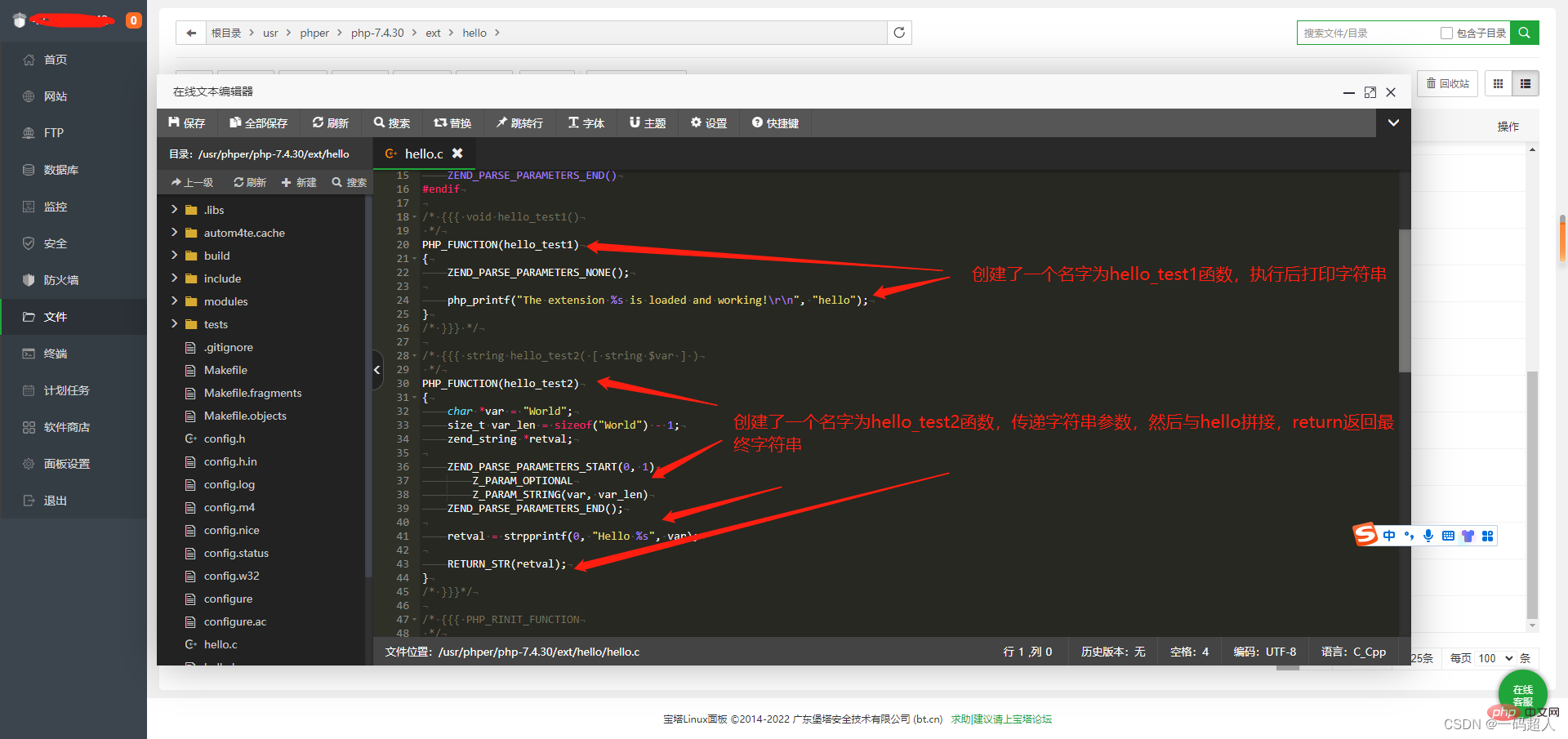
也就是说,刚刚编译出来的扩展,是有这两个函数的,咱们测试一下玩玩。
注意!每次修改主文件,都需要重新按上述命令跑一遍,否则不生效,很奇怪!
phpize ./configure --with-php-config=/www/server/php/74/bin/php-config make
5、使用扩展
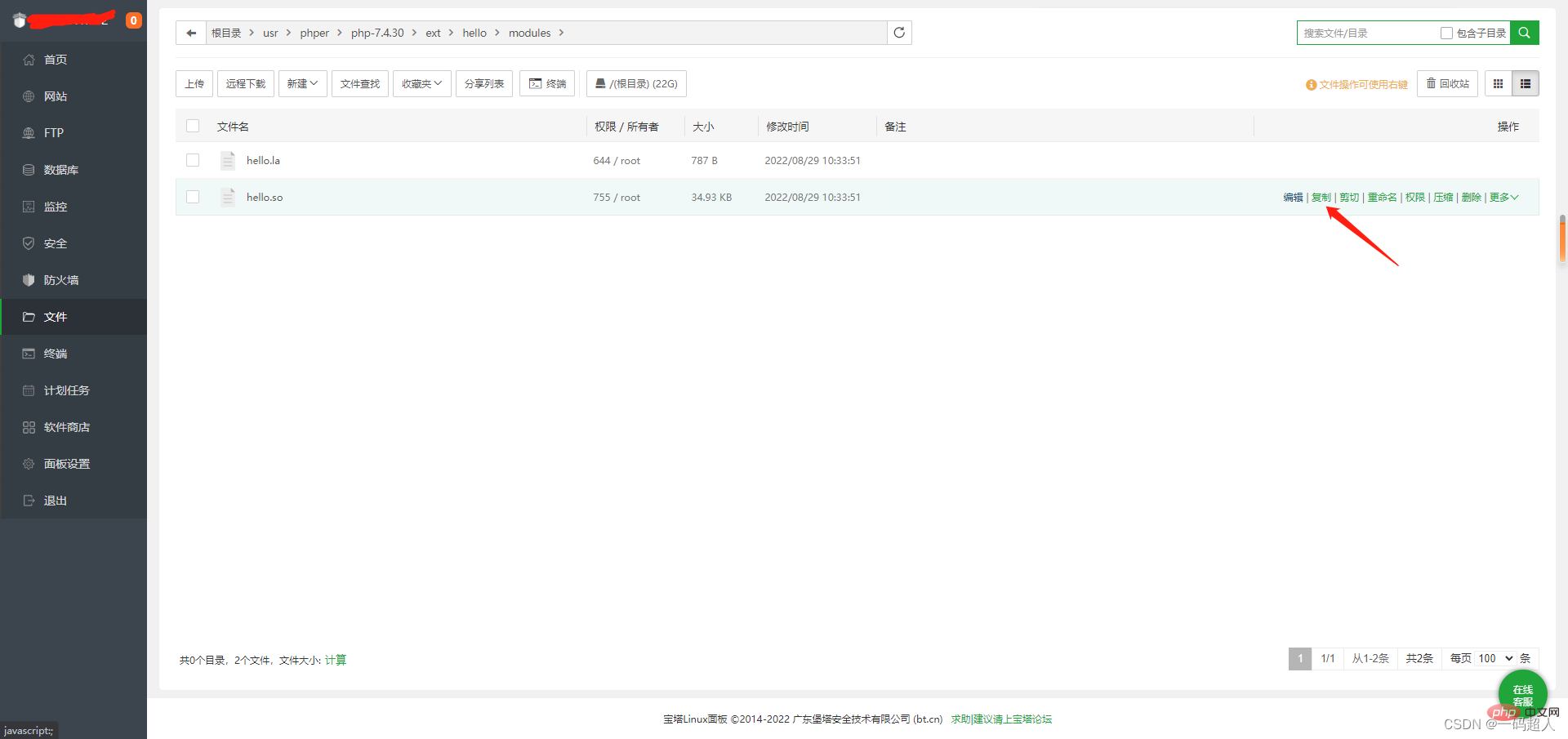
复制刚刚生成的扩展文件到我们php环境的扩展里
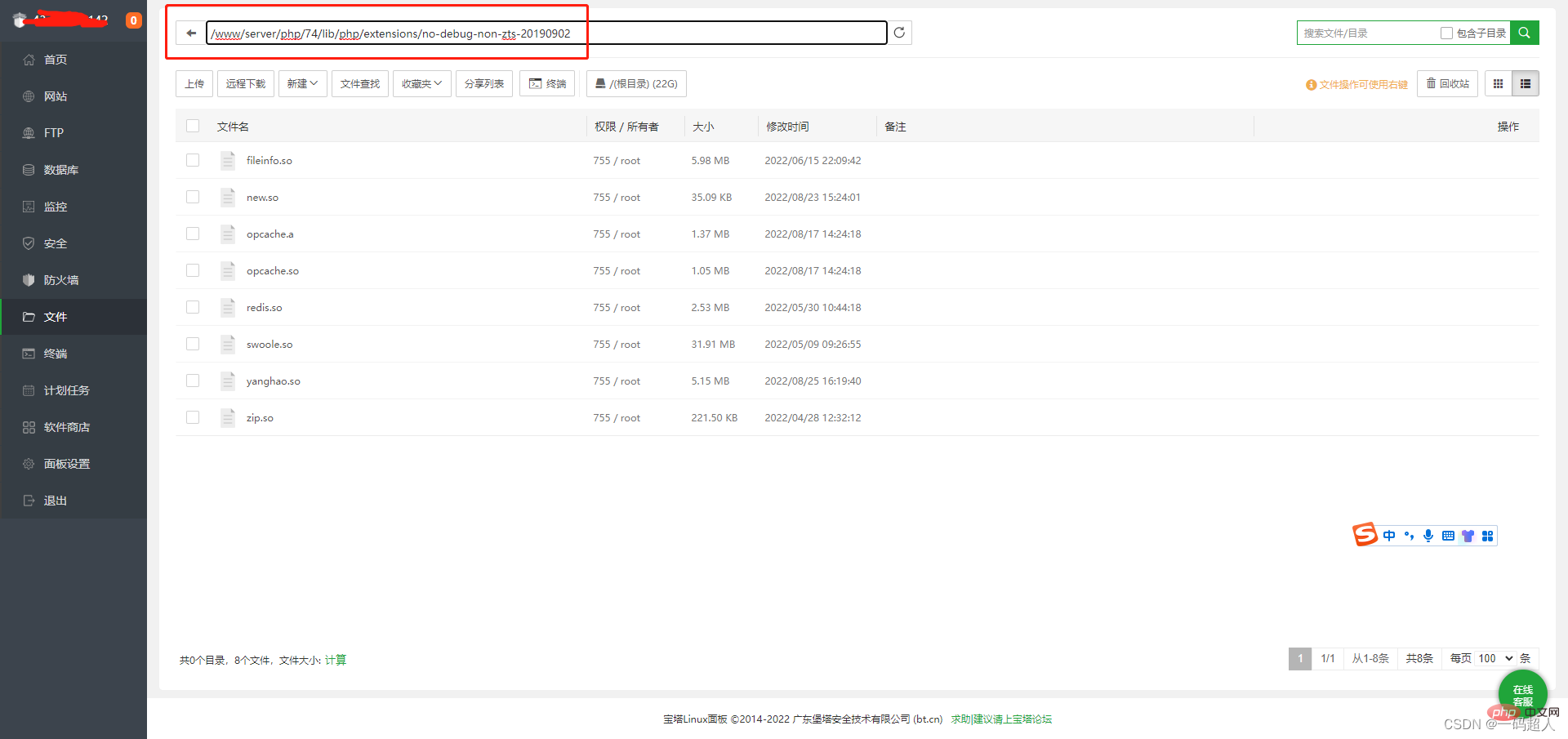
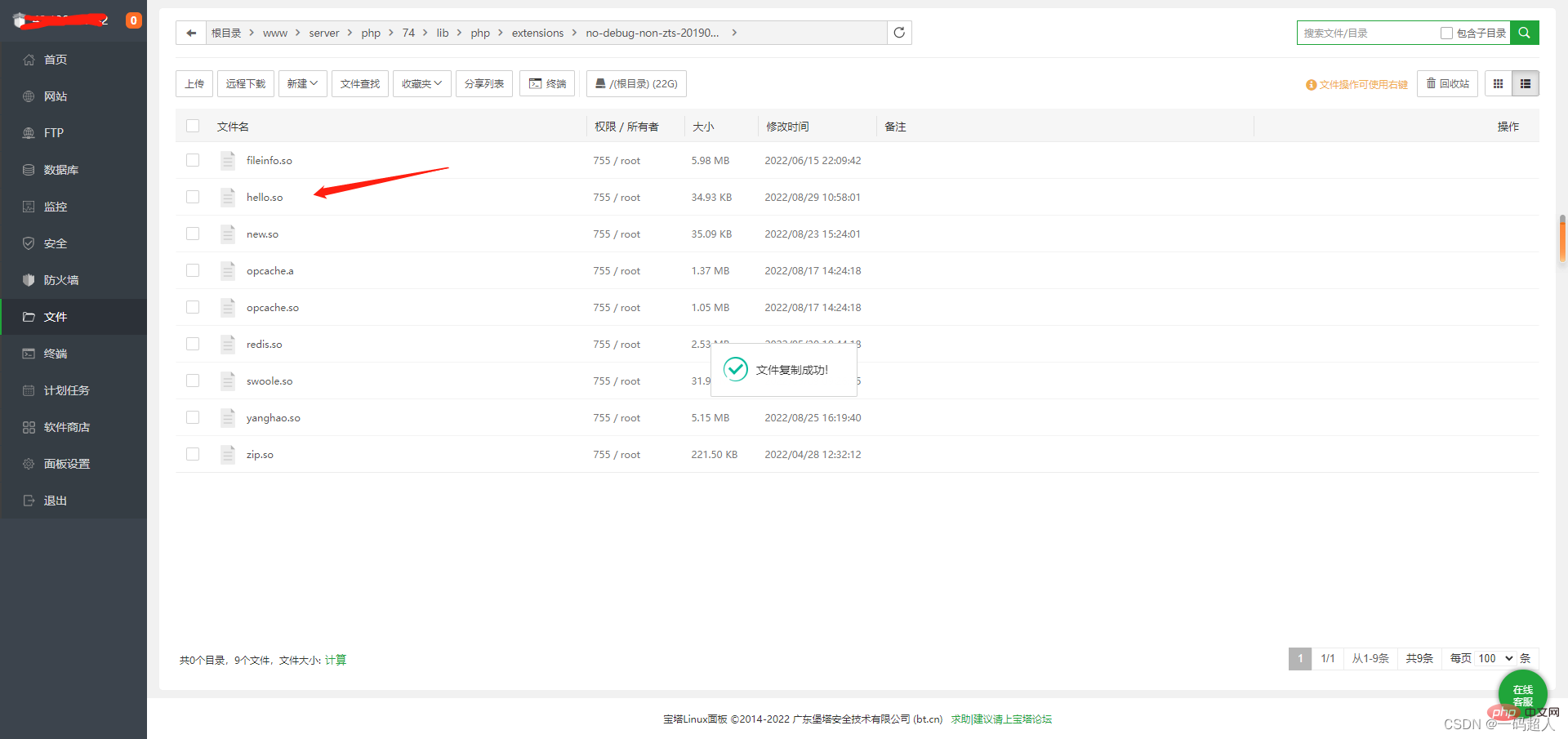
配置php.ini加载hello.so扩展
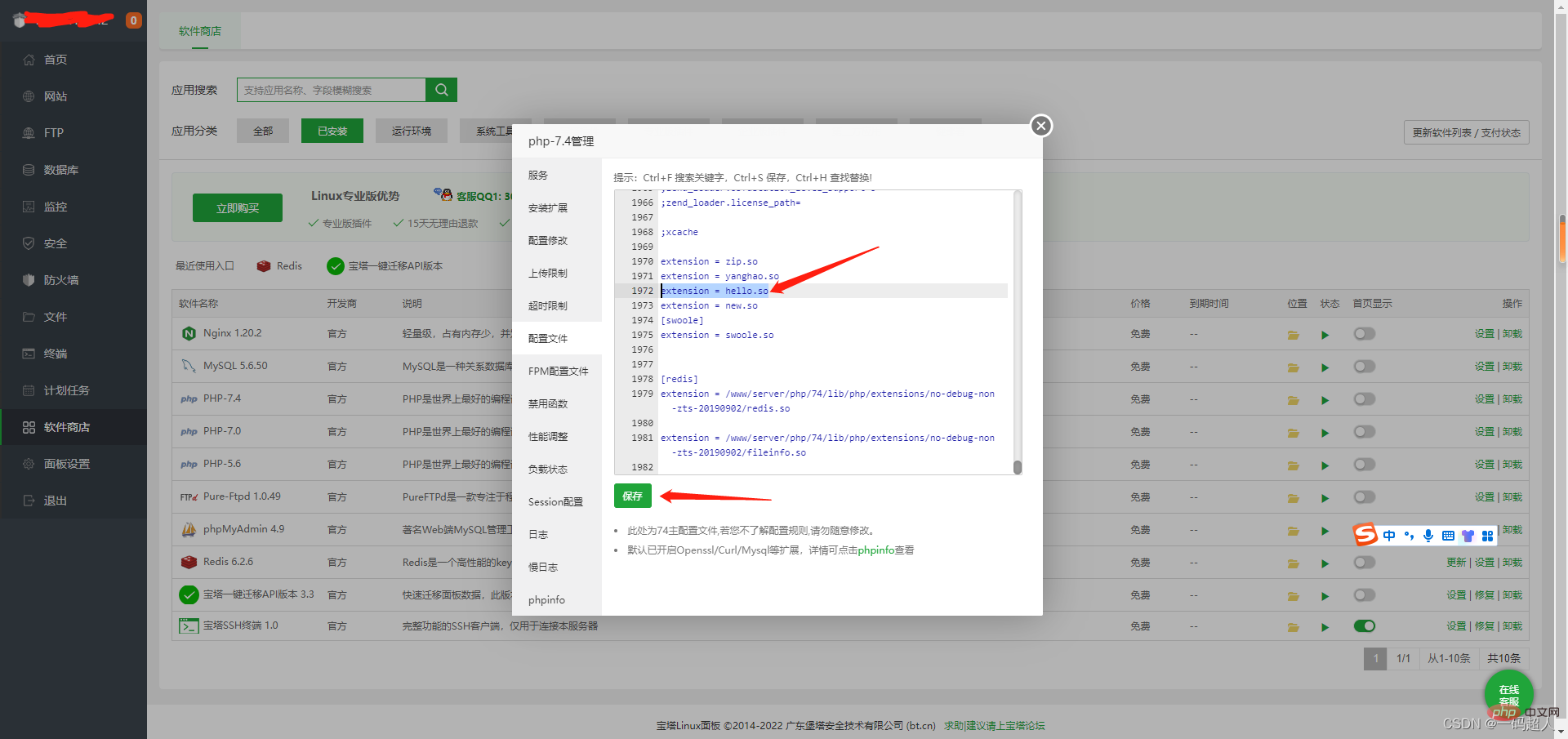
extension = hello.so
保存后记得重新启动下php,否则不生效的!
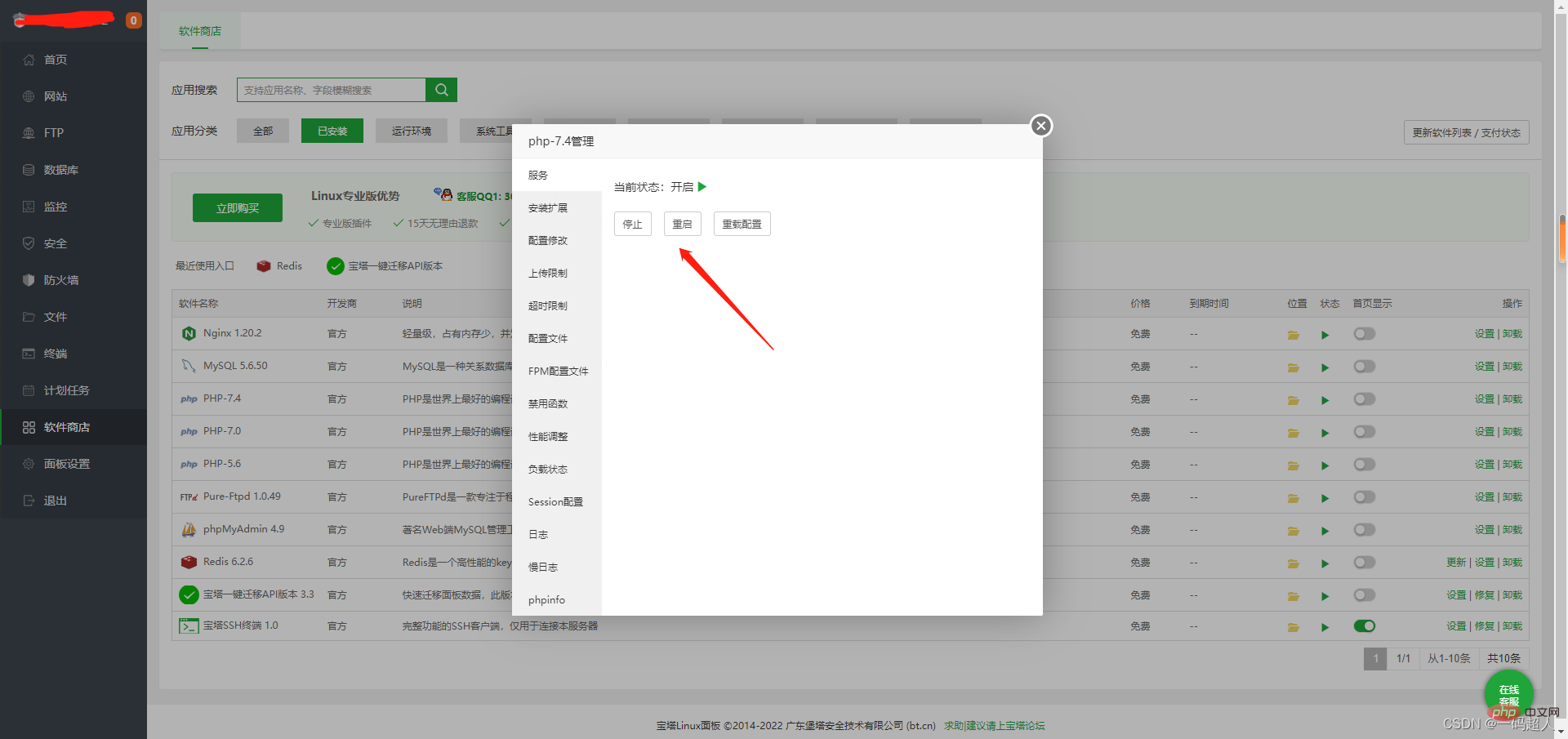
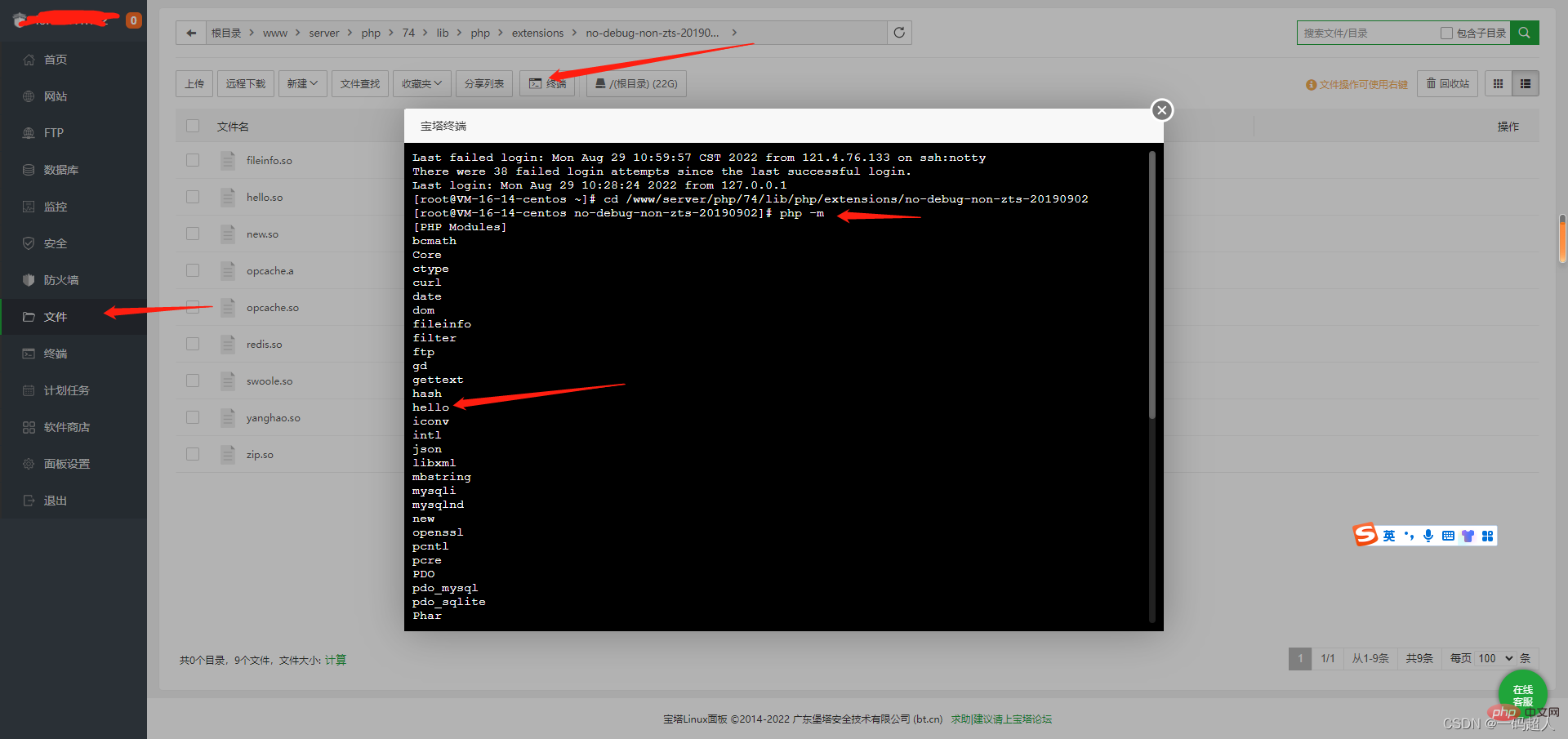
在文件管理中点击终端,输入:
php -m
可以看到我们的扩展在列表中了。
创建一个站点,测试下扩展中两个函数。
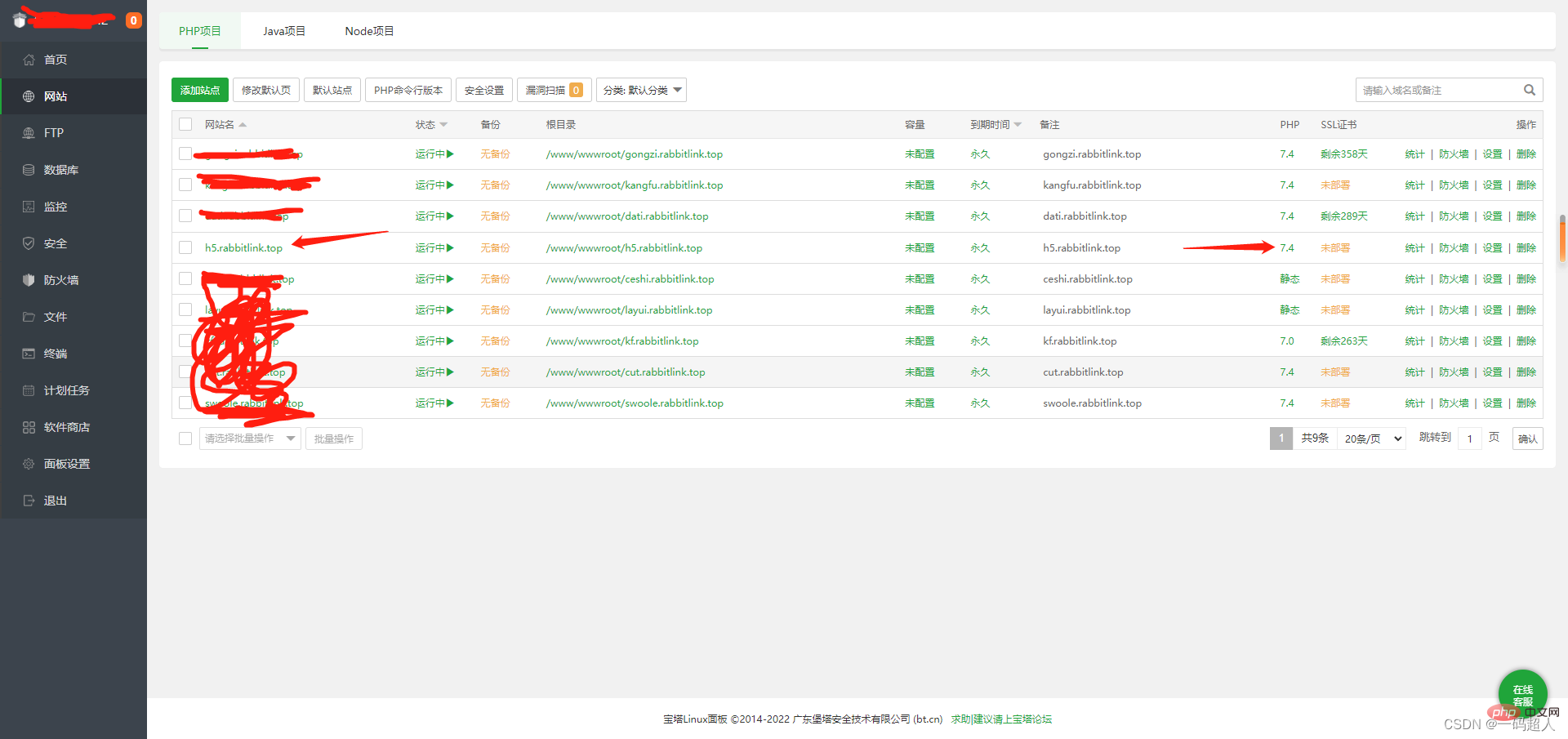
看好,php版本是7.4
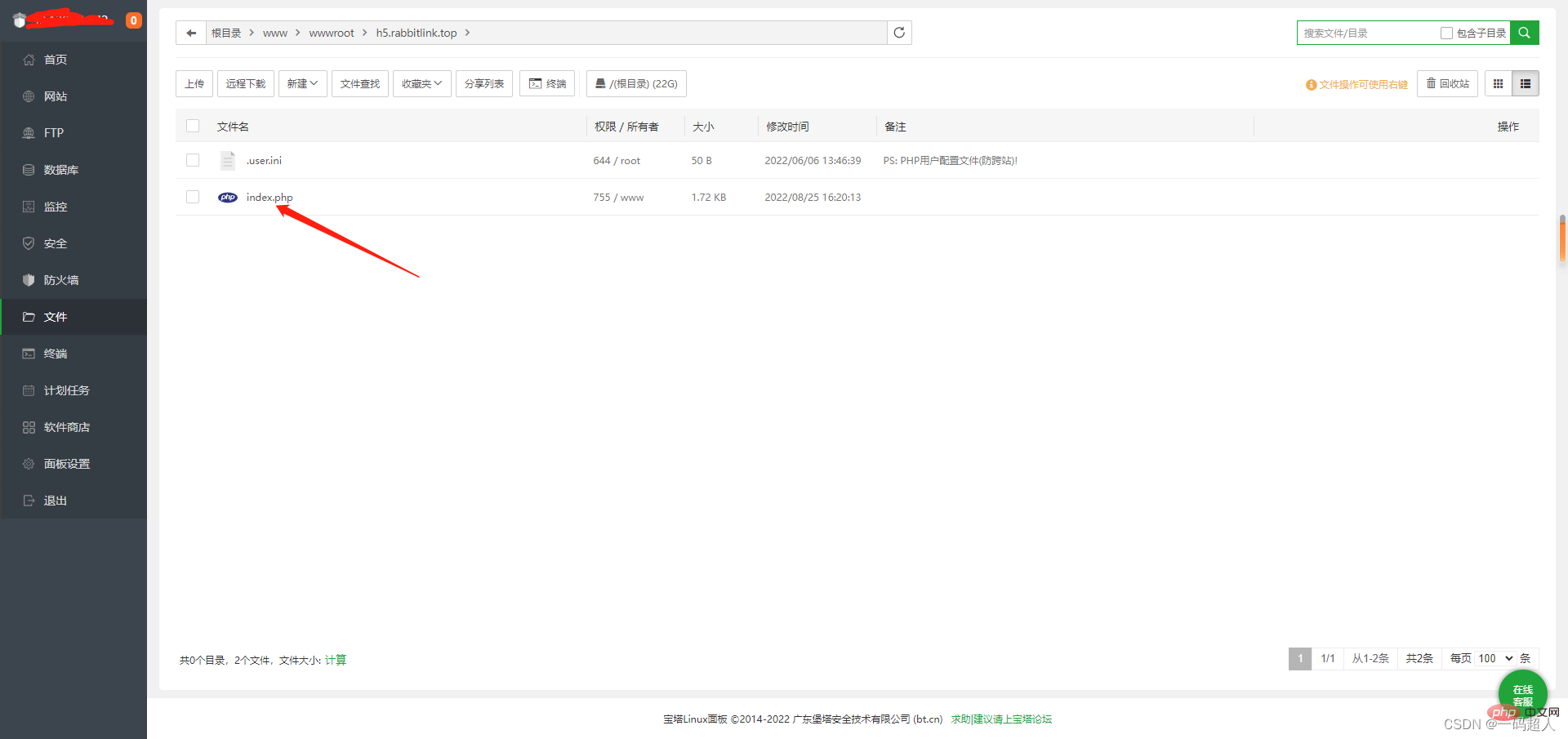
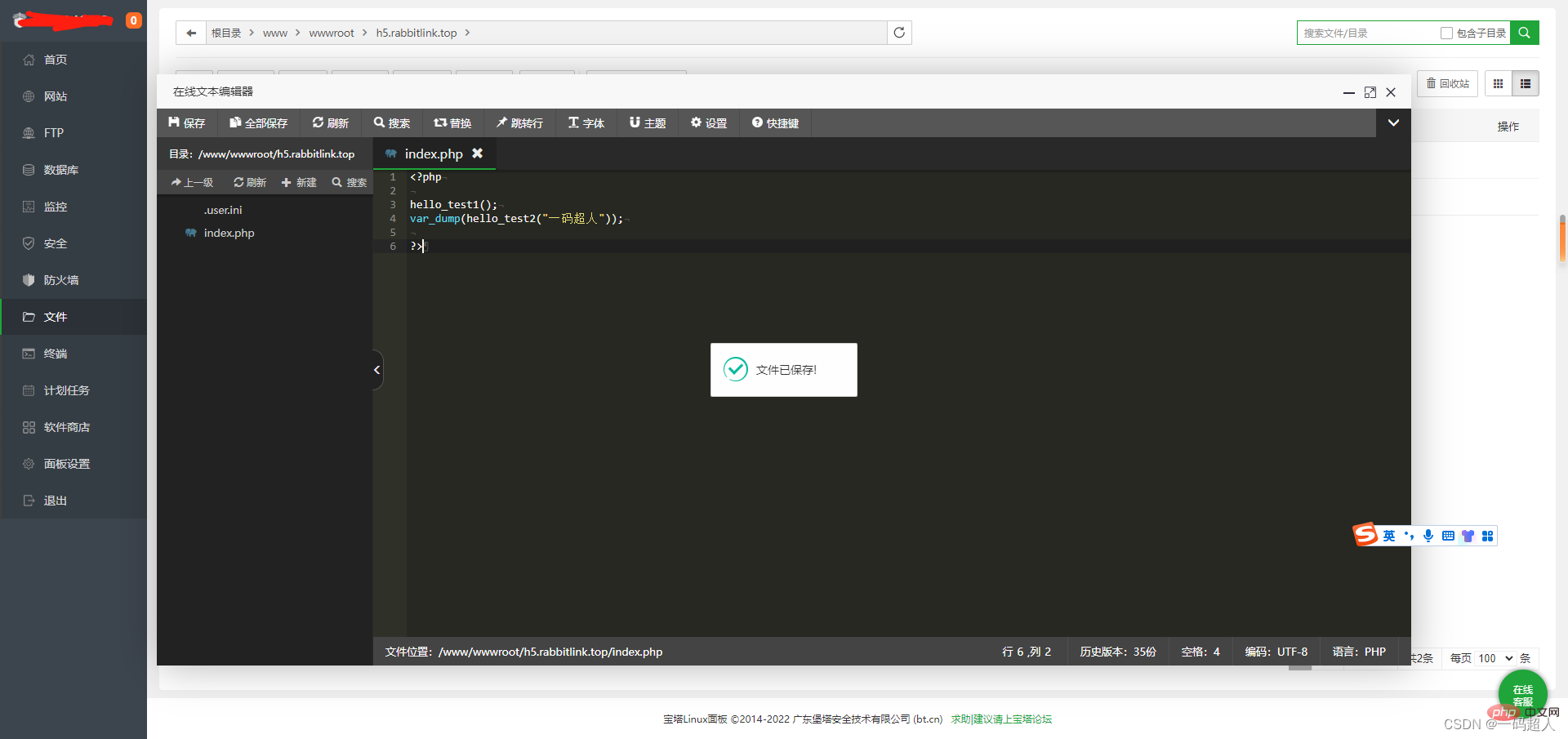
访问站点
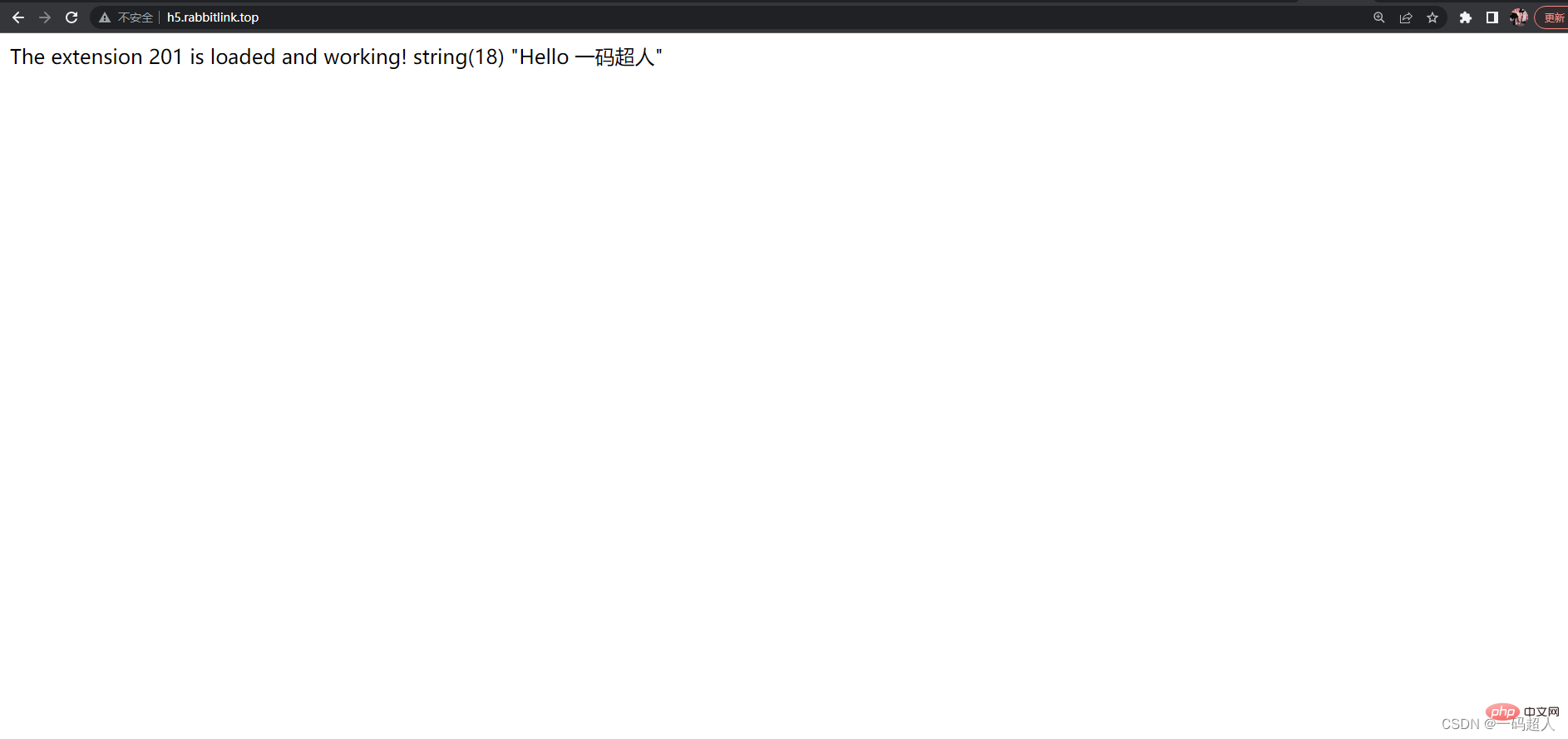
没有问题哦!
当然也可以通过命令行运行php脚本查看结果【前提是网站那里php命令行版本设置的7.4】
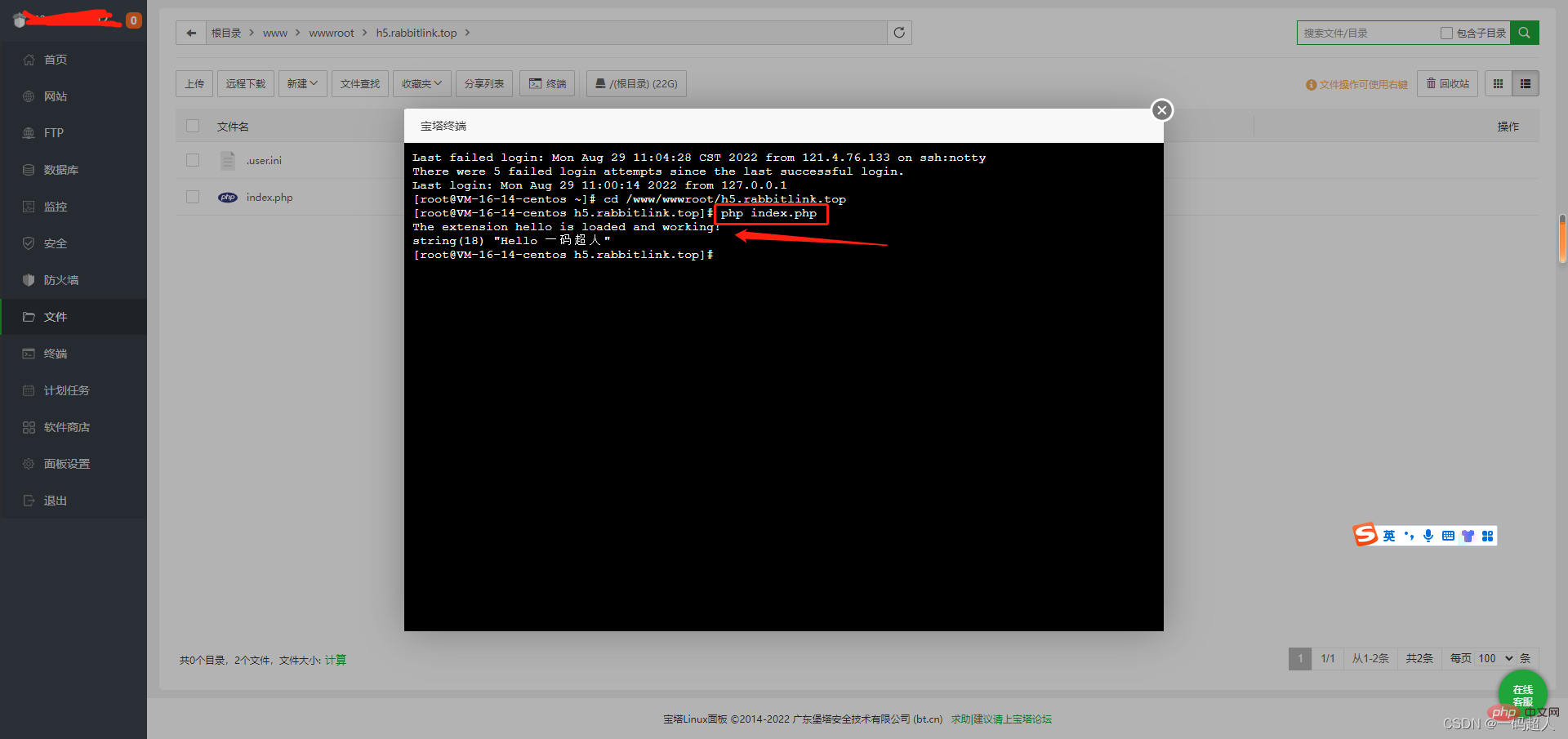
php index.php
OK!从创建到生成到使用扩展的流程结束,接下来才进入正题,开始用rust开发扩展。
6、rust与php扩展的整合开发
开发工具:CLion
需要rust环境与CLion中rust插件的安装与配置,这个自行去百度,比我想象中的全!
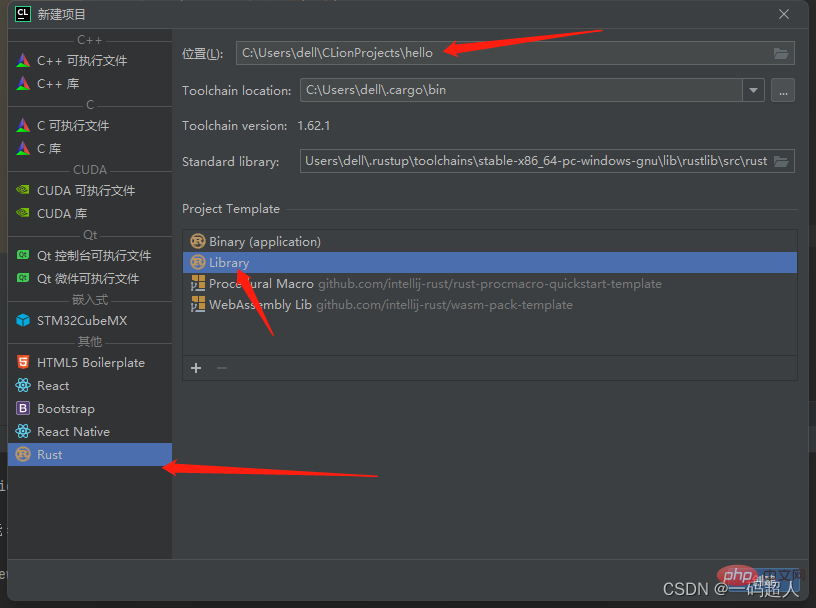
创建一个hello命名的库项目
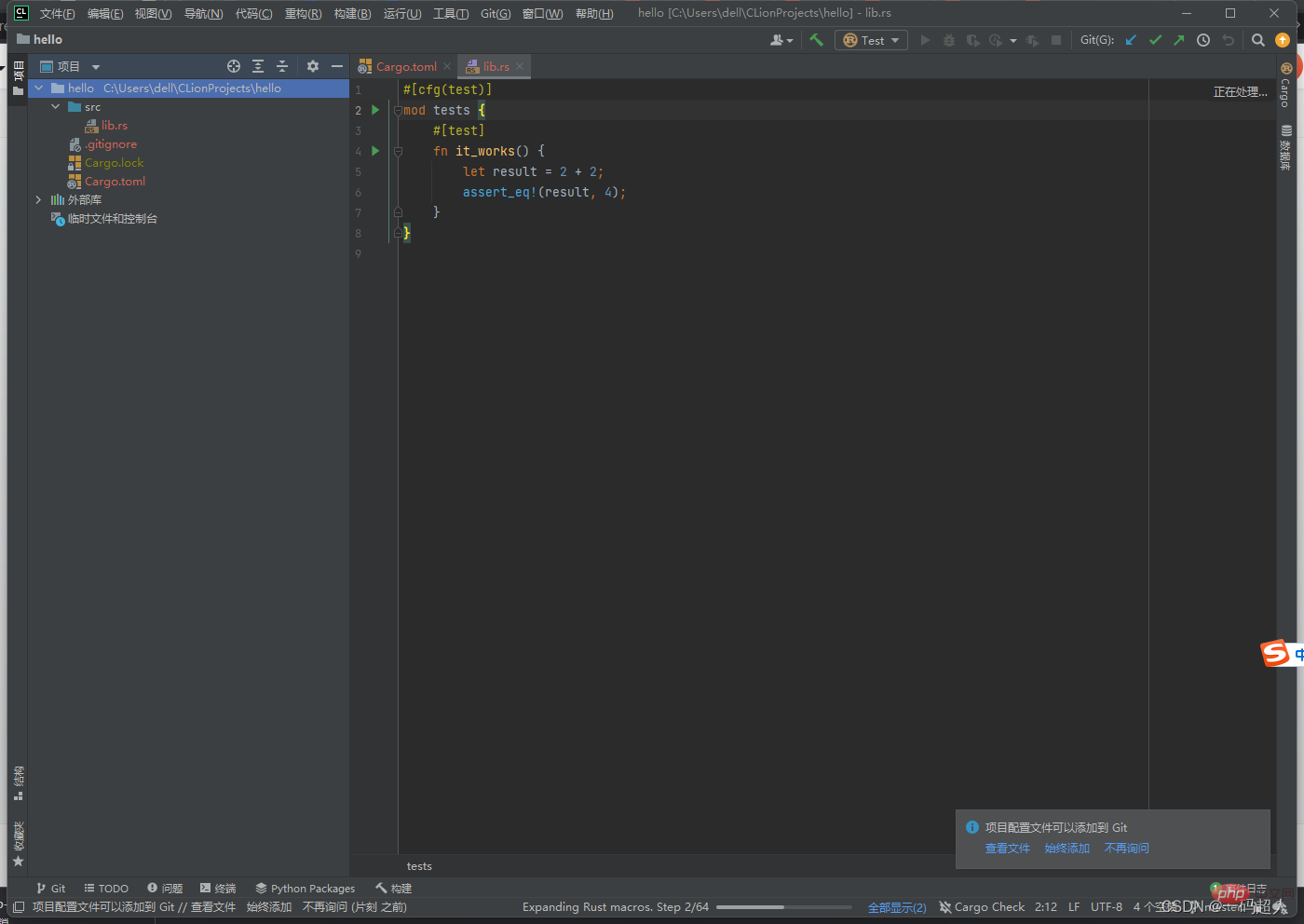
我们写两个导出函数,分别是加法功能和base64字符串解析功能。
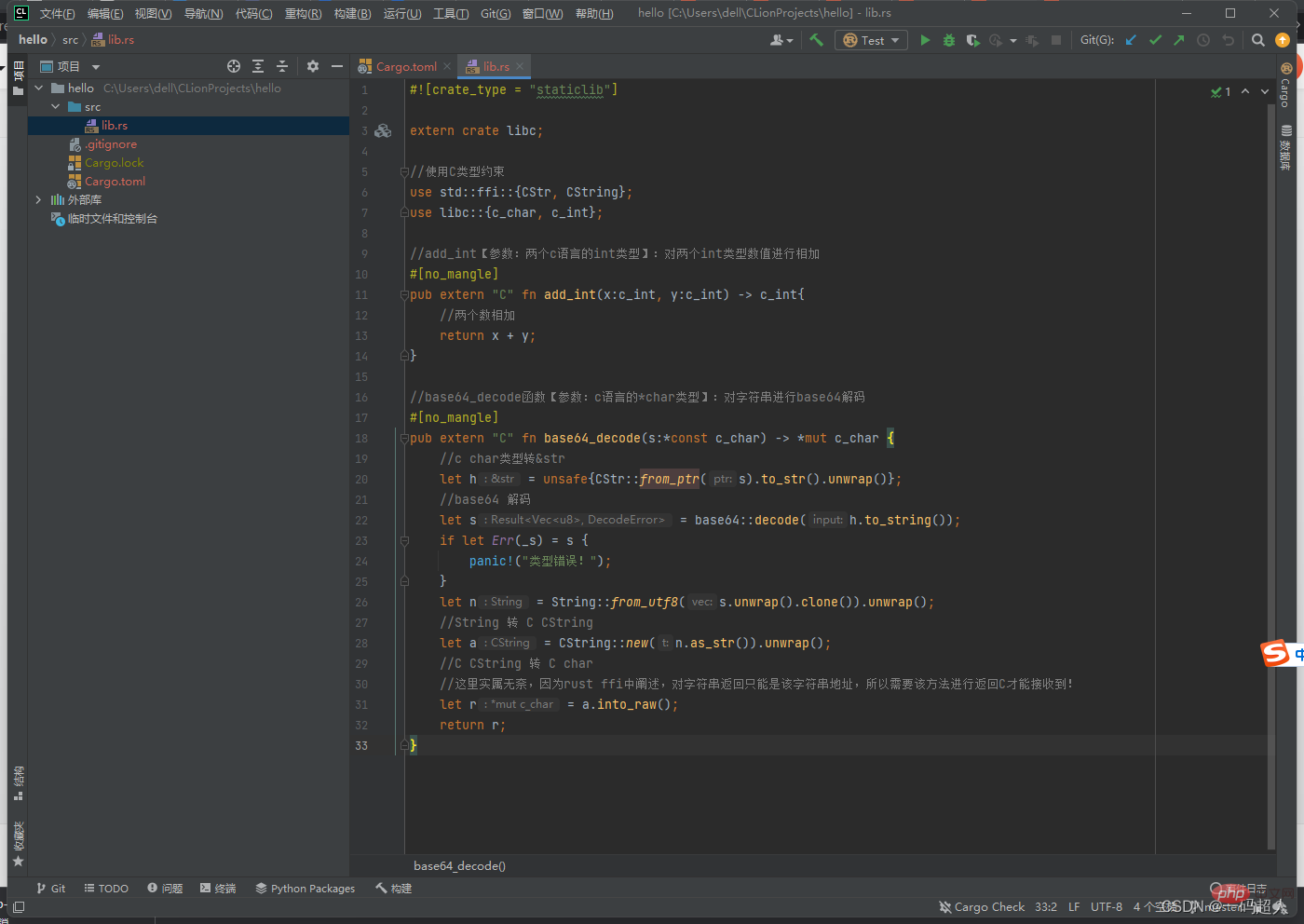
lib.rs
#![crate_type = "staticlib"]
extern crate libc;
//使用C类型约束
use std::ffi::{CStr, CString};
use libc::{c_char, c_int};
//add_int【参数:两个c语言的int类型】:对两个int类型数值进行相加
#[no_mangle]
pub extern "C" fn add_int(x:c_int, y:c_int) -> c_int{
//两个数相加
return x + y;
}
//base64_decode函数【参数:c语言的*char类型】:对字符串进行base64解码
#[no_mangle]
pub extern "C" fn base64_decode(s:*const c_char) -> *mut c_char {
//c char类型转&str
let h = unsafe{CStr::from_ptr(s).to_str().unwrap()};
//base64 解码
let s = base64::decode(h.to_string());
if let Err(_s) = s {
panic!("类型错误!");
}
let n = String::from_utf8(s.unwrap().clone()).unwrap();
//String 转 C CString
let a = CString::new(n.as_str()).unwrap();
//C CString 转 C char
//这里实属无奈,因为rust ffi中阐述,对字符串返回只能是该字符串地址,所以需要该方法进行返回C才能接收到!
let r = a.into_raw();
return r;
}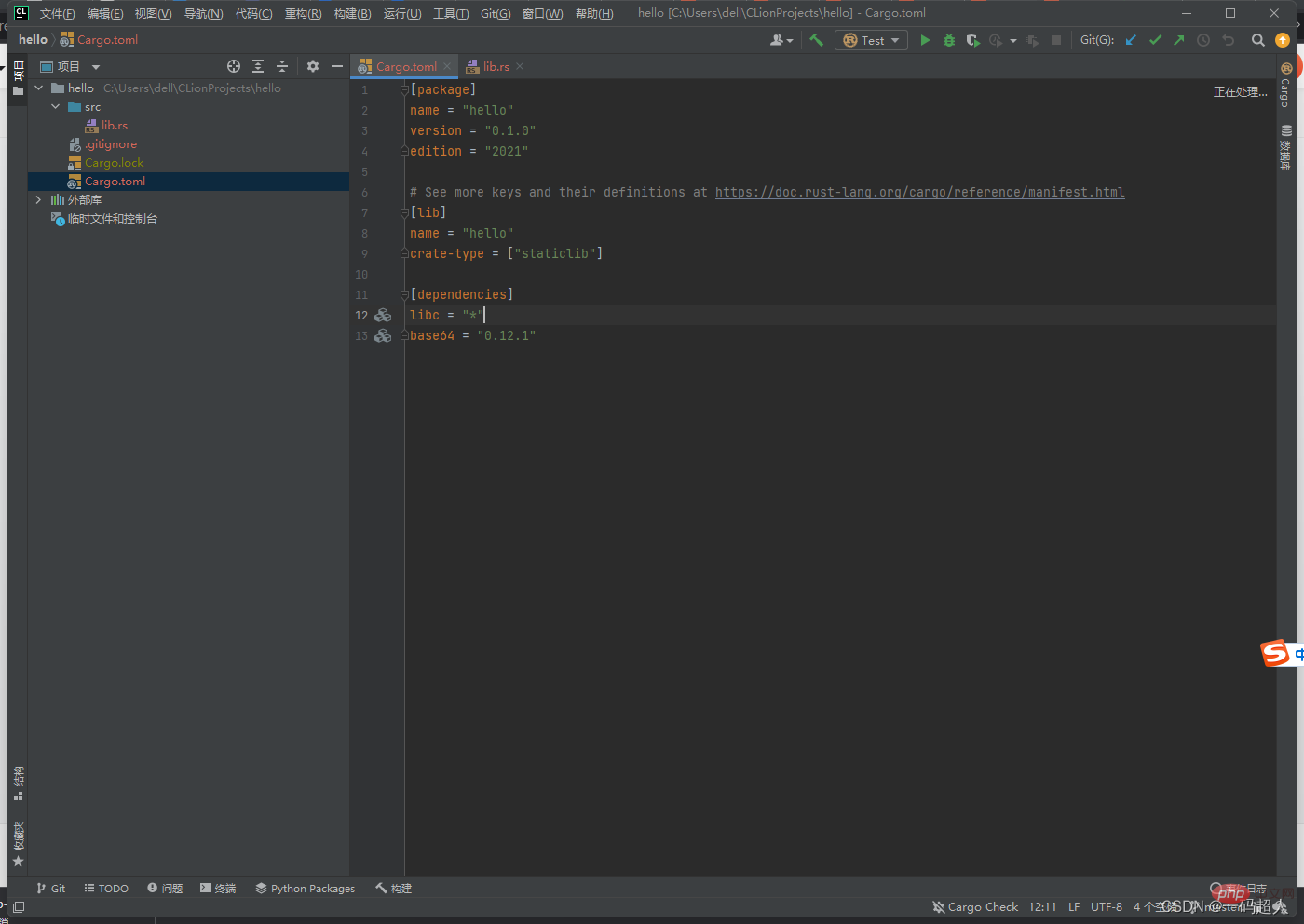
Cargo.toml
[package] name = "hello" version = "0.1.0" edition = "2021" # See more keys and their definitions at https://doc.rust-lang.org/cargo/reference/manifest.html [lib] name = "hello" crate-type = ["staticlib"] [dependencies] libc = "*" base64 = "0.12.1"
注意在编译过程中涉及系统类型,不然在引入该静态库编译扩展可能报错,提示不支持。
编译64位静态库
rustup target add x86_64-unknown-linux-musl cargo build --target x86_64-unknown-linux-musl --release
编译32位静态库
rustup target add i686-unknown-linux-musl cargo build --target i686-unknown-linux-musl --release
这里我们是64位系统。
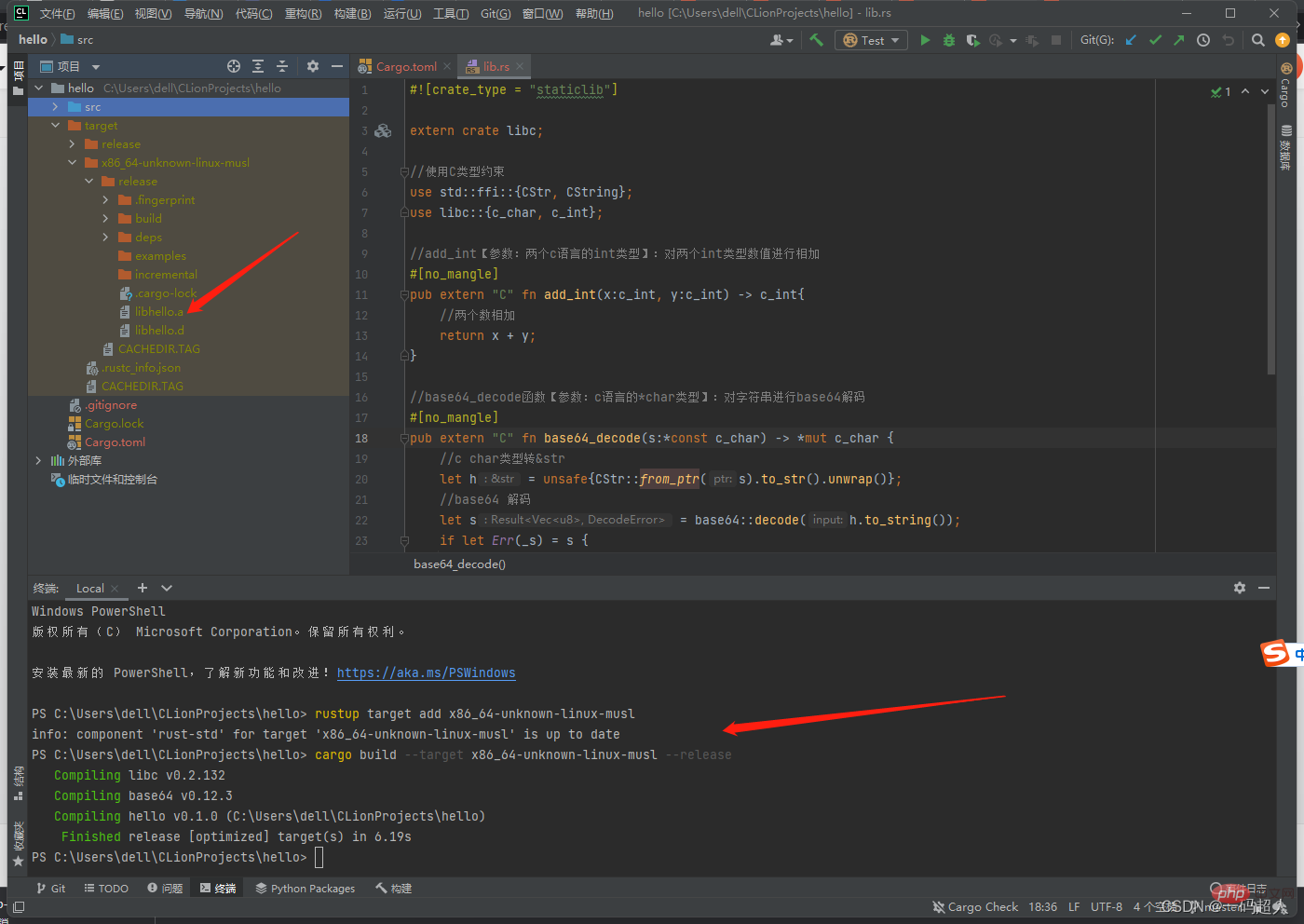
会生成一个.a文件,该文件便是liunx支持的静态库文件。
生成支持C语言的胶水头文件【用于C调用该库需要写的函数声明,很方便】
创建cbindgen.toml文件
内容:
language = "C"
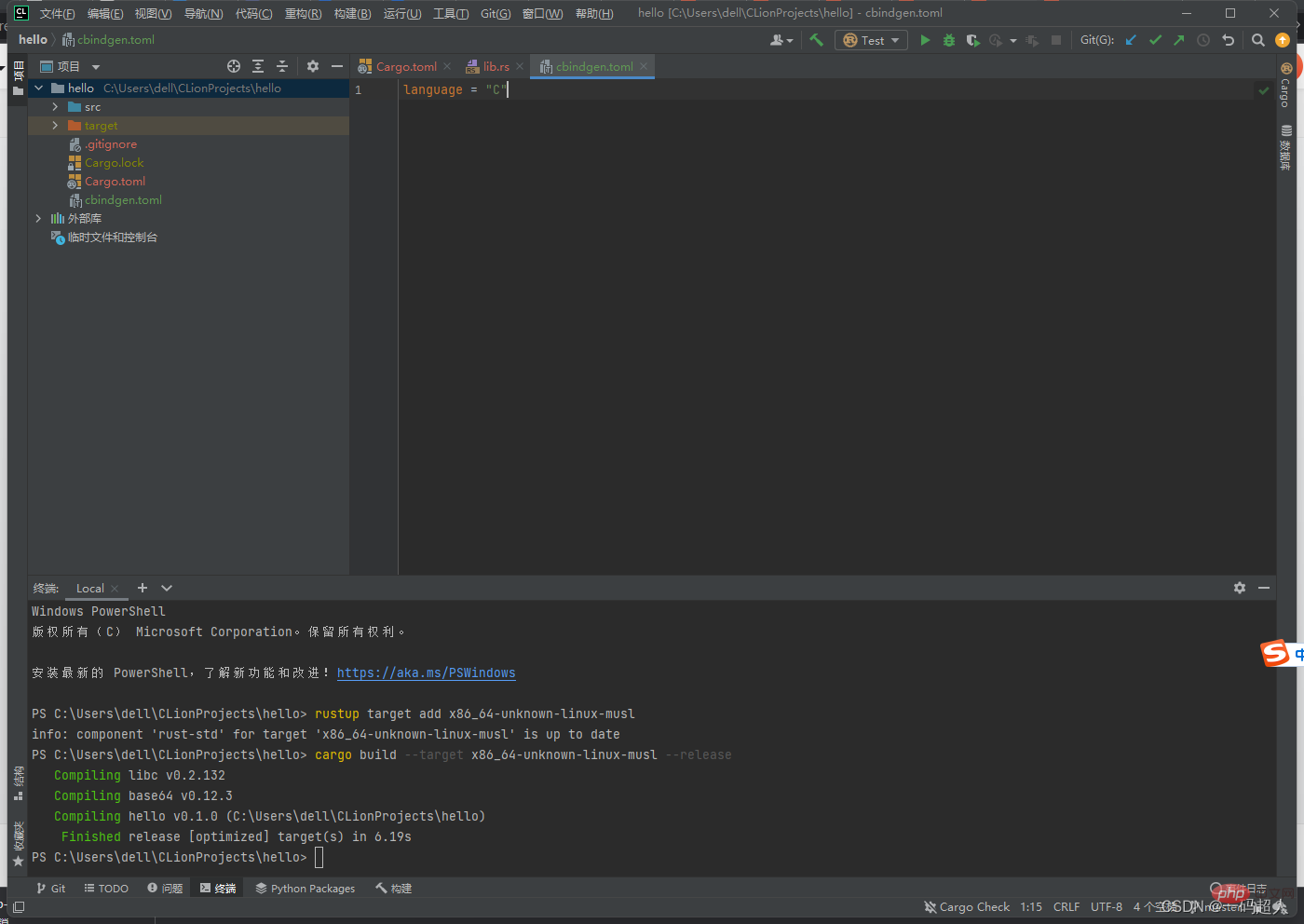
安装cbindgen,创建头文件。
cargo install --force cbindgen cbindgen --config cbindgen.toml --crate 项目名称 --output 头文件名称.h
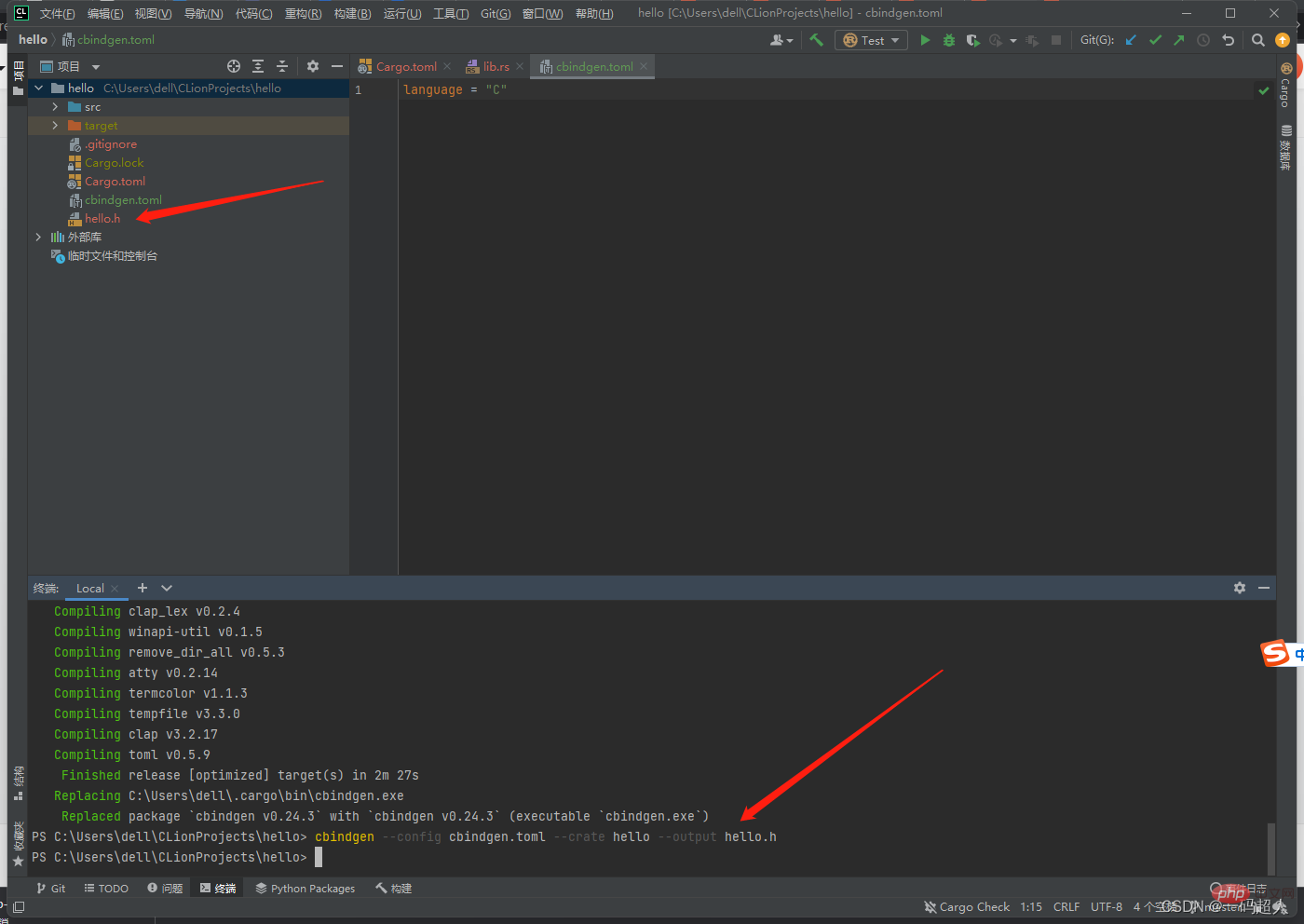
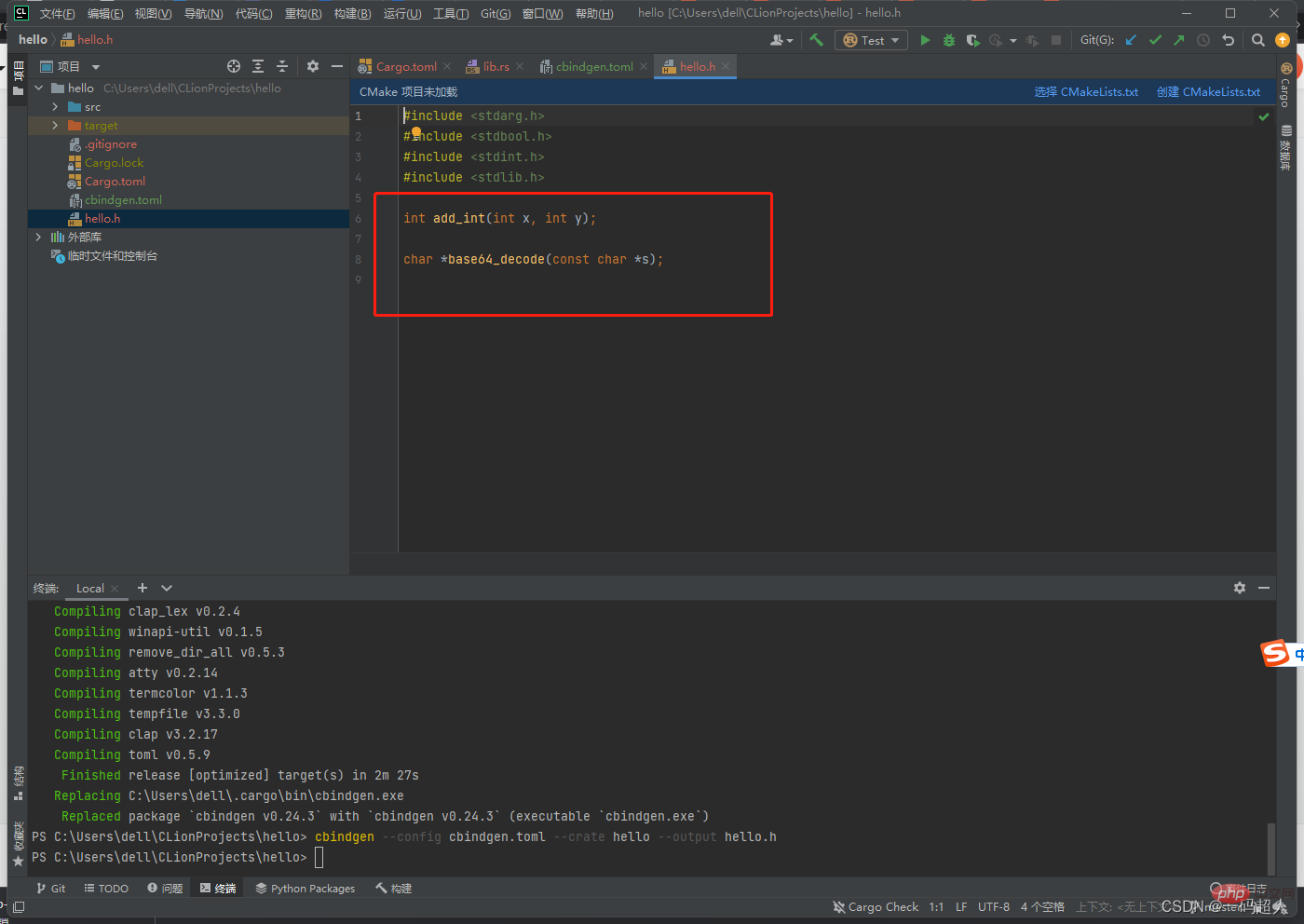
自动生成了C语言的函数声明hello.h文件,用于调用。
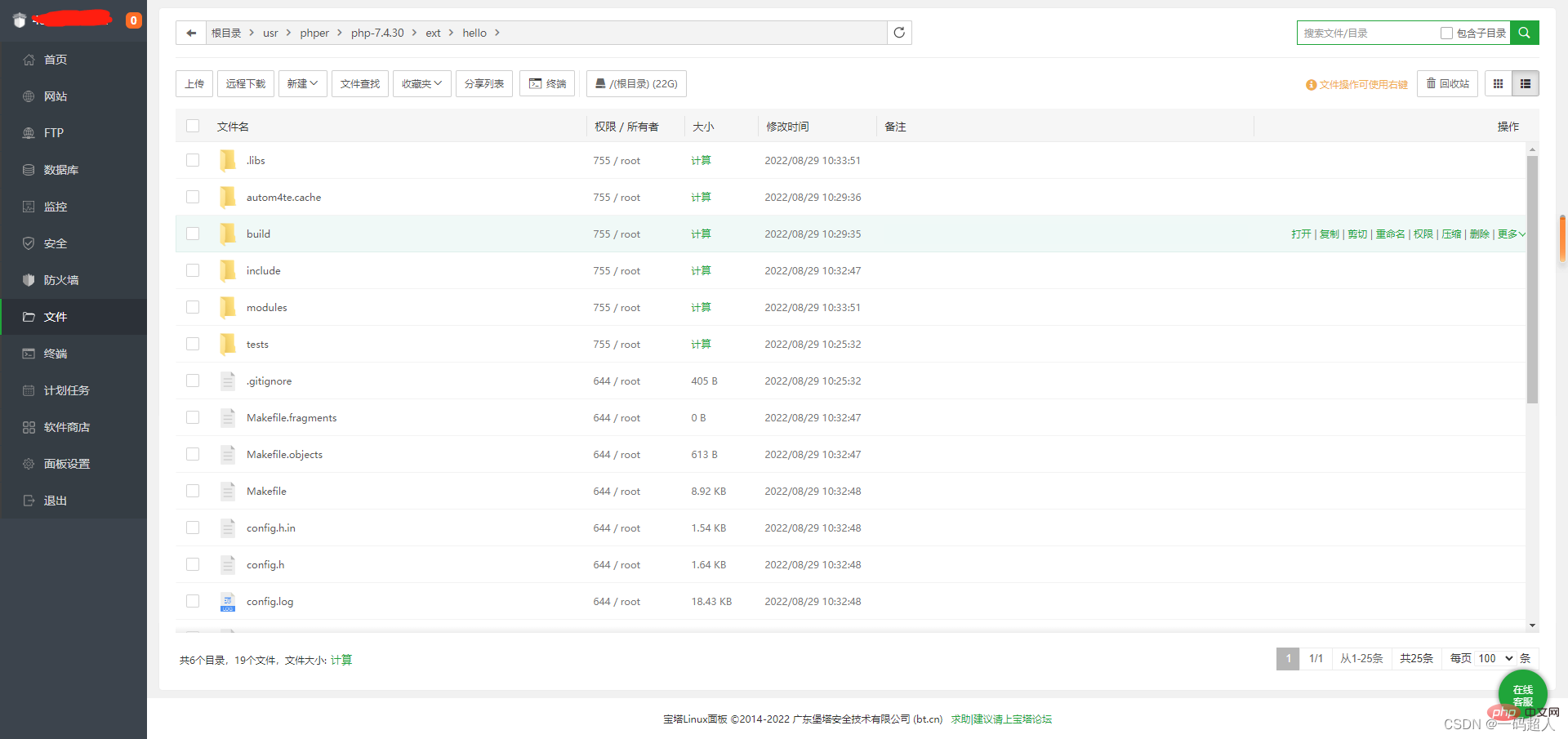
回到之前我们创建的hello扩展
创建lib文件夹
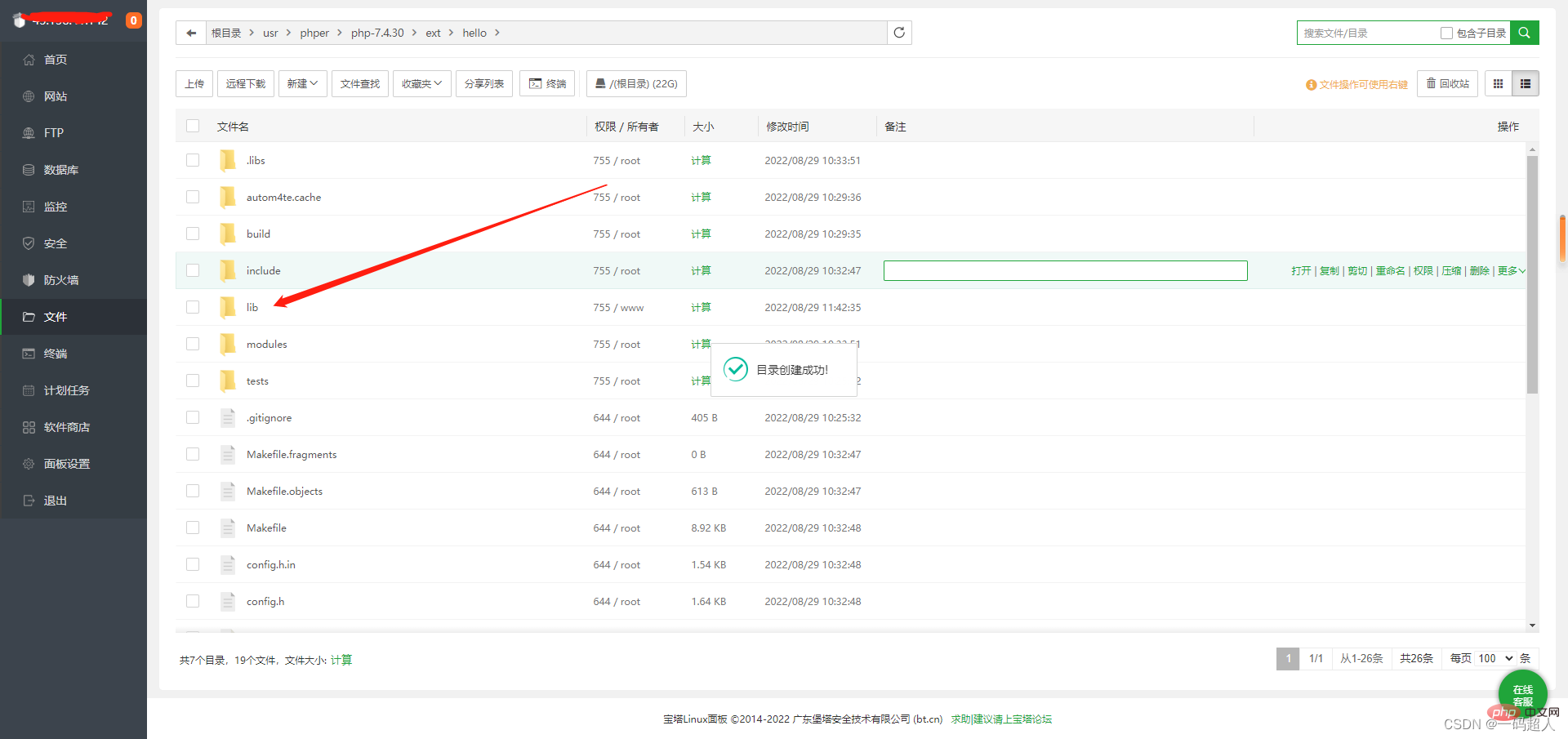
将刚刚编译出来的静态库.a文件上传到lib目录下
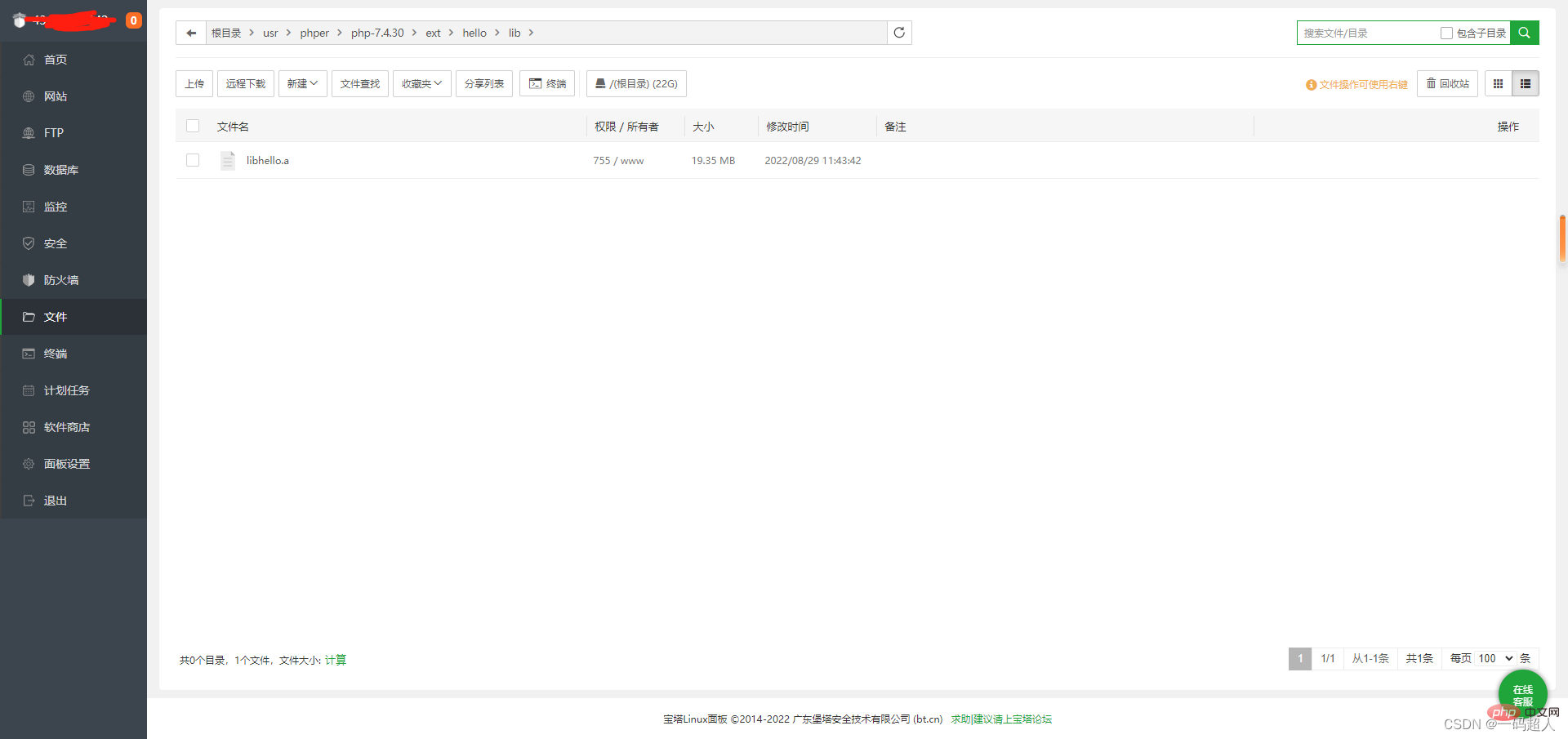
将刚刚创建的.h头文件上传到扩展目录下
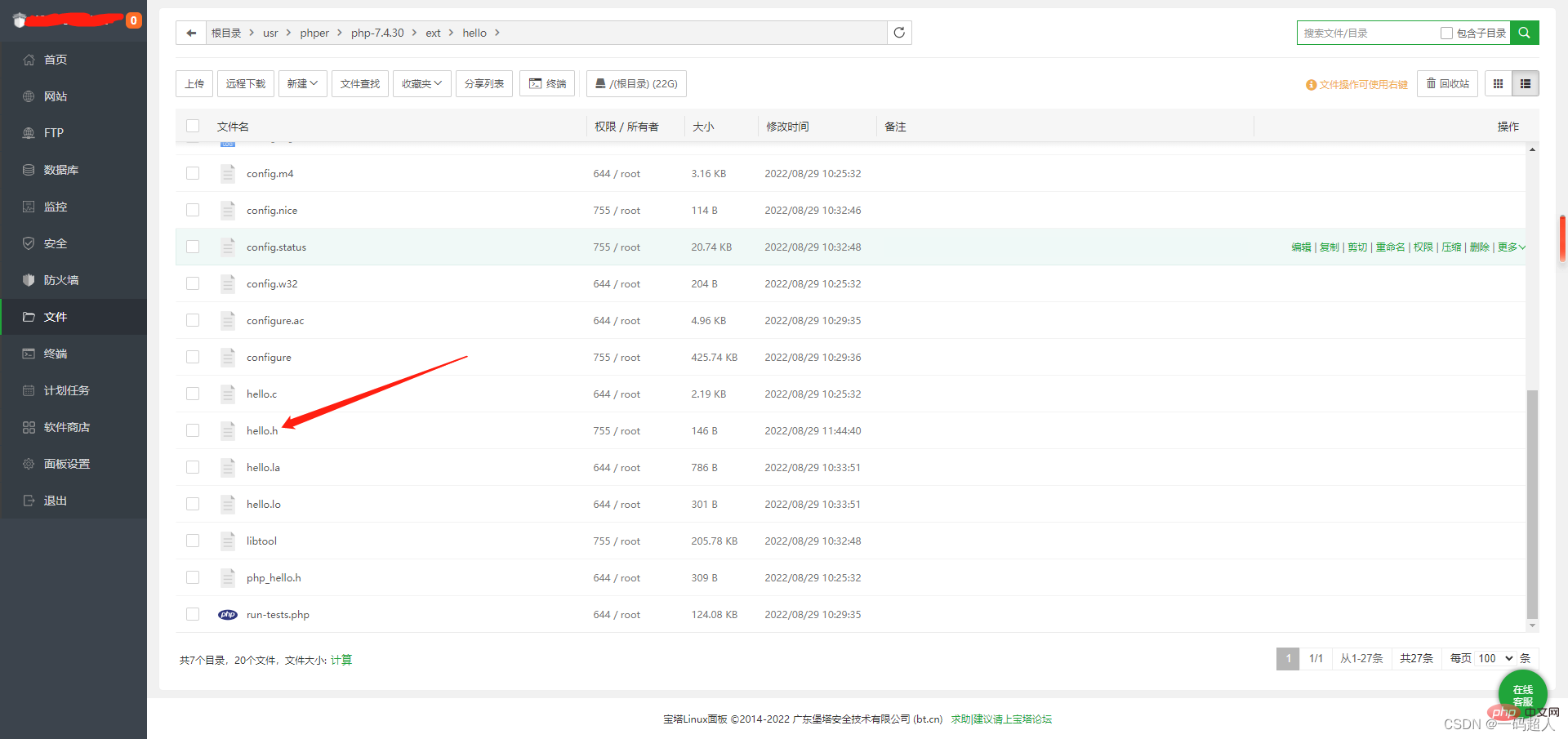
配置.m4预编译文件【关键】
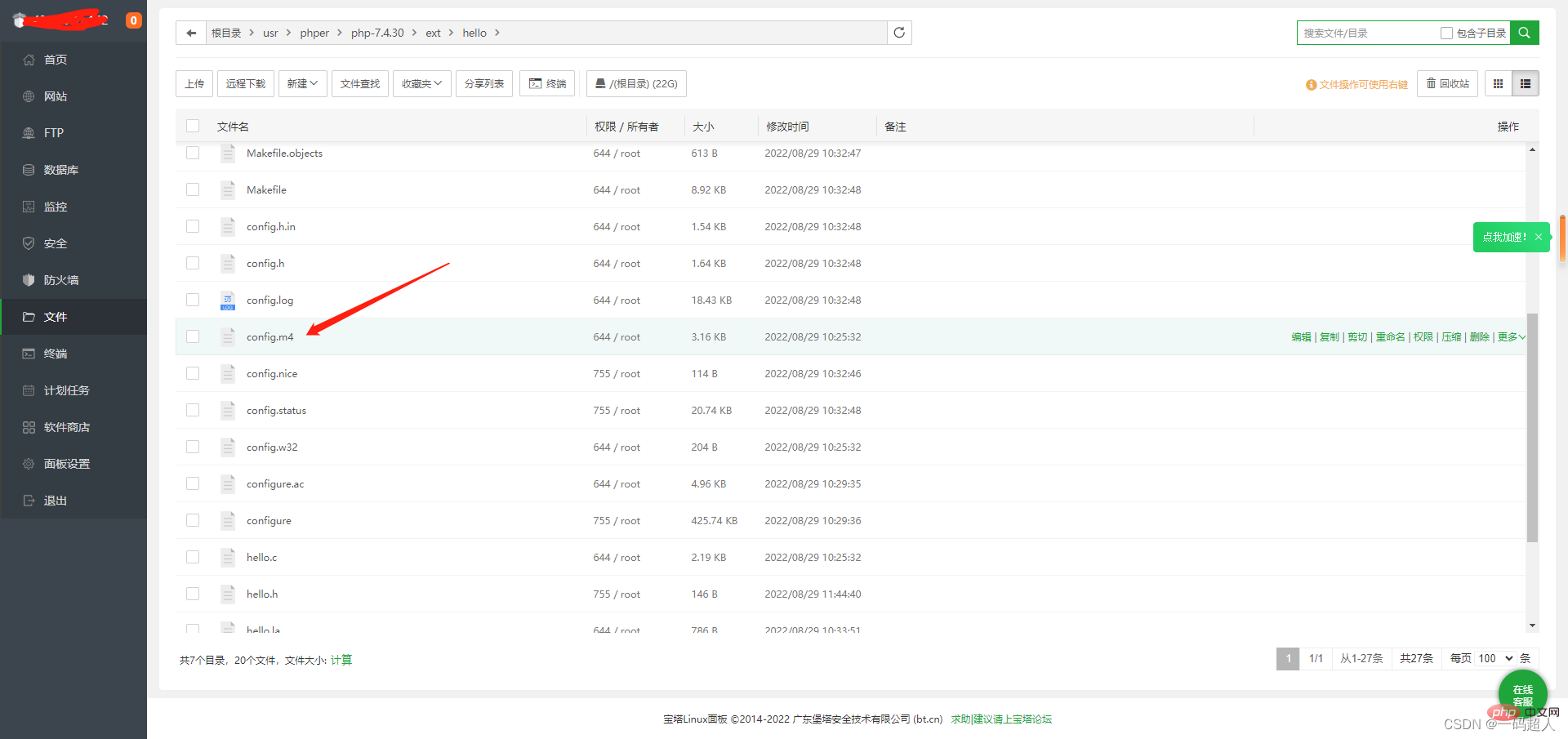
设置引入lib文件夹中的静态库文件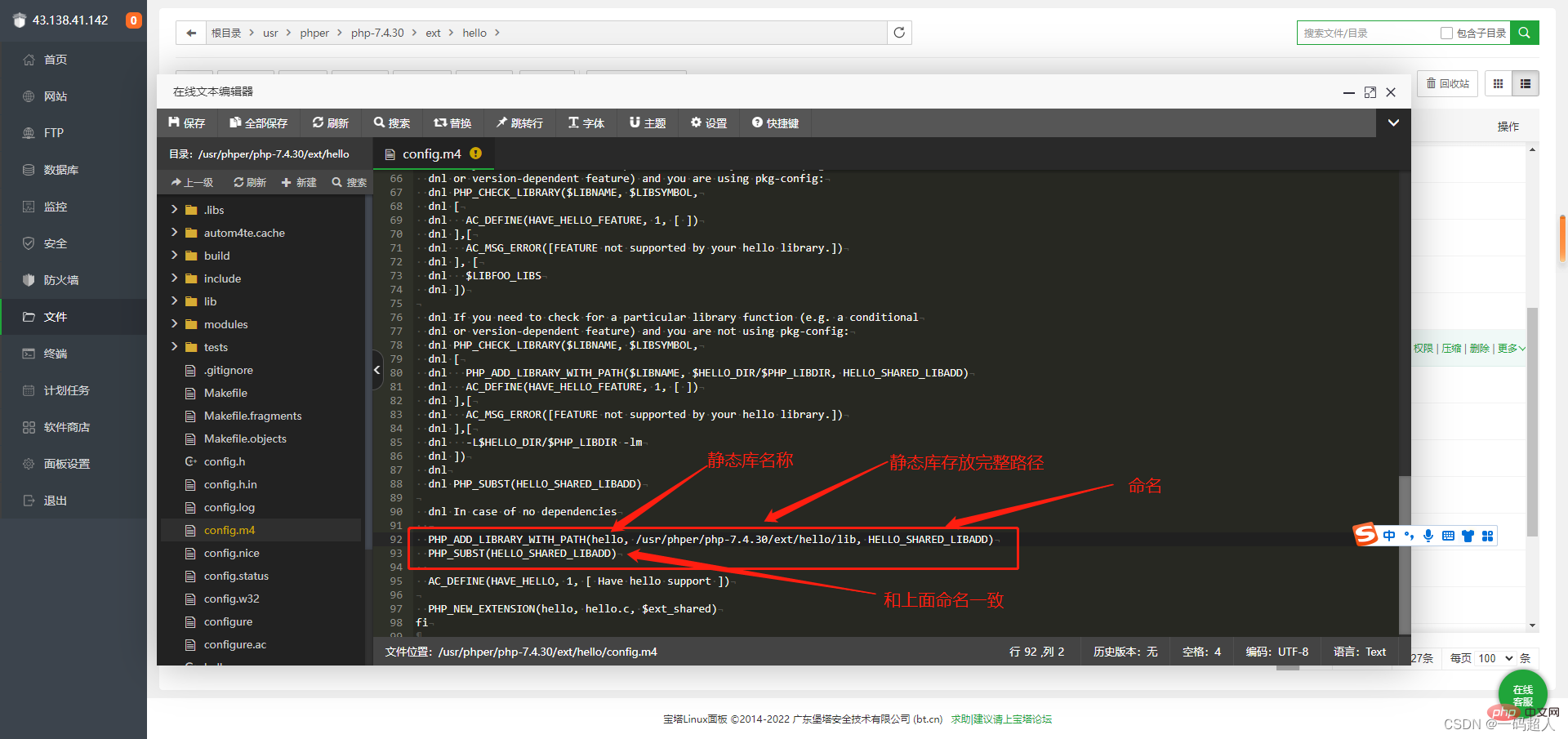
PHP_ADD_LIBRARY_WITH_PATH(hello, /usr/phper/php-7.4.30/ext/hello/lib, HELLO_SHARED_LIBADD) PHP_SUBST(HELLO_SHARED_LIBADD)
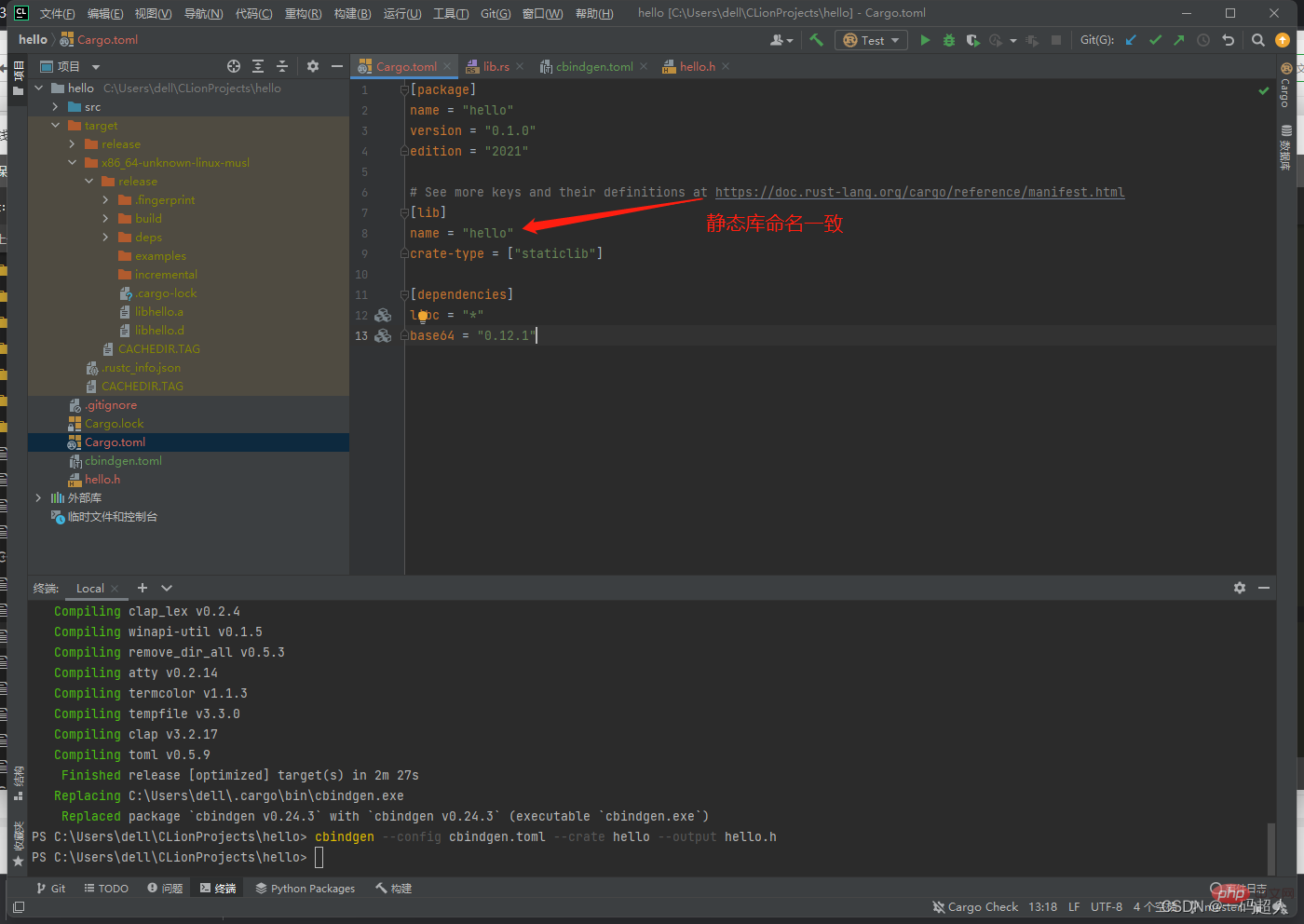
保存.m4
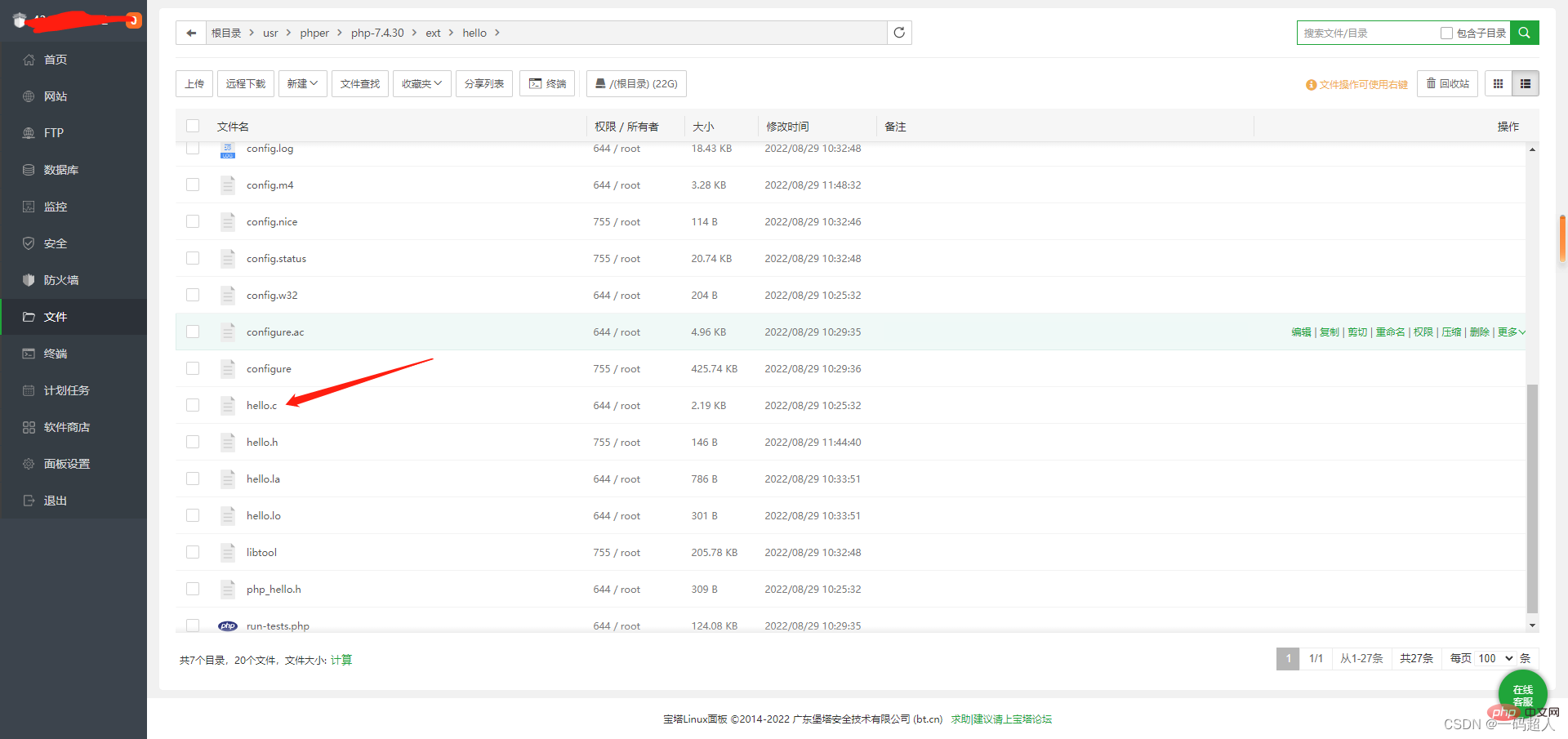
编写主文件
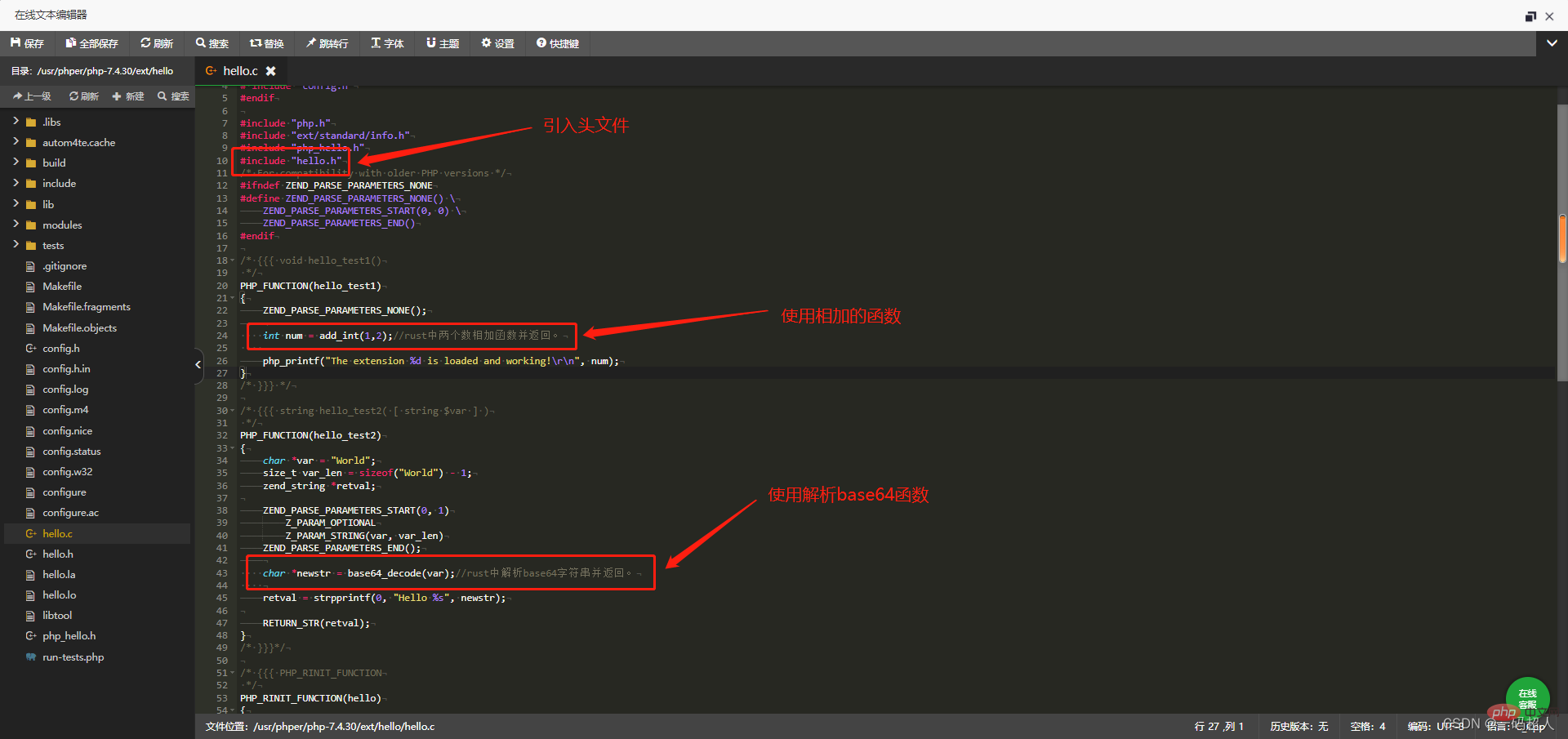
/* hello extension for PHP */
#ifdef HAVE_CONFIG_H
# include "config.h"
#endif
#include "php.h"
#include "ext/standard/info.h"
#include "php_hello.h"
#include "hello.h"//引入头文件
/* For compatibility with older PHP versions */
#ifndef ZEND_PARSE_PARAMETERS_NONE
#define ZEND_PARSE_PARAMETERS_NONE() \
ZEND_PARSE_PARAMETERS_START(0, 0) \
ZEND_PARSE_PARAMETERS_END()
#endif
/* {{{ void hello_test1()
*/
PHP_FUNCTION(hello_test1)
{
ZEND_PARSE_PARAMETERS_NONE();
int num = add_int(1,2);//rust中两个数相加函数并返回。
php_printf("The extension %d is loaded and working!\r\n", num);
}
/* }}} */
/* {{{ string hello_test2( [ string $var ] )
*/
PHP_FUNCTION(hello_test2)
{
char *var = "World";
size_t var_len = sizeof("World") - 1;
zend_string *retval;
ZEND_PARSE_PARAMETERS_START(0, 1)
Z_PARAM_OPTIONAL
Z_PARAM_STRING(var, var_len)
ZEND_PARSE_PARAMETERS_END();
char *newstr = base64_decode(var);//rust中解析base64字符串并返回。
retval = strpprintf(0, "Hello %s", newstr);
RETURN_STR(retval);
}
/* }}}*/
/* {{{ PHP_RINIT_FUNCTION
*/
PHP_RINIT_FUNCTION(hello)
{
#if defined(ZTS) && defined(COMPILE_DL_HELLO)
ZEND_TSRMLS_CACHE_UPDATE();
#endif
return SUCCESS;
}
/* }}} */
/* {{{ PHP_MINFO_FUNCTION
*/
PHP_MINFO_FUNCTION(hello)
{
php_info_print_table_start();
php_info_print_table_header(2, "hello support", "enabled");
php_info_print_table_end();
}
/* }}} */
/* {{{ arginfo
*/
ZEND_BEGIN_ARG_INFO(arginfo_hello_test1, 0)
ZEND_END_ARG_INFO()
ZEND_BEGIN_ARG_INFO(arginfo_hello_test2, 0)
ZEND_ARG_INFO(0, str)
ZEND_END_ARG_INFO()
/* }}} */
/* {{{ hello_functions[]
*/
static const zend_function_entry hello_functions[] = {
PHP_FE(hello_test1, arginfo_hello_test1)
PHP_FE(hello_test2, arginfo_hello_test2)
PHP_FE_END
};
/* }}} */
/* {{{ hello_module_entry
*/
zend_module_entry hello_module_entry = {
STANDARD_MODULE_HEADER,
"hello", /* Extension name */
hello_functions, /* zend_function_entry */
NULL, /* PHP_MINIT - Module initialization */
NULL, /* PHP_MSHUTDOWN - Module shutdown */
PHP_RINIT(hello), /* PHP_RINIT - Request initialization */
NULL, /* PHP_RSHUTDOWN - Request shutdown */
PHP_MINFO(hello), /* PHP_MINFO - Module info */
PHP_HELLO_VERSION, /* Version */
STANDARD_MODULE_PROPERTIES
};
/* }}} */
#ifdef COMPILE_DL_HELLO
# ifdef ZTS
ZEND_TSRMLS_CACHE_DEFINE()
# endif
ZEND_GET_MODULE(hello)
#endif删除之前生成的扩展文件
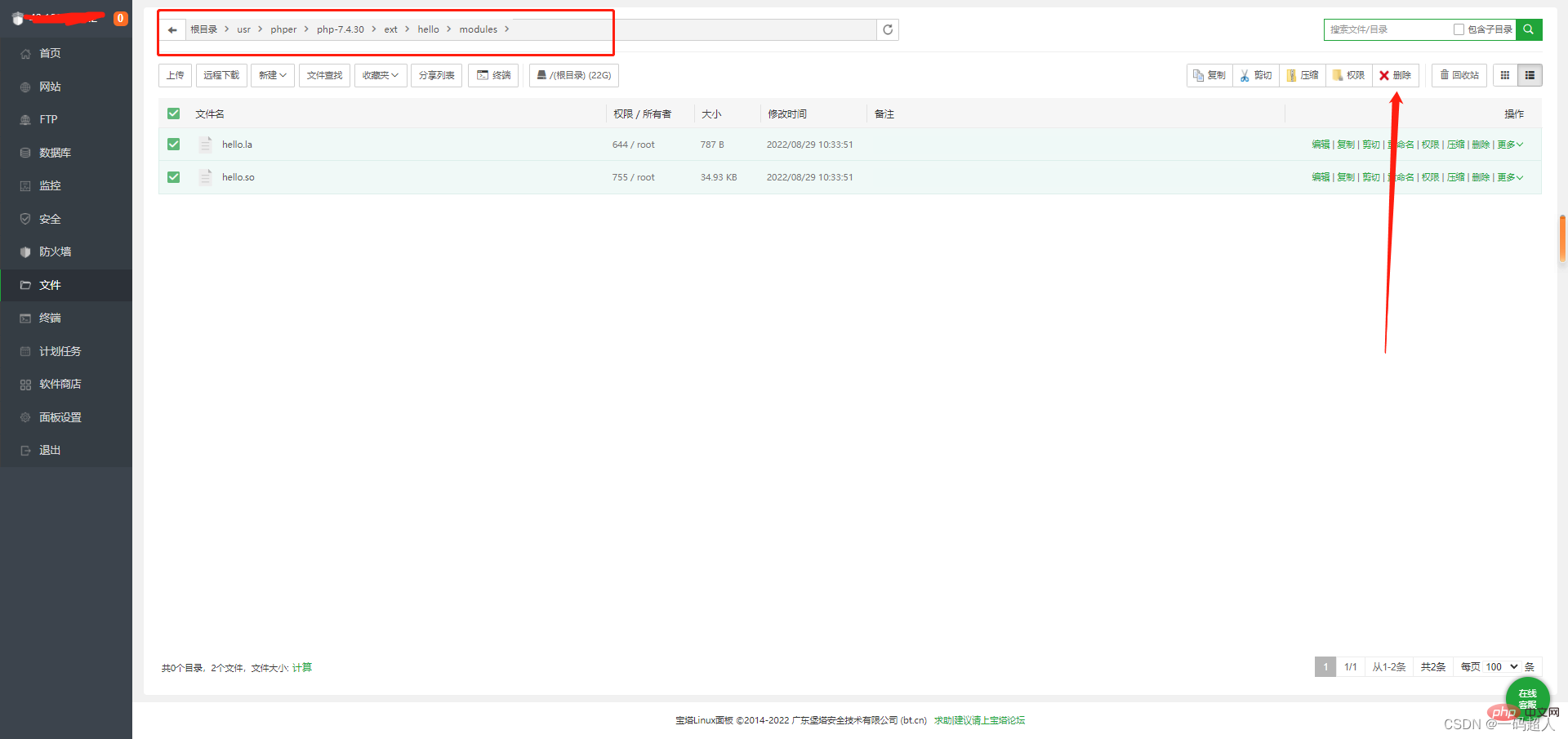
重新生成扩展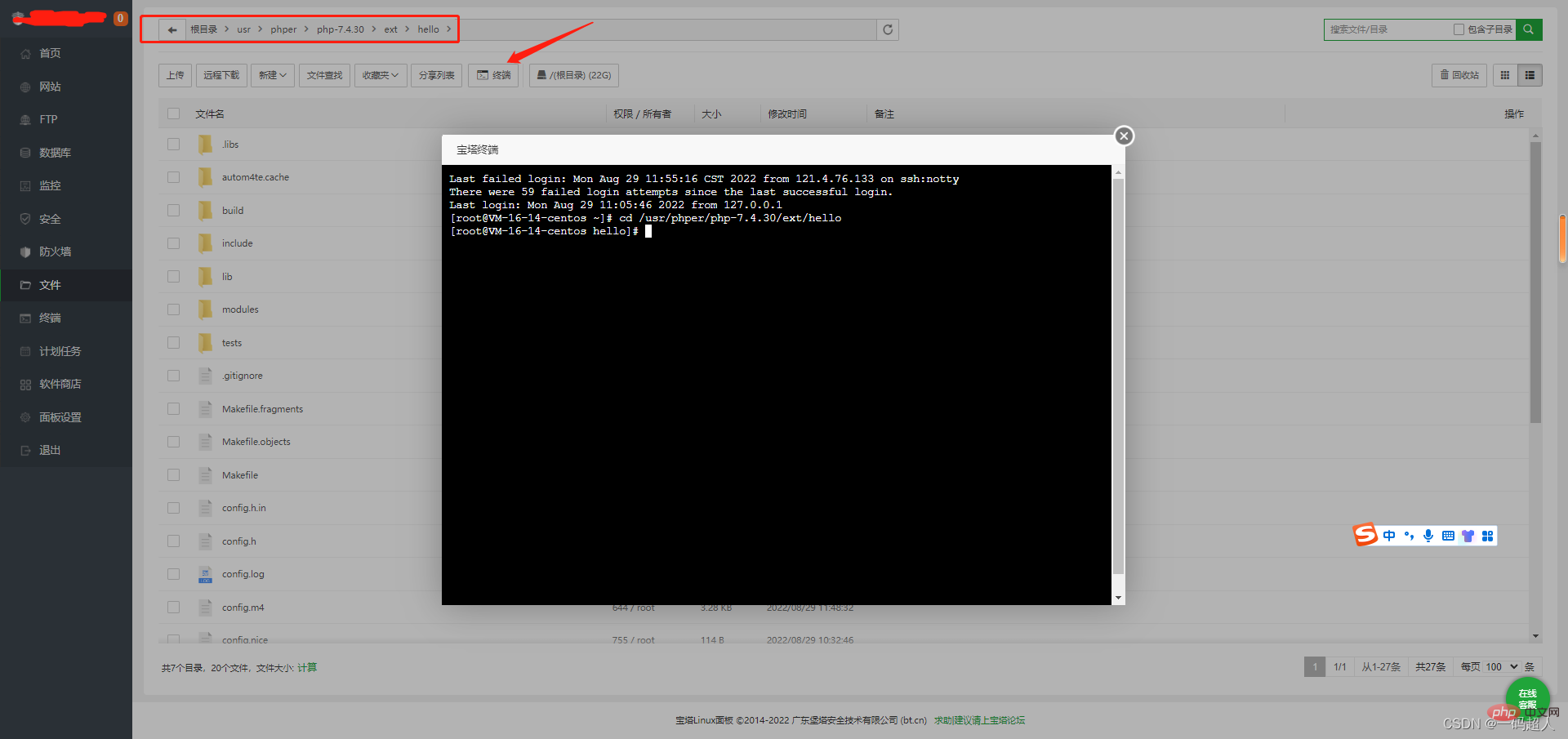
phpize ./configure --with-php-config=/www/server/php/74/bin/php-config make
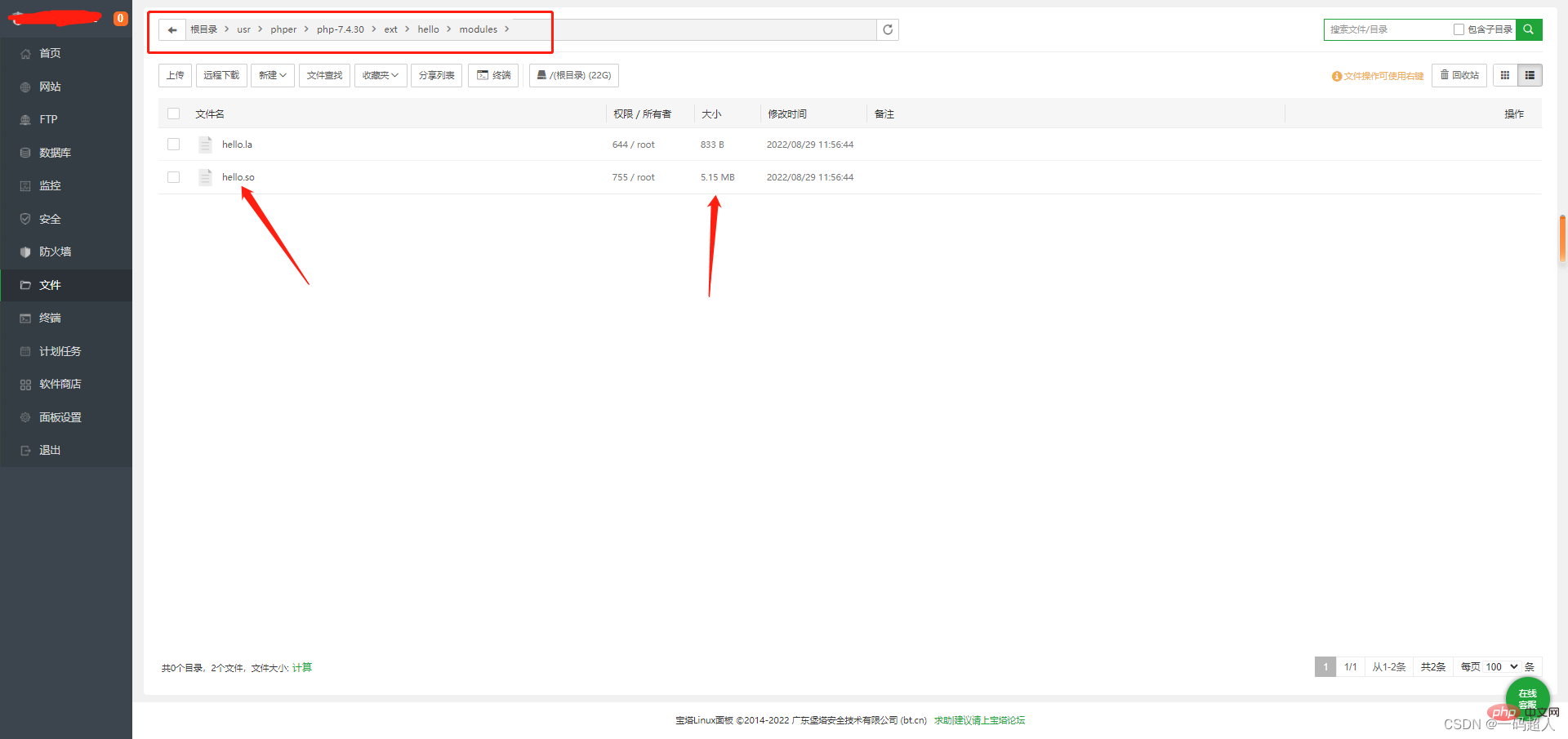
大小都变了,说明我们的静态库在里面了哈哈。
按上述使用扩展流程替换扩展
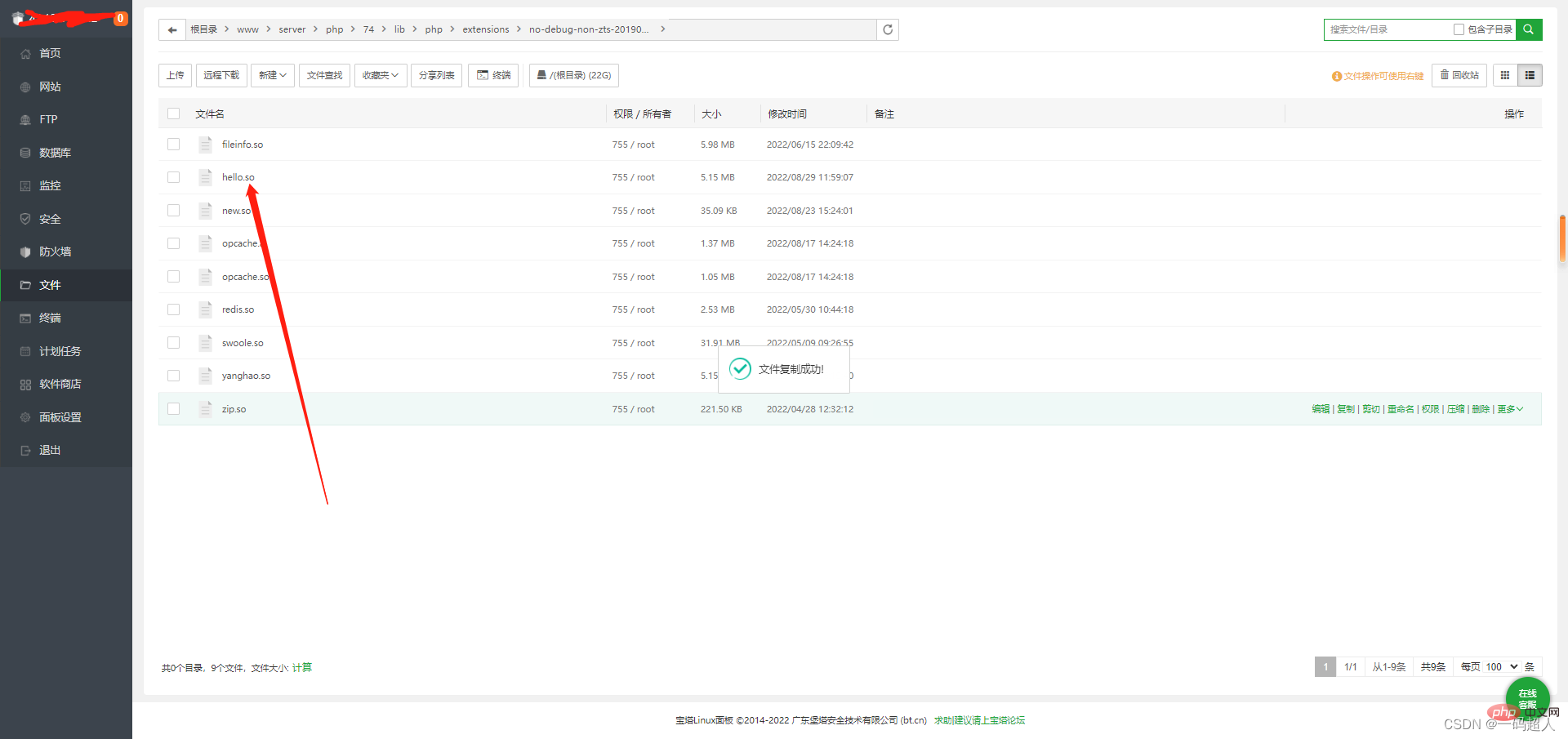
注意!替换扩展文件后要重启PHP哦,不然不生效!
7、测试rust开发的php扩展
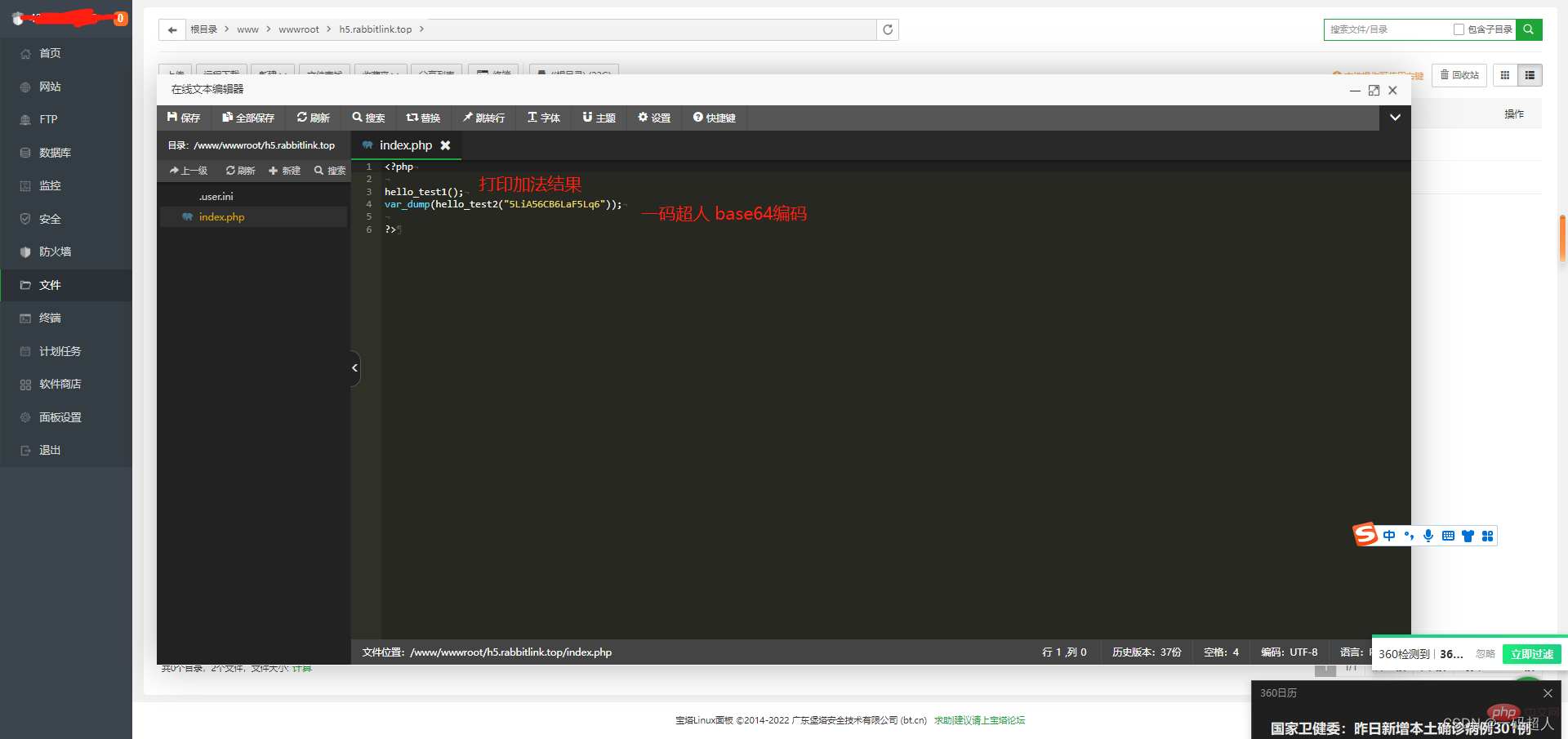
网页测试
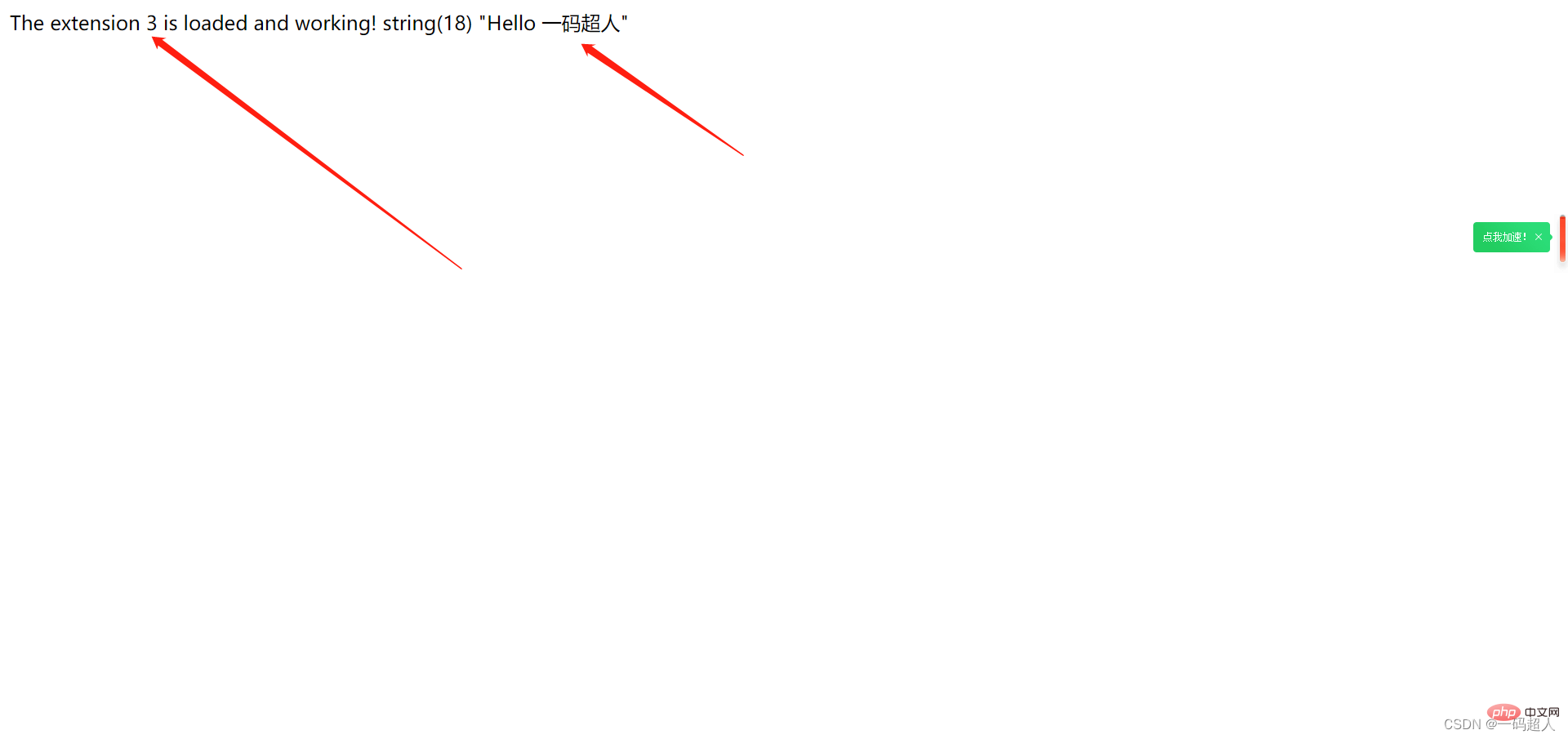
命令行测试
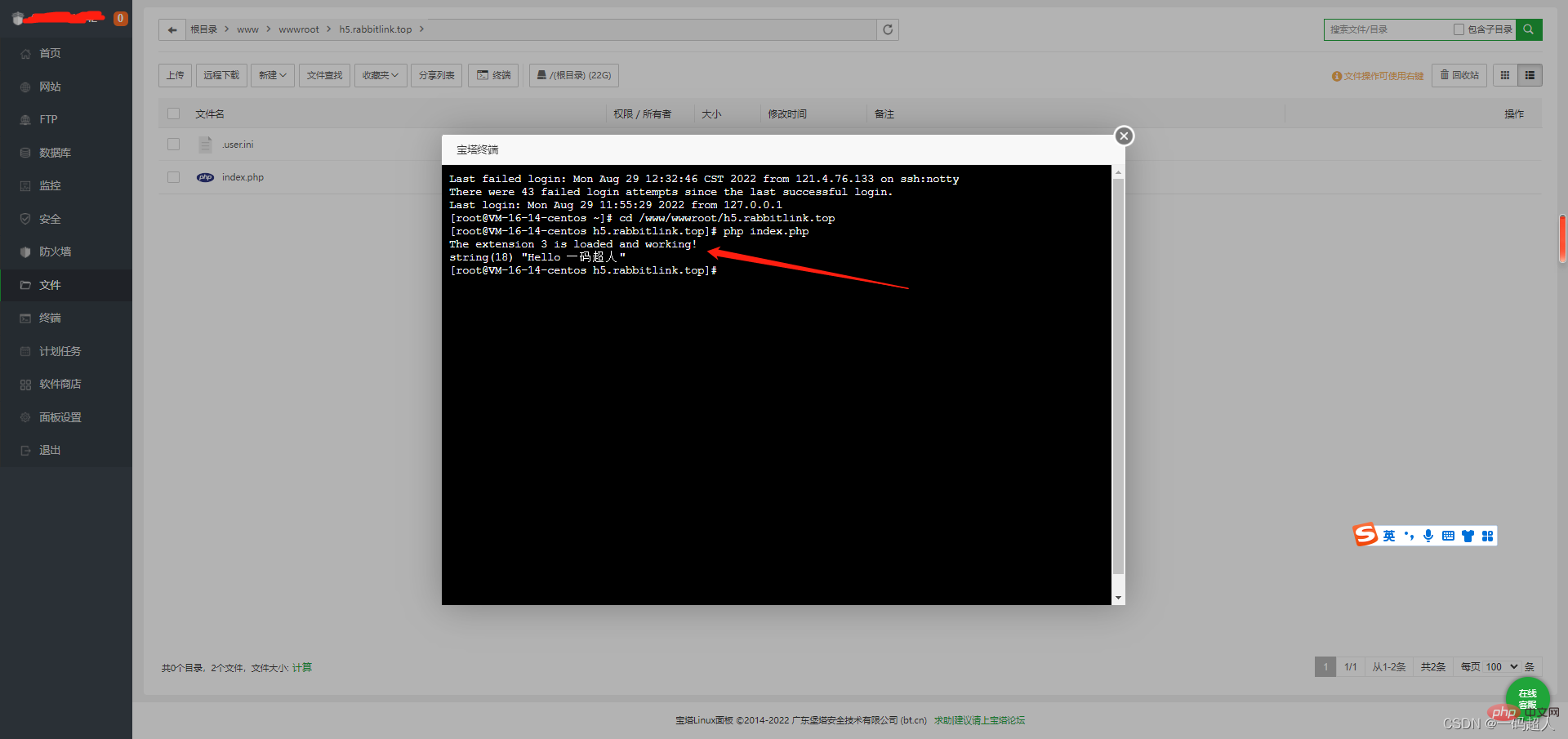
也可以通过php扩展骨架直接进行测试

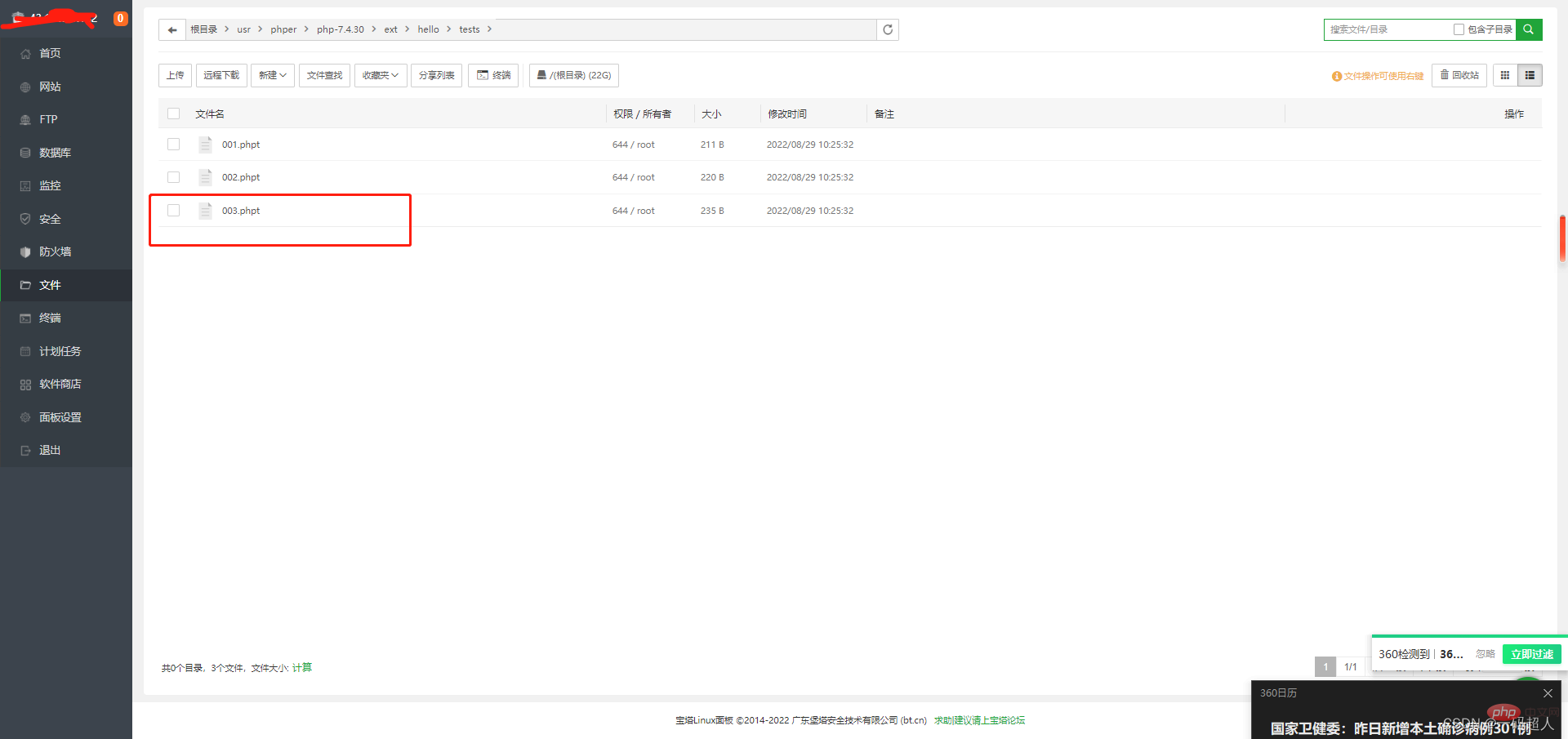
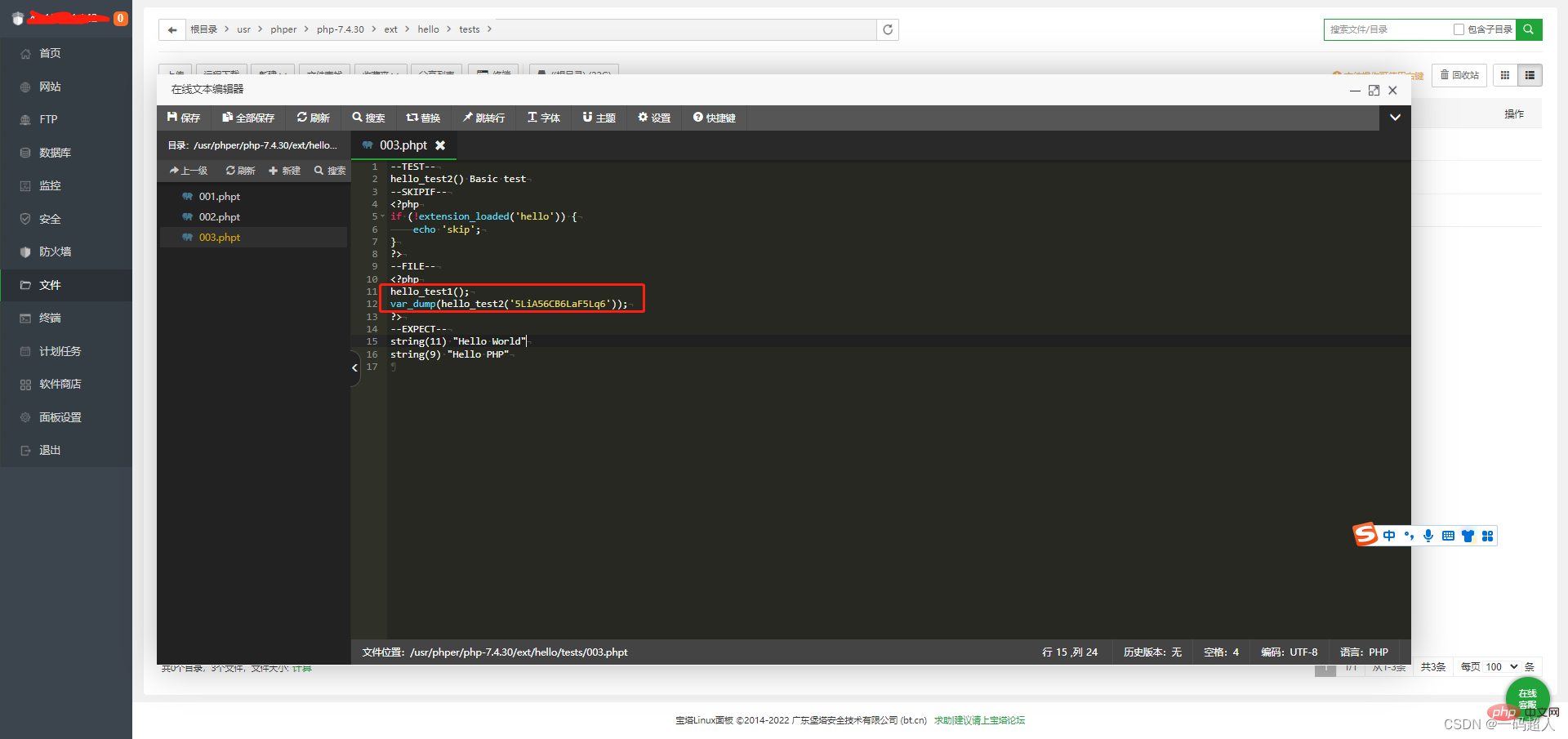
编写要执行测试的扩展函数
--TEST--
hello_test2() Basic test
--SKIPIF--
<?php
if (!extension_loaded('hello')) {
echo 'skip';
}
?>
--FILE--
<?php
hello_test1();
var_dump(hello_test2('5LiA56CB6LaF5Lq6'));
?>
--EXPECT--
string(11) "Hello World"
string(9) "Hello PHP"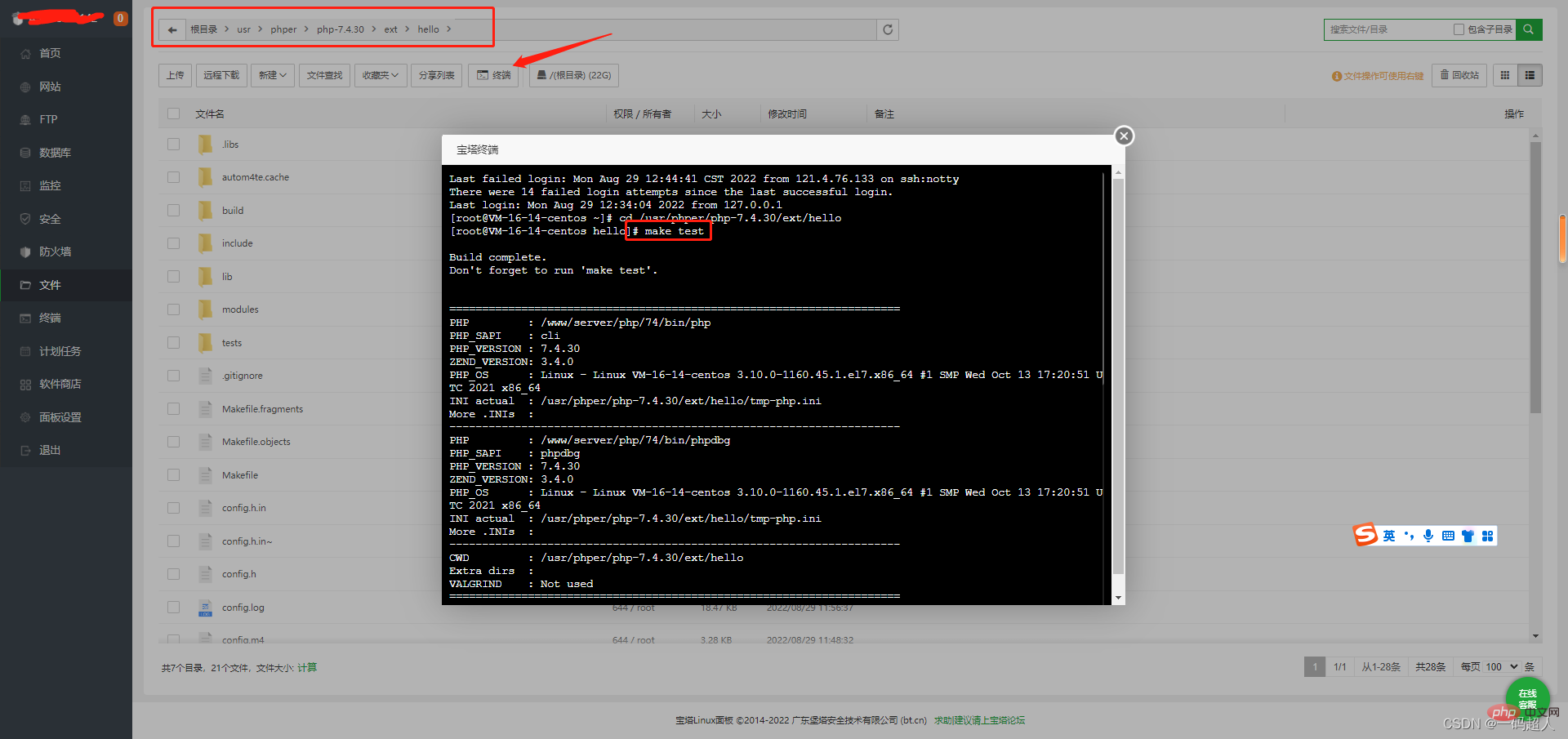
扩展目录下直接输入:
make test
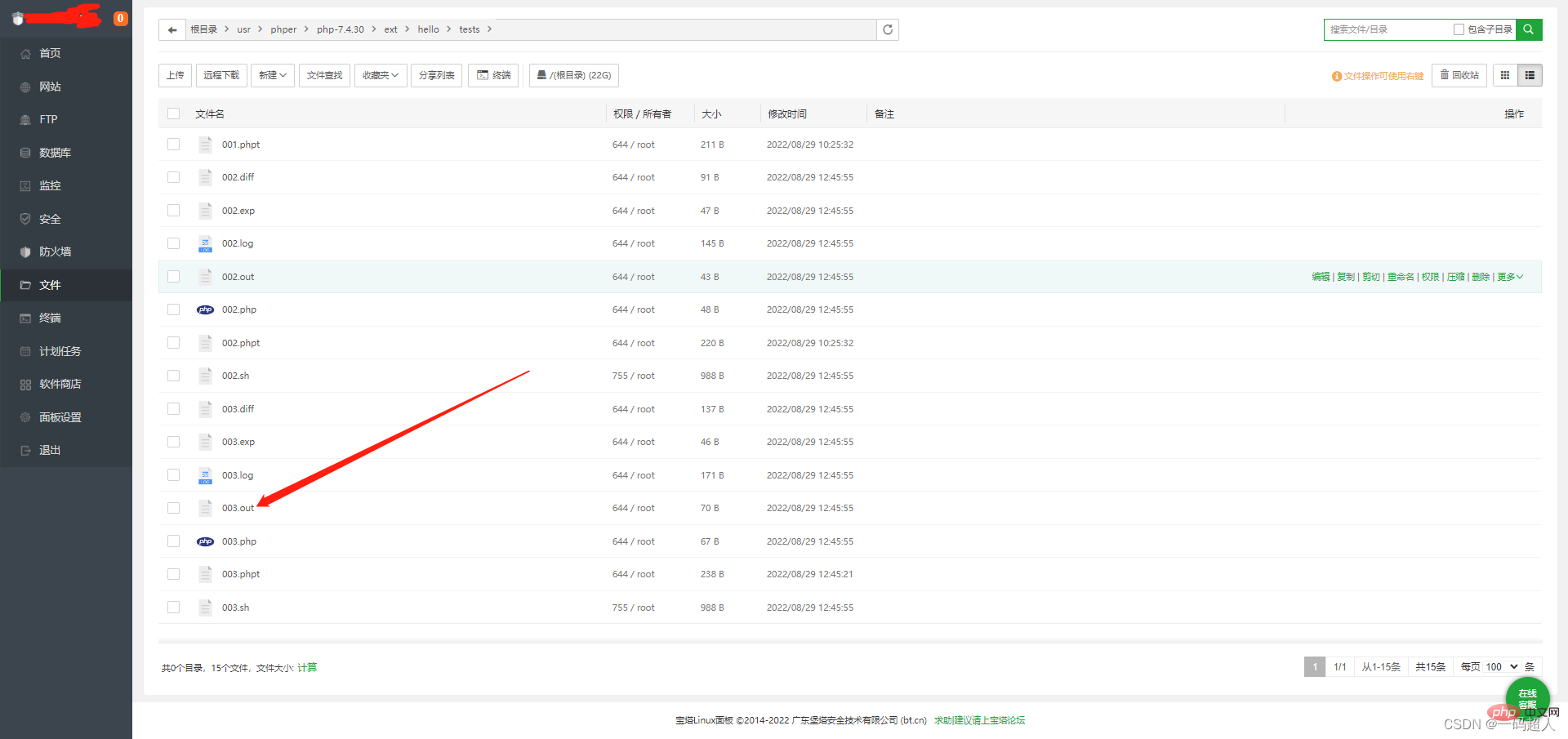
执行后 tests目录下输出了一个.out文件
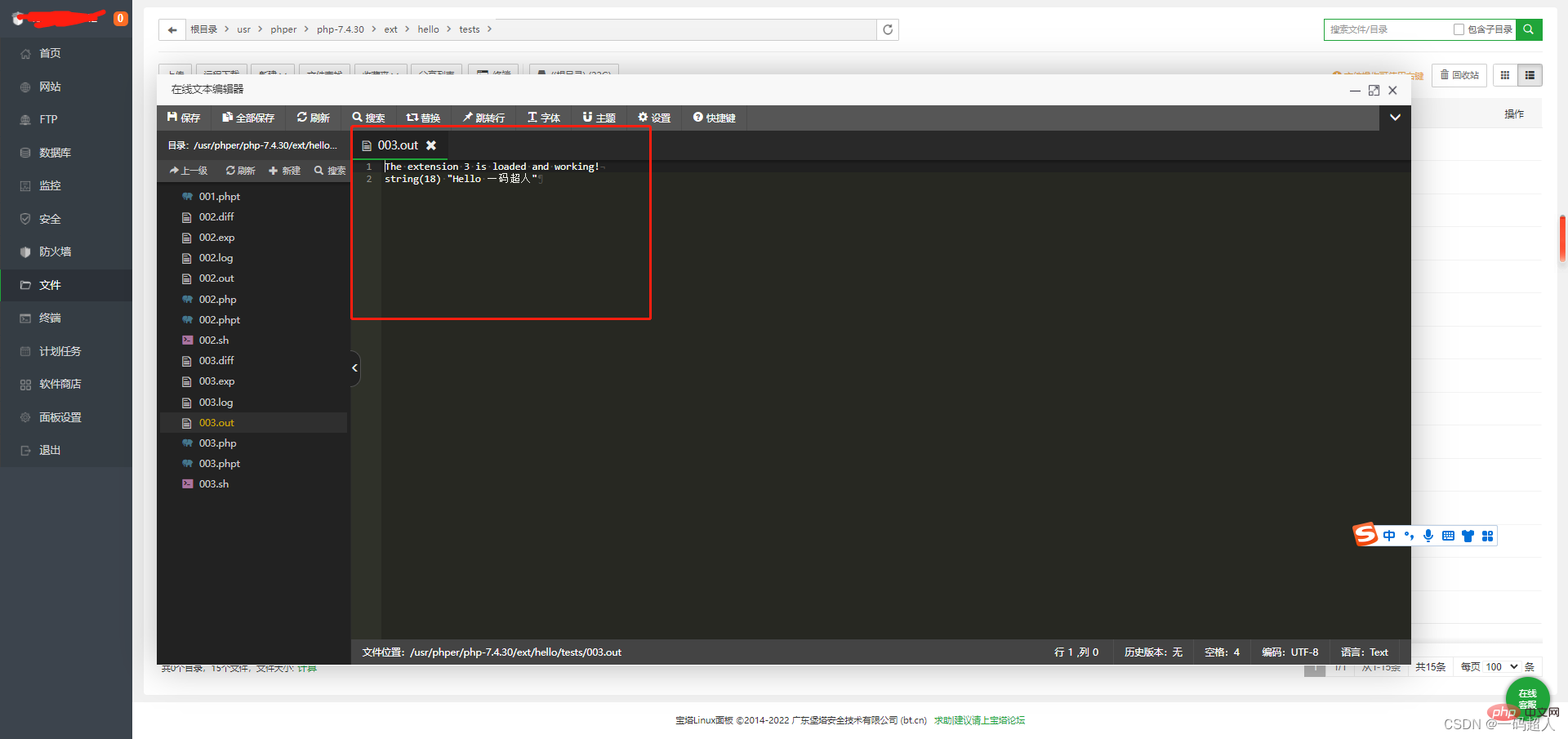
是不是这样更方便了呢?
以上就是整体的开发流程,需要经通过的话还是多少要了解C语言、php扩展骨架、rust精通。
推荐学习:《PHP视频教程》
The above is the detailed content of An article explaining in detail how to develop PHP extensions in Rust (Liunx version). For more information, please follow other related articles on the PHP Chinese website!

Hot AI Tools

Undresser.AI Undress
AI-powered app for creating realistic nude photos

AI Clothes Remover
Online AI tool for removing clothes from photos.

Undress AI Tool
Undress images for free

Clothoff.io
AI clothes remover

AI Hentai Generator
Generate AI Hentai for free.

Hot Article

Hot Tools

Notepad++7.3.1
Easy-to-use and free code editor

SublimeText3 Chinese version
Chinese version, very easy to use

Zend Studio 13.0.1
Powerful PHP integrated development environment

Dreamweaver CS6
Visual web development tools

SublimeText3 Mac version
God-level code editing software (SublimeText3)

Hot Topics
 1382
1382
 52
52
 PHP 8.4 Installation and Upgrade guide for Ubuntu and Debian
Dec 24, 2024 pm 04:42 PM
PHP 8.4 Installation and Upgrade guide for Ubuntu and Debian
Dec 24, 2024 pm 04:42 PM
PHP 8.4 brings several new features, security improvements, and performance improvements with healthy amounts of feature deprecations and removals. This guide explains how to install PHP 8.4 or upgrade to PHP 8.4 on Ubuntu, Debian, or their derivati
 How To Set Up Visual Studio Code (VS Code) for PHP Development
Dec 20, 2024 am 11:31 AM
How To Set Up Visual Studio Code (VS Code) for PHP Development
Dec 20, 2024 am 11:31 AM
Visual Studio Code, also known as VS Code, is a free source code editor — or integrated development environment (IDE) — available for all major operating systems. With a large collection of extensions for many programming languages, VS Code can be c
 7 PHP Functions I Regret I Didn't Know Before
Nov 13, 2024 am 09:42 AM
7 PHP Functions I Regret I Didn't Know Before
Nov 13, 2024 am 09:42 AM
If you are an experienced PHP developer, you might have the feeling that you’ve been there and done that already.You have developed a significant number of applications, debugged millions of lines of code, and tweaked a bunch of scripts to achieve op
 How do you parse and process HTML/XML in PHP?
Feb 07, 2025 am 11:57 AM
How do you parse and process HTML/XML in PHP?
Feb 07, 2025 am 11:57 AM
This tutorial demonstrates how to efficiently process XML documents using PHP. XML (eXtensible Markup Language) is a versatile text-based markup language designed for both human readability and machine parsing. It's commonly used for data storage an
 Explain JSON Web Tokens (JWT) and their use case in PHP APIs.
Apr 05, 2025 am 12:04 AM
Explain JSON Web Tokens (JWT) and their use case in PHP APIs.
Apr 05, 2025 am 12:04 AM
JWT is an open standard based on JSON, used to securely transmit information between parties, mainly for identity authentication and information exchange. 1. JWT consists of three parts: Header, Payload and Signature. 2. The working principle of JWT includes three steps: generating JWT, verifying JWT and parsing Payload. 3. When using JWT for authentication in PHP, JWT can be generated and verified, and user role and permission information can be included in advanced usage. 4. Common errors include signature verification failure, token expiration, and payload oversized. Debugging skills include using debugging tools and logging. 5. Performance optimization and best practices include using appropriate signature algorithms, setting validity periods reasonably,
 PHP Program to Count Vowels in a String
Feb 07, 2025 pm 12:12 PM
PHP Program to Count Vowels in a String
Feb 07, 2025 pm 12:12 PM
A string is a sequence of characters, including letters, numbers, and symbols. This tutorial will learn how to calculate the number of vowels in a given string in PHP using different methods. The vowels in English are a, e, i, o, u, and they can be uppercase or lowercase. What is a vowel? Vowels are alphabetic characters that represent a specific pronunciation. There are five vowels in English, including uppercase and lowercase: a, e, i, o, u Example 1 Input: String = "Tutorialspoint" Output: 6 explain The vowels in the string "Tutorialspoint" are u, o, i, a, o, i. There are 6 yuan in total
 Explain late static binding in PHP (static::).
Apr 03, 2025 am 12:04 AM
Explain late static binding in PHP (static::).
Apr 03, 2025 am 12:04 AM
Static binding (static::) implements late static binding (LSB) in PHP, allowing calling classes to be referenced in static contexts rather than defining classes. 1) The parsing process is performed at runtime, 2) Look up the call class in the inheritance relationship, 3) It may bring performance overhead.
 What are PHP magic methods (__construct, __destruct, __call, __get, __set, etc.) and provide use cases?
Apr 03, 2025 am 12:03 AM
What are PHP magic methods (__construct, __destruct, __call, __get, __set, etc.) and provide use cases?
Apr 03, 2025 am 12:03 AM
What are the magic methods of PHP? PHP's magic methods include: 1.\_\_construct, used to initialize objects; 2.\_\_destruct, used to clean up resources; 3.\_\_call, handle non-existent method calls; 4.\_\_get, implement dynamic attribute access; 5.\_\_set, implement dynamic attribute settings. These methods are automatically called in certain situations, improving code flexibility and efficiency.



